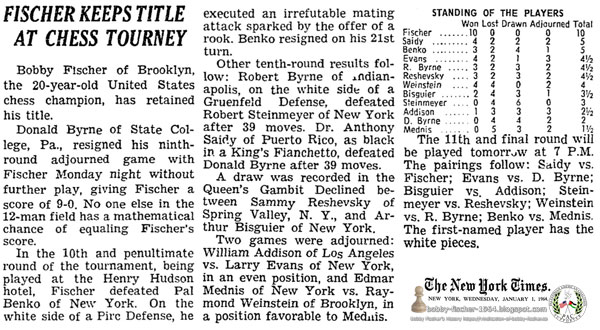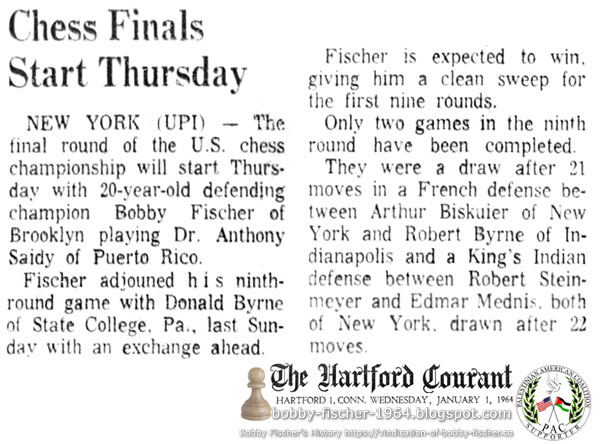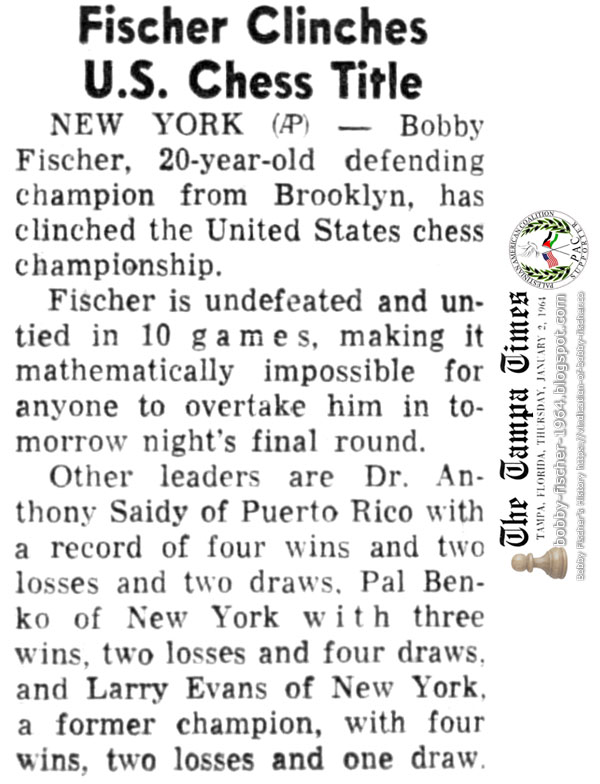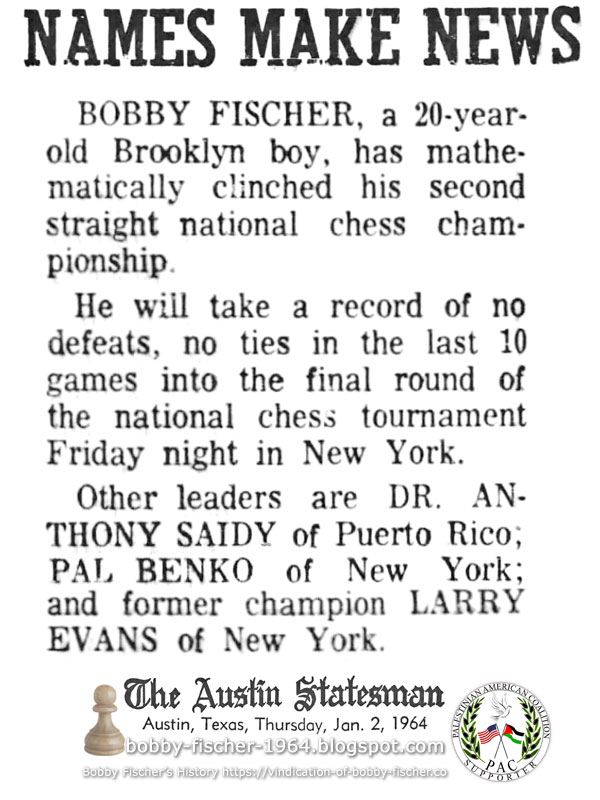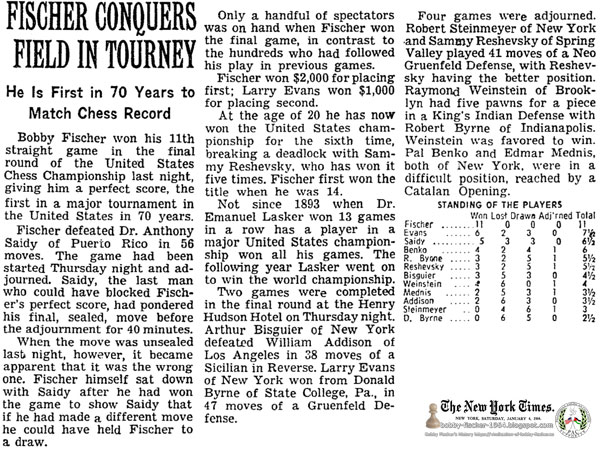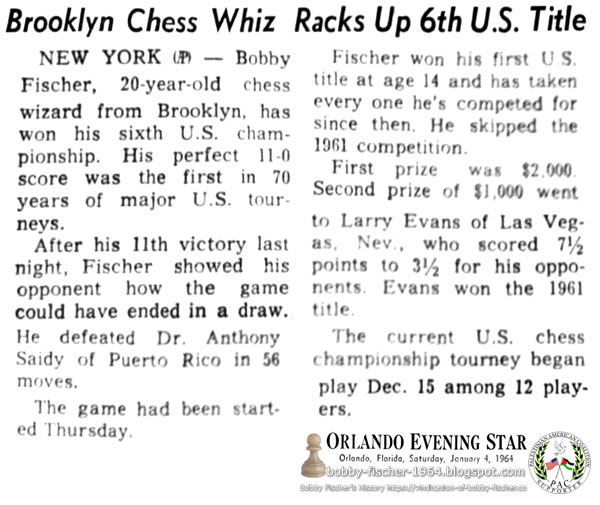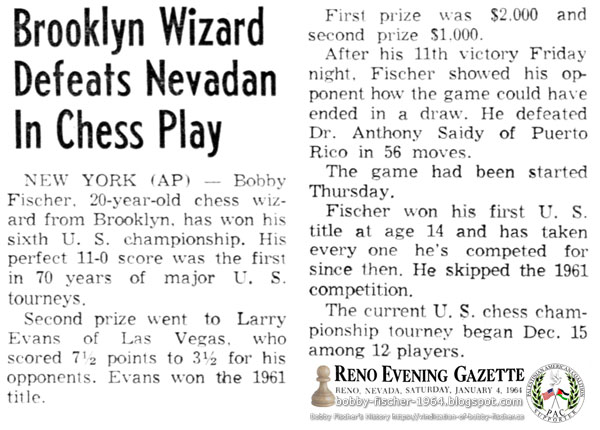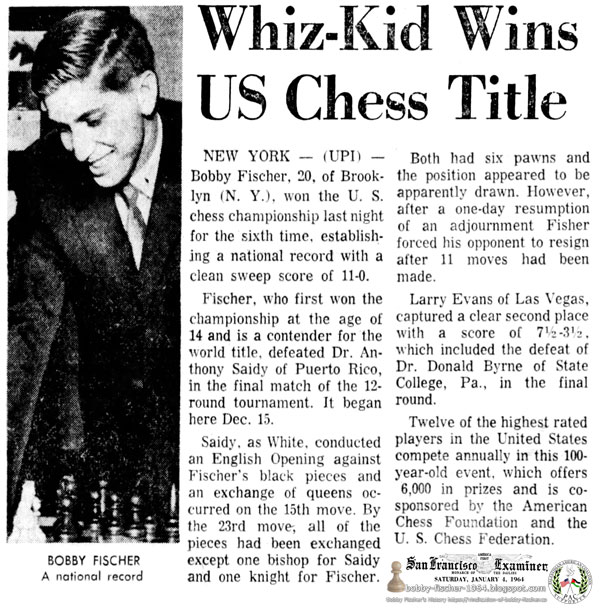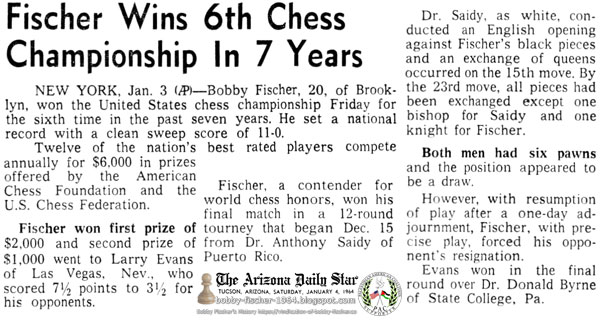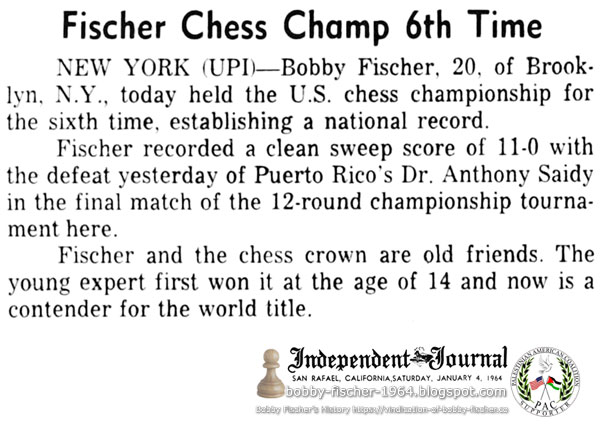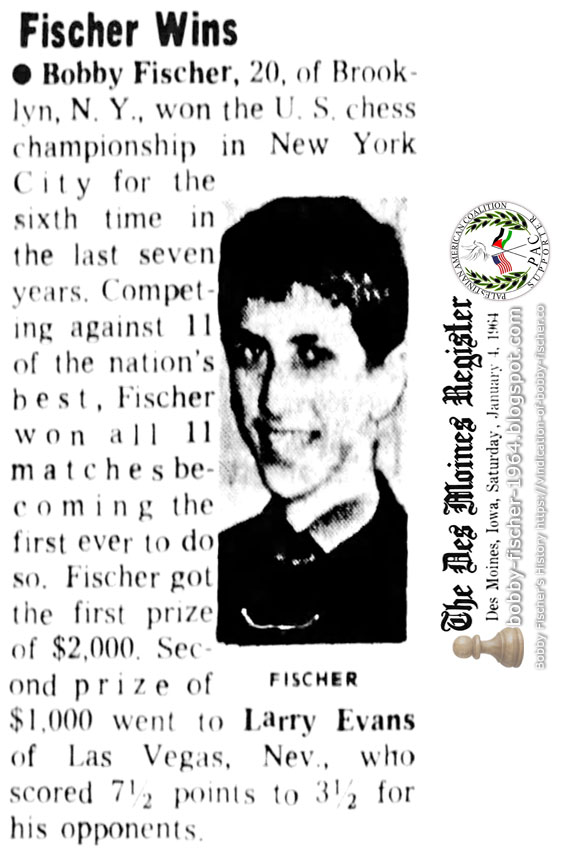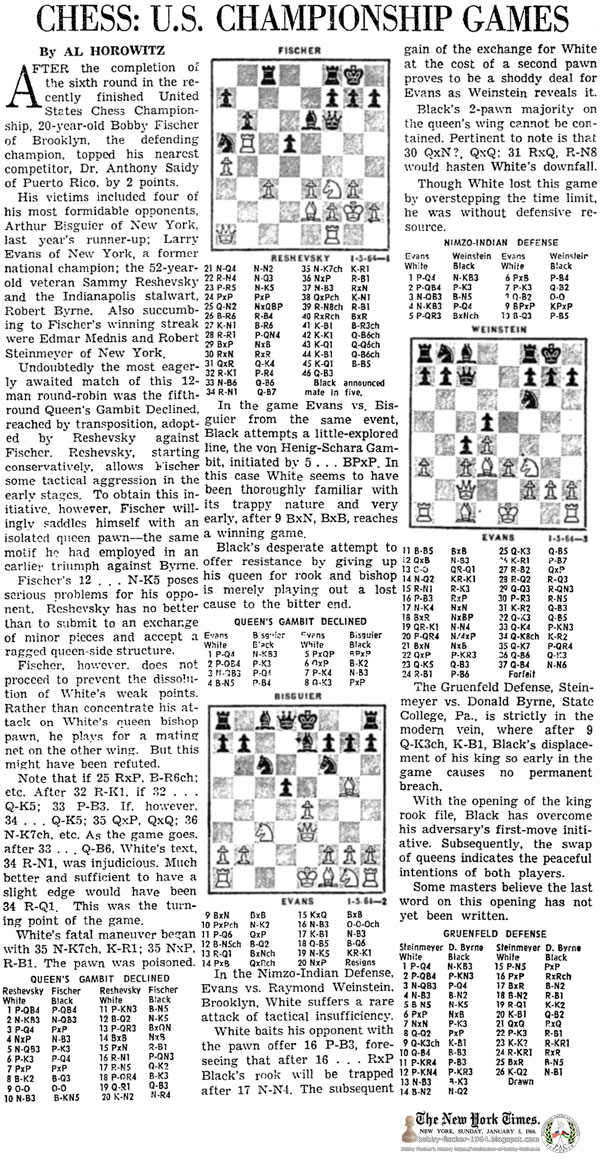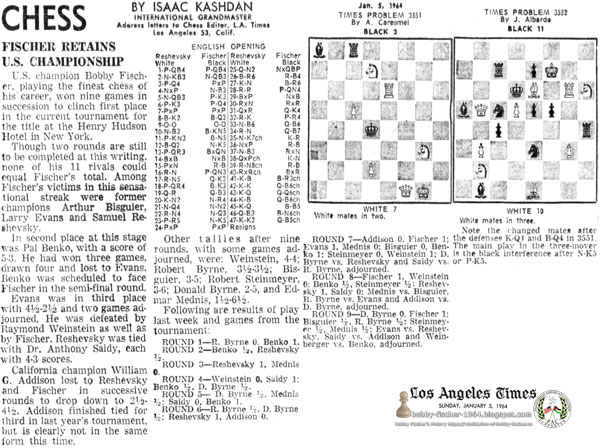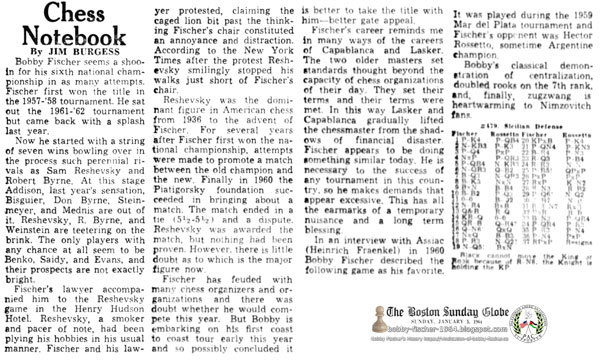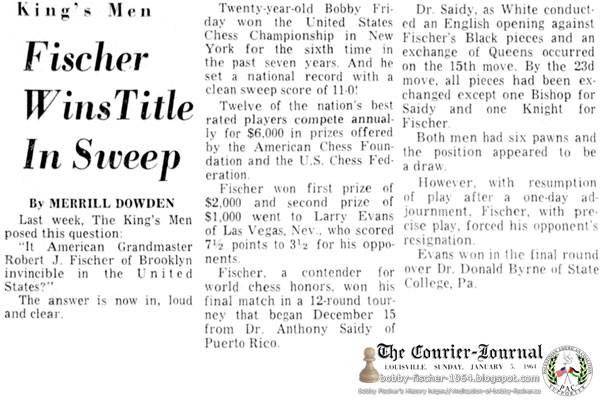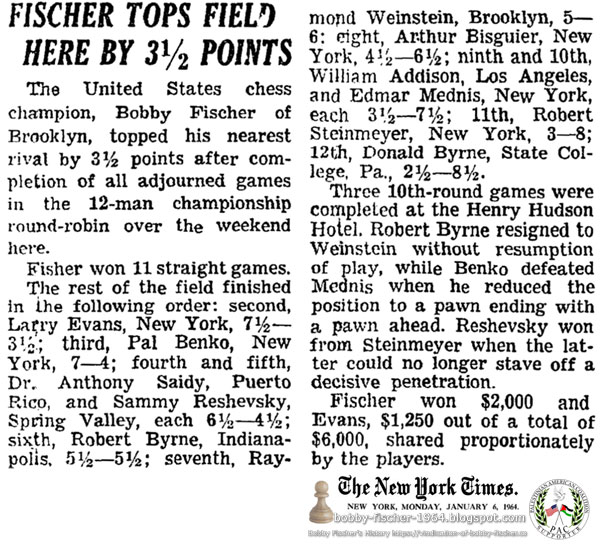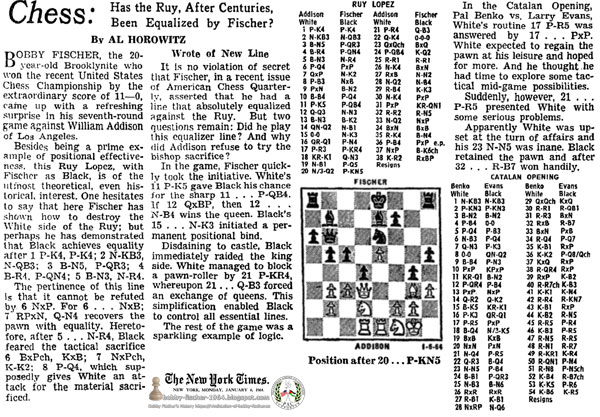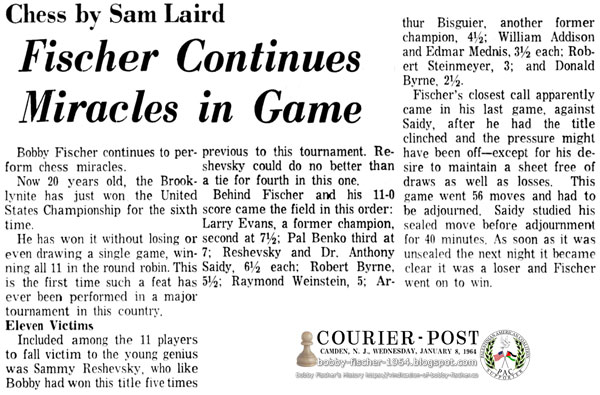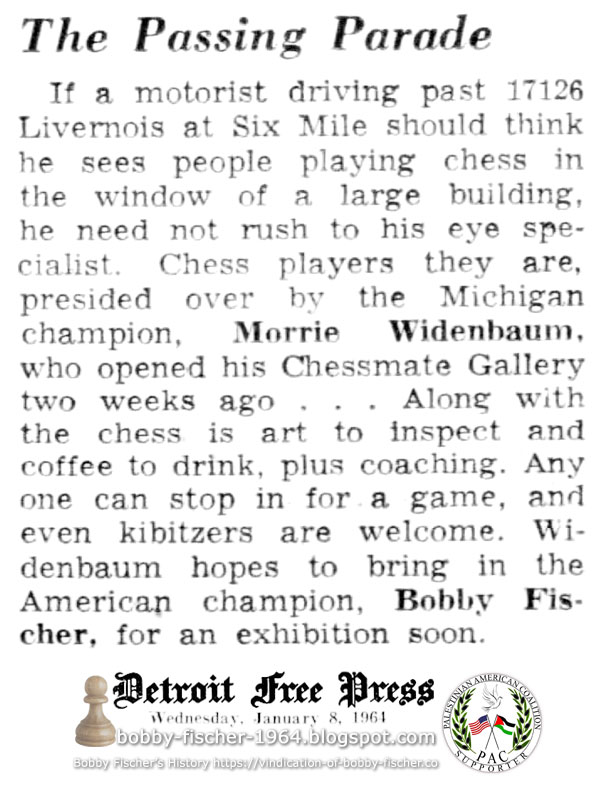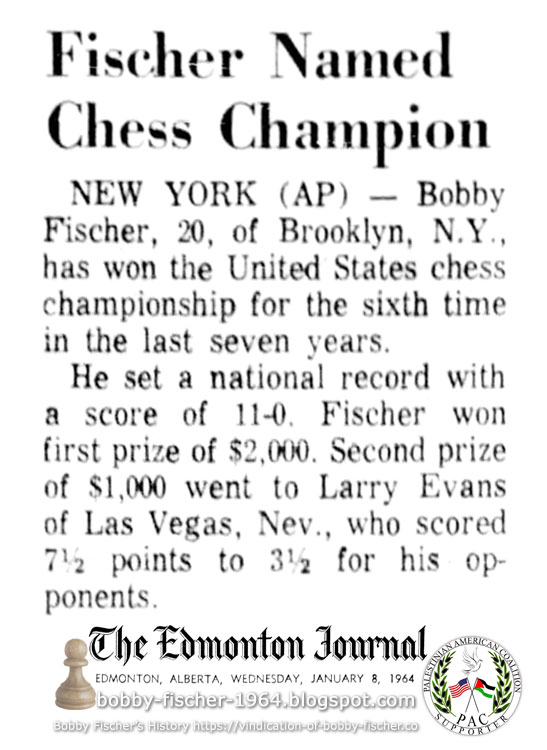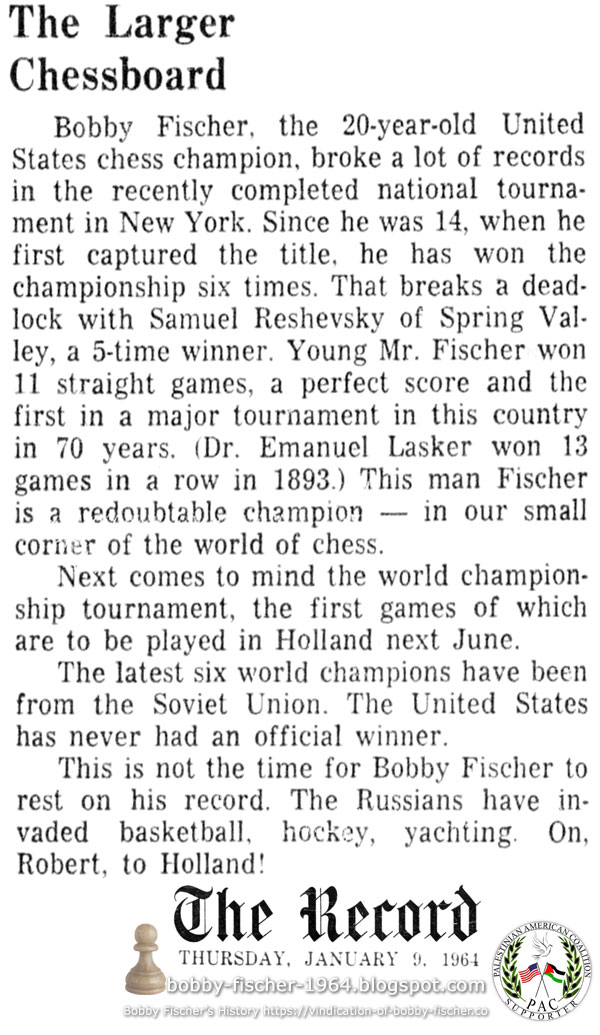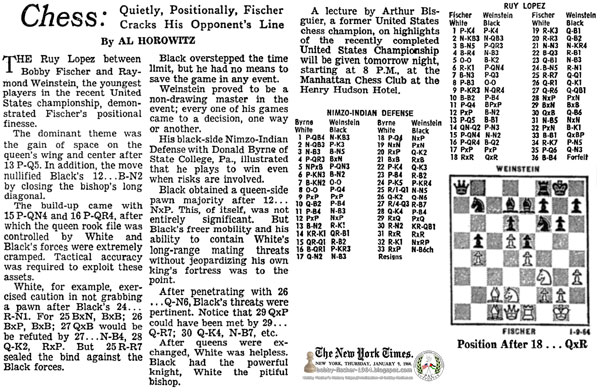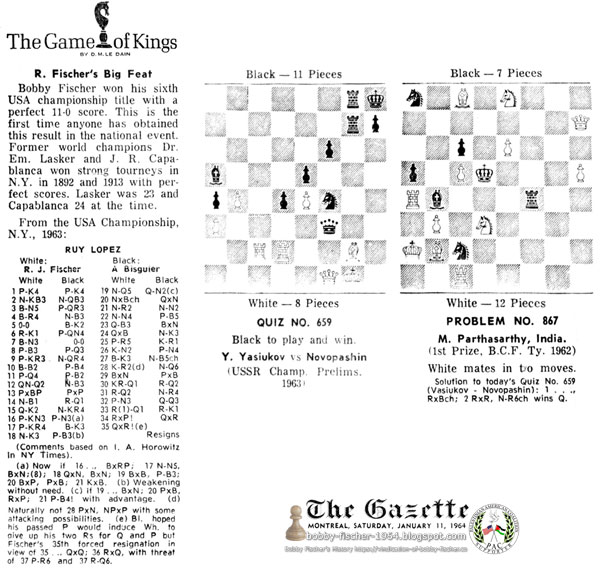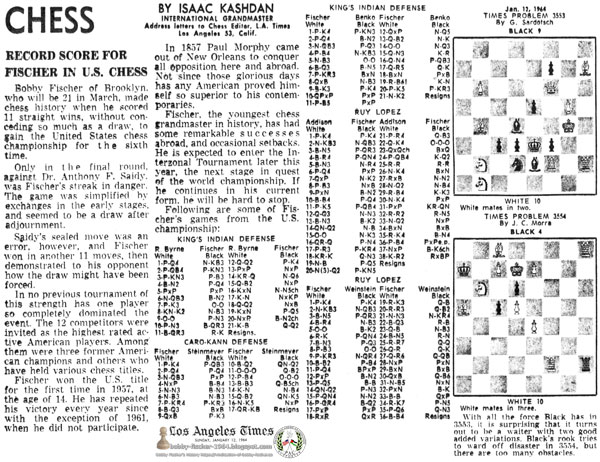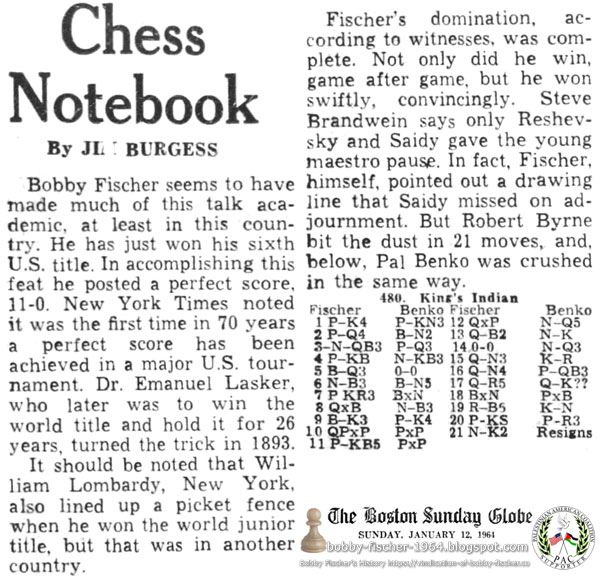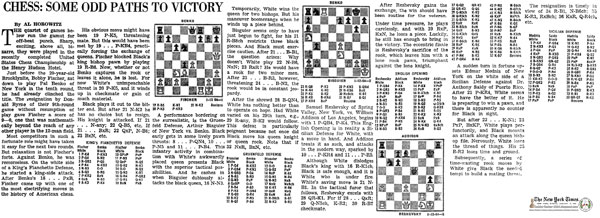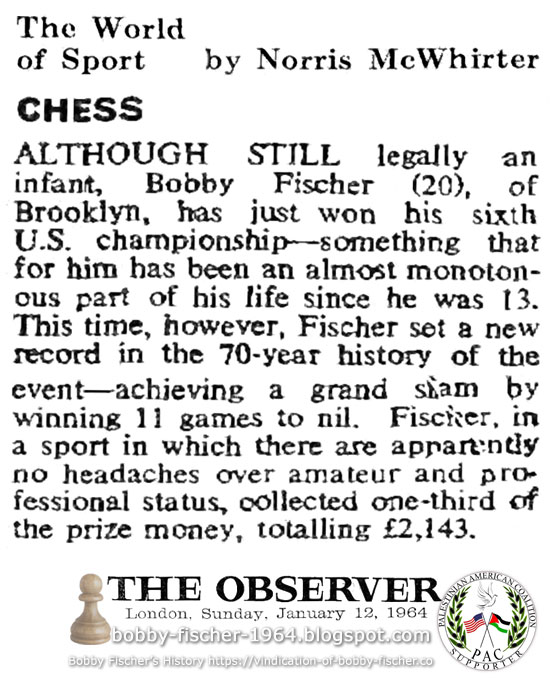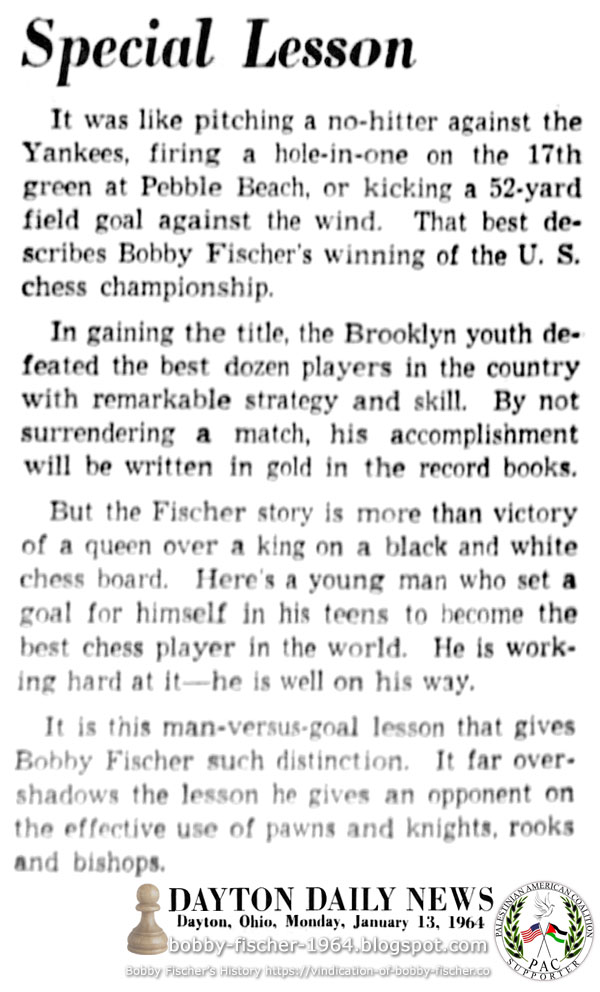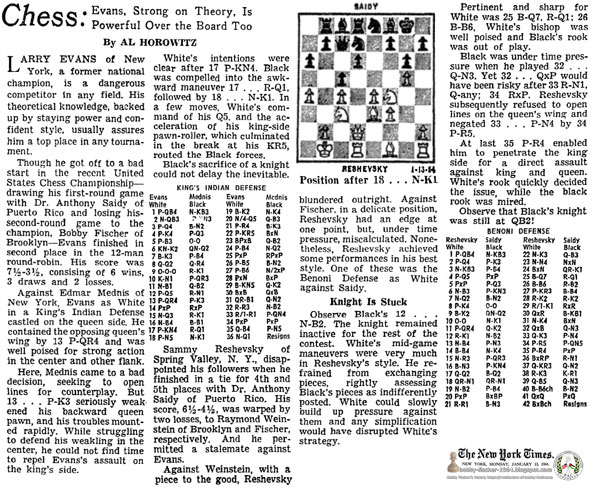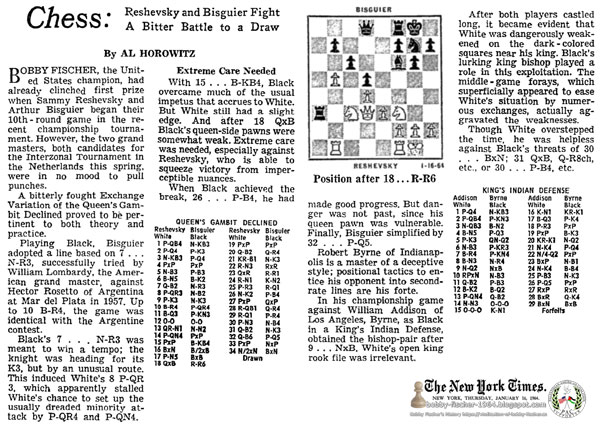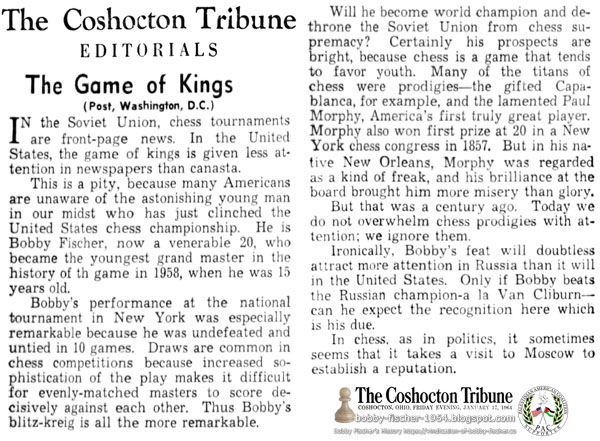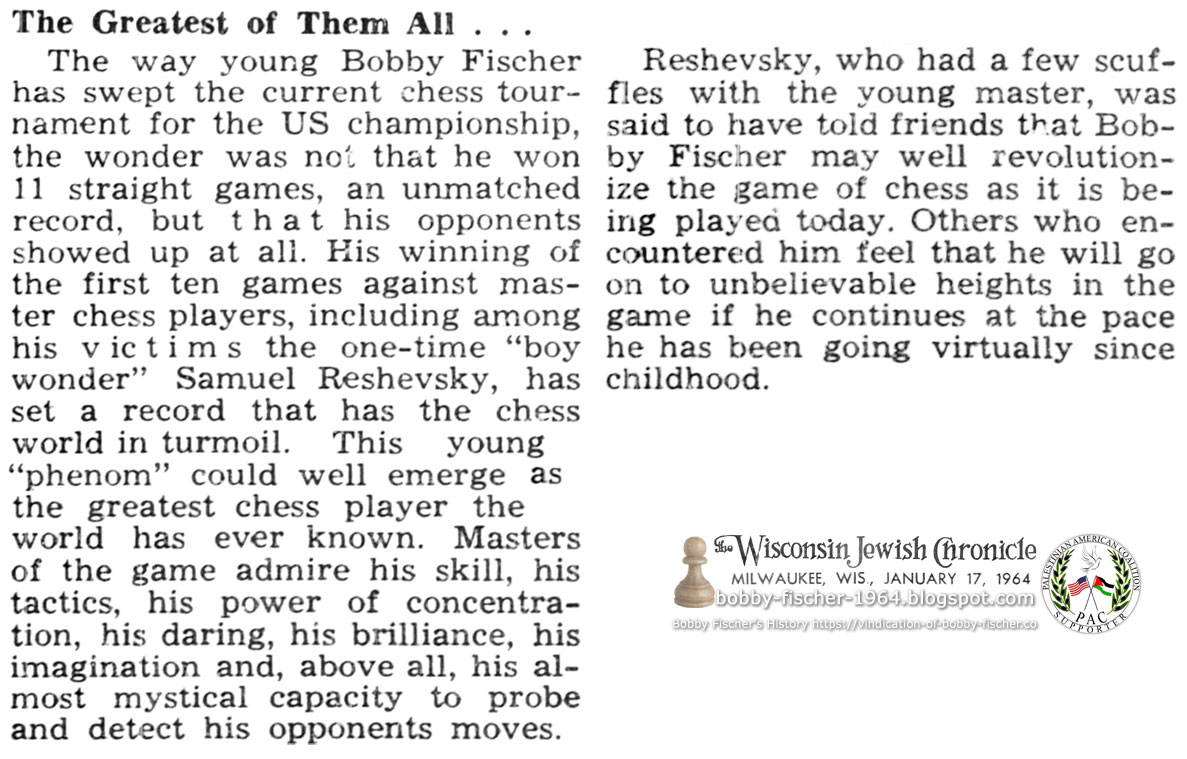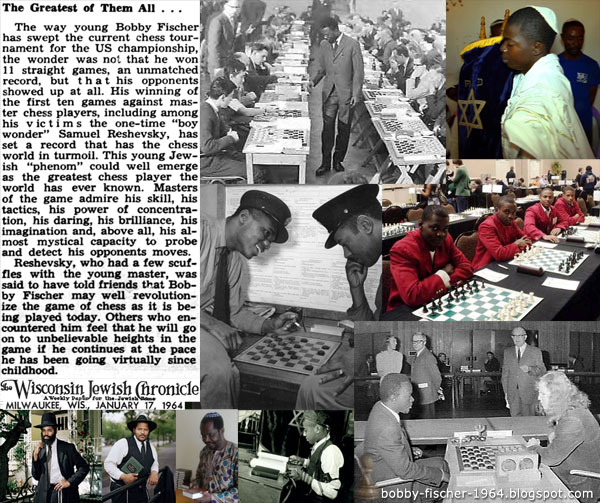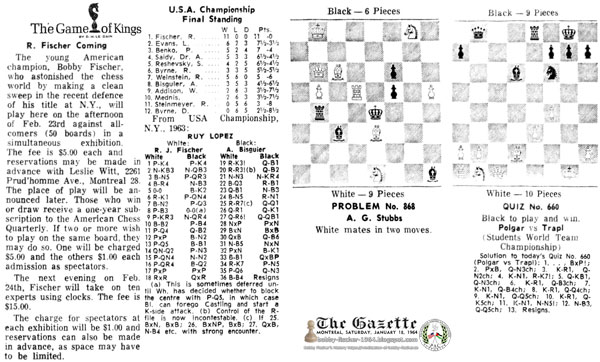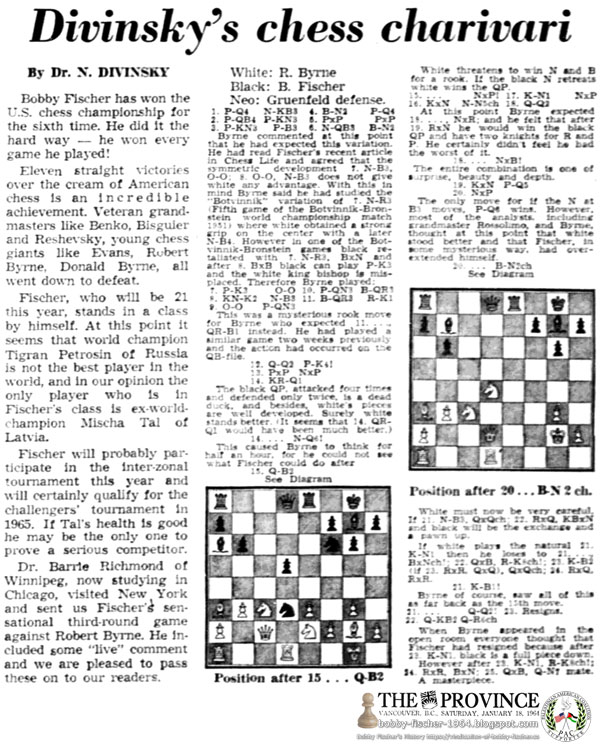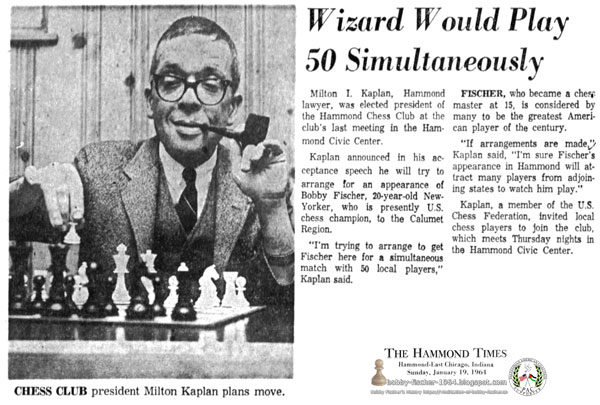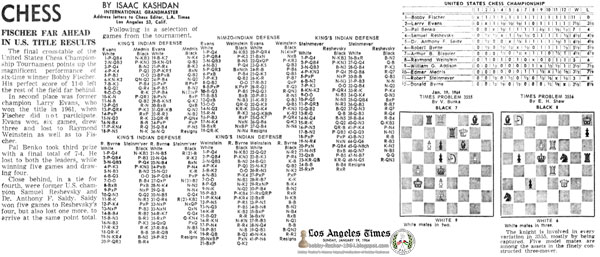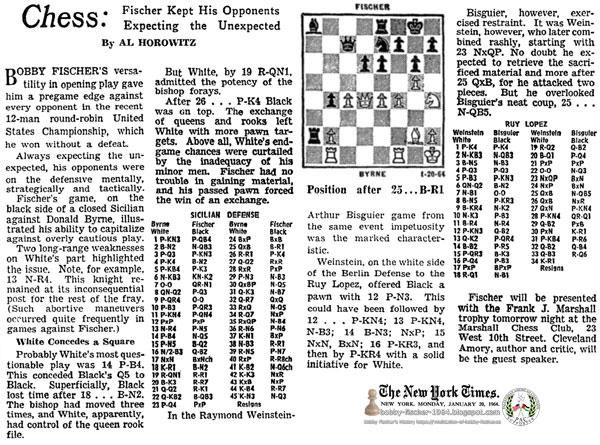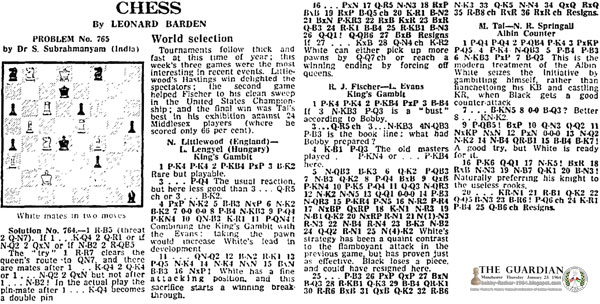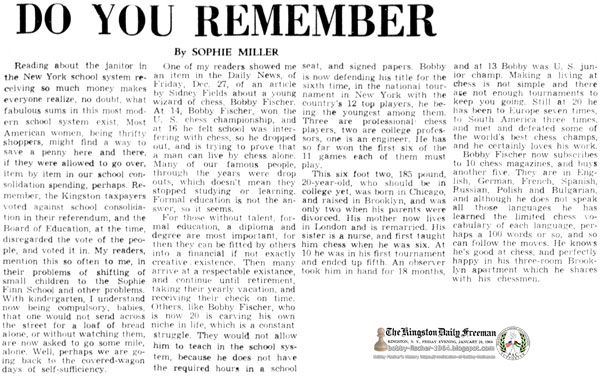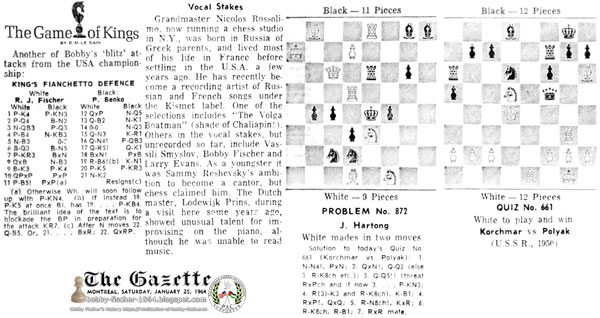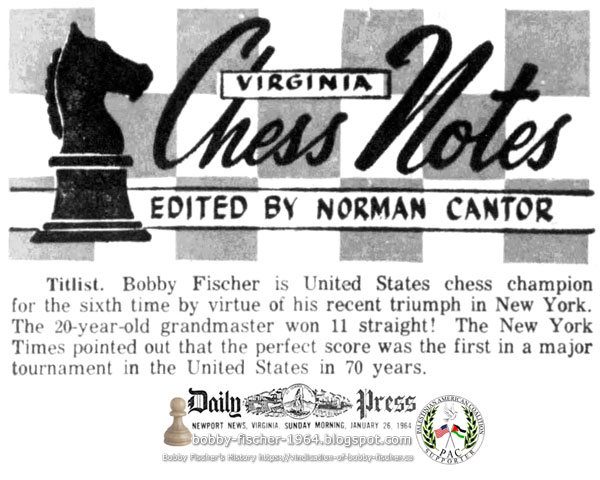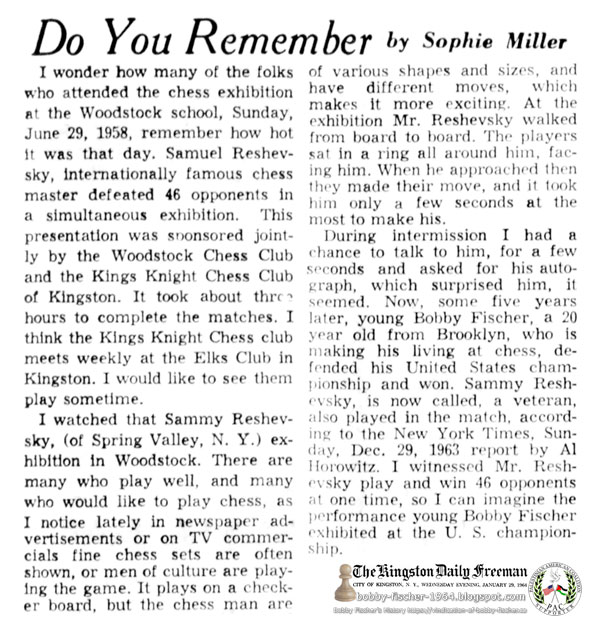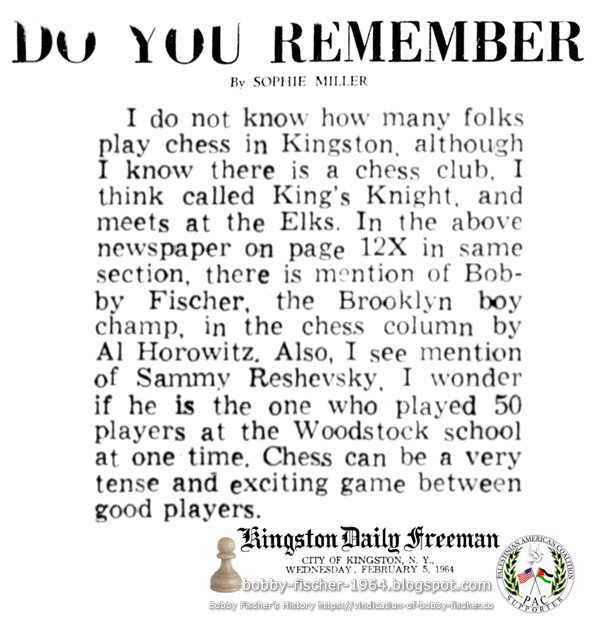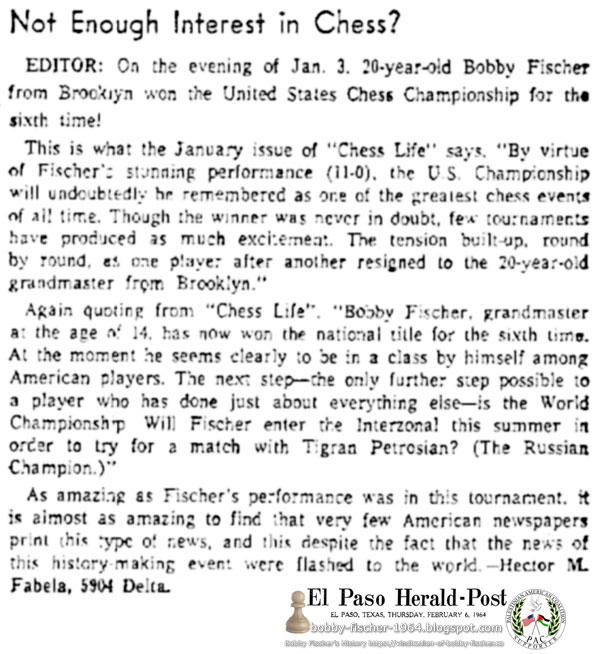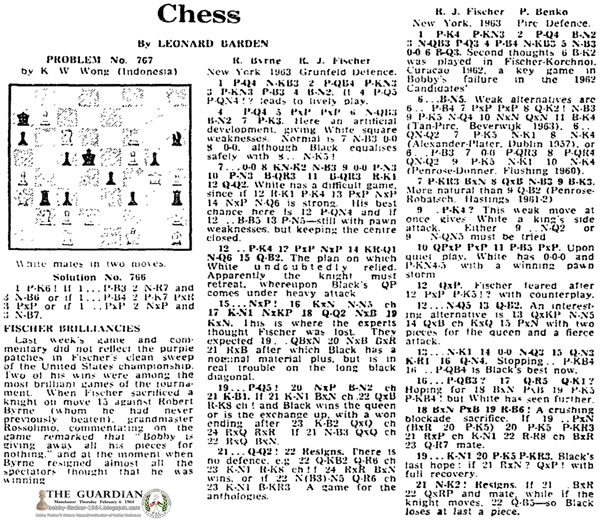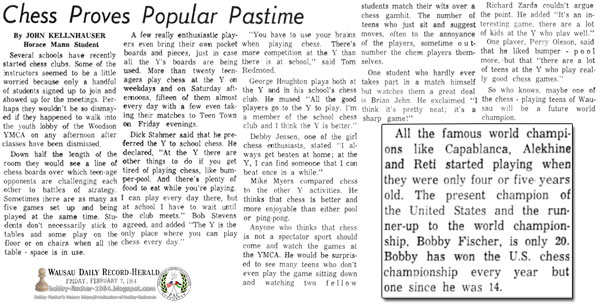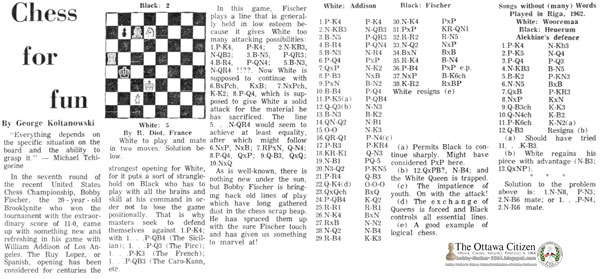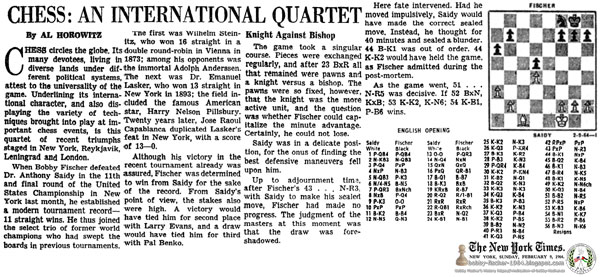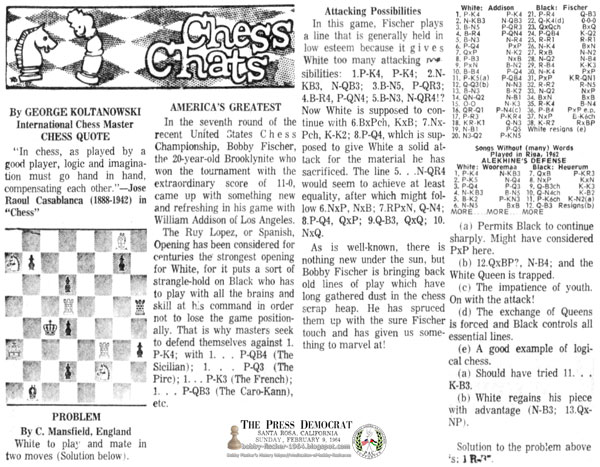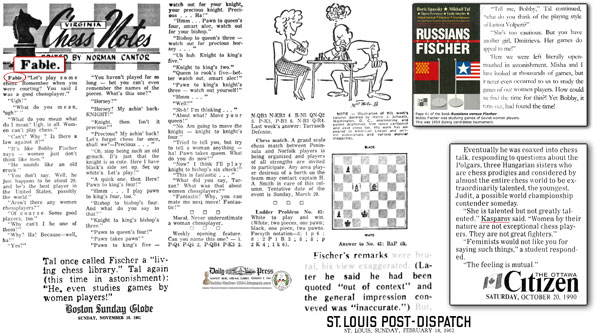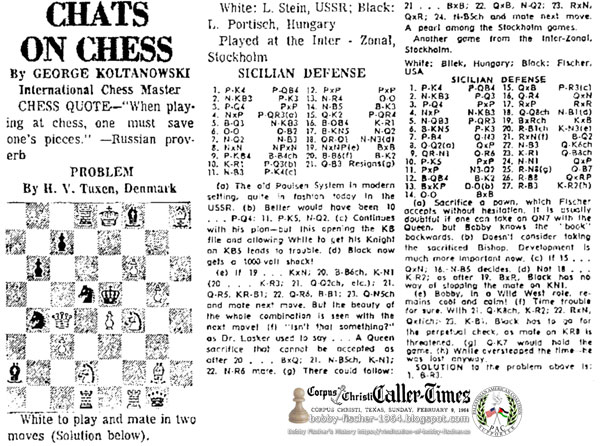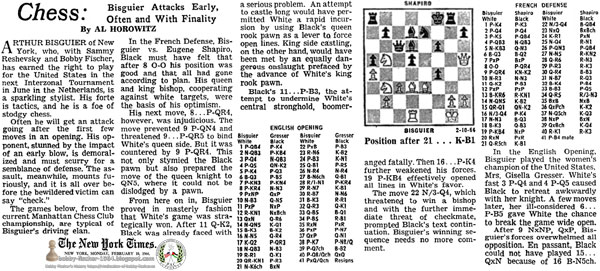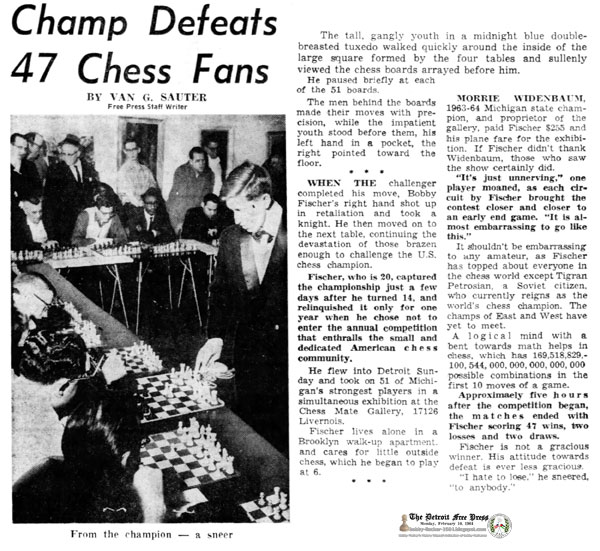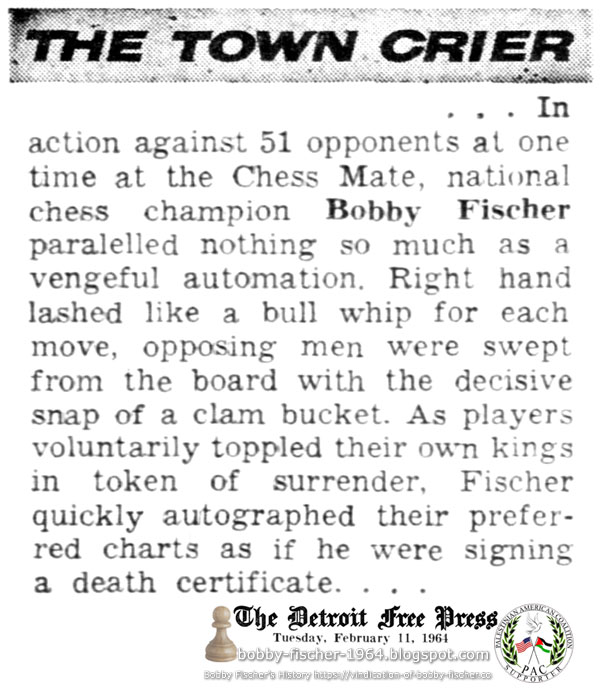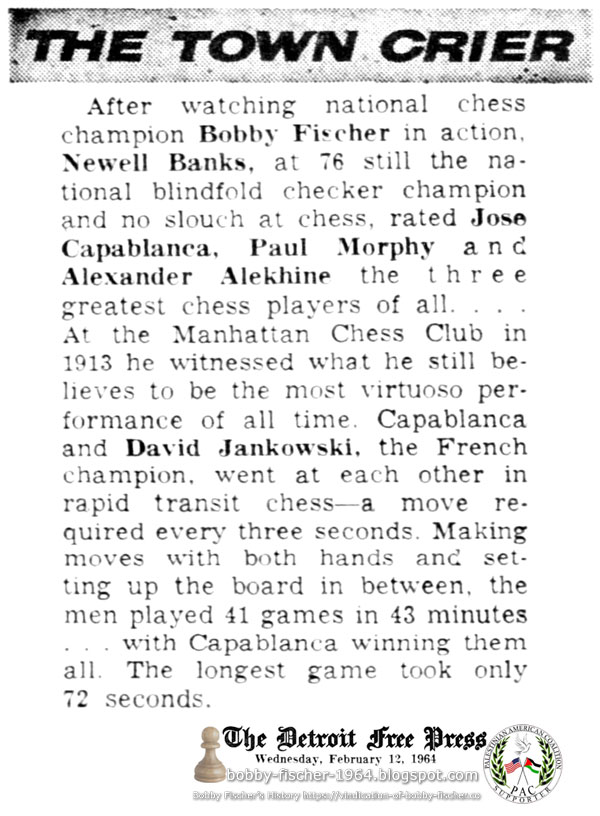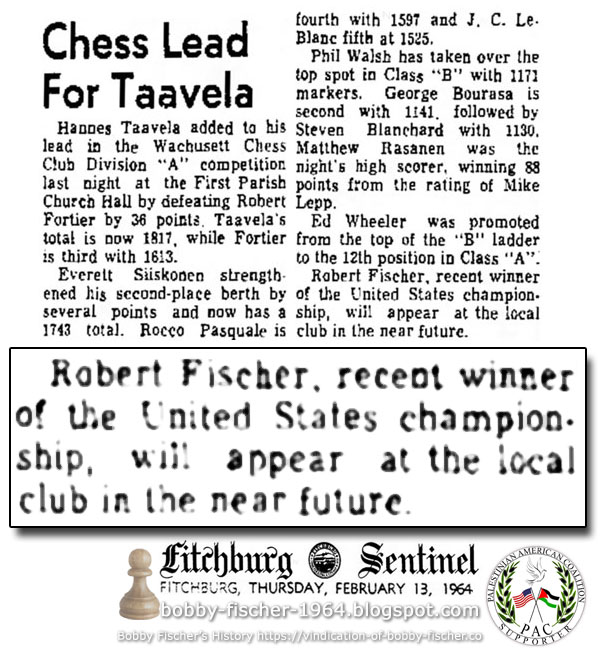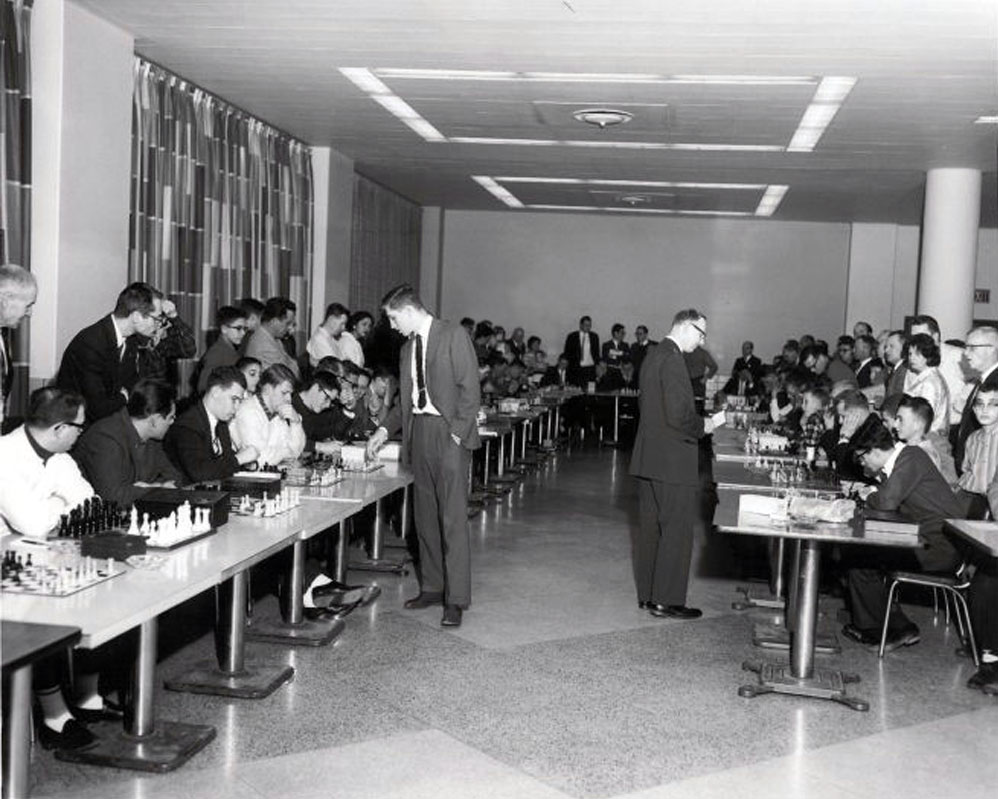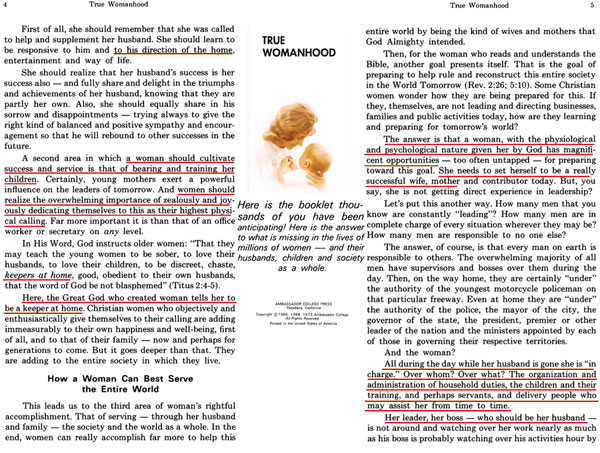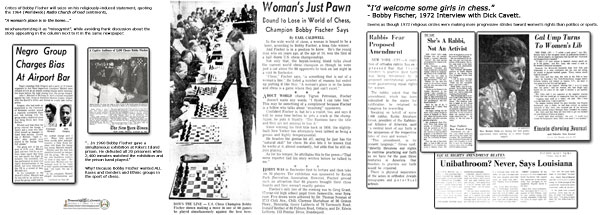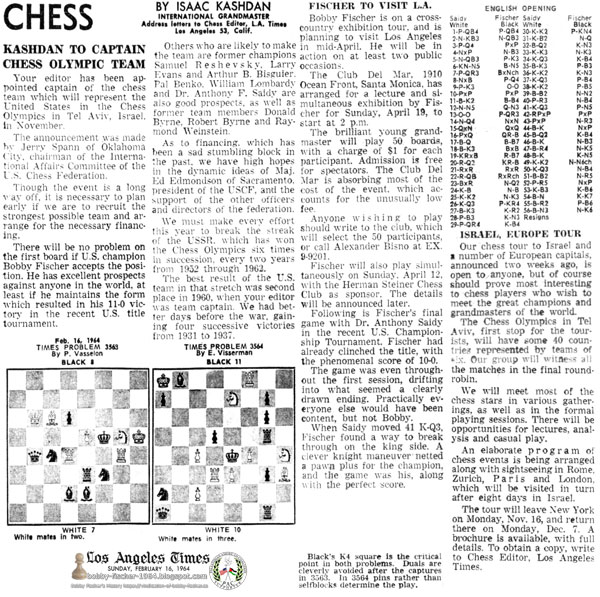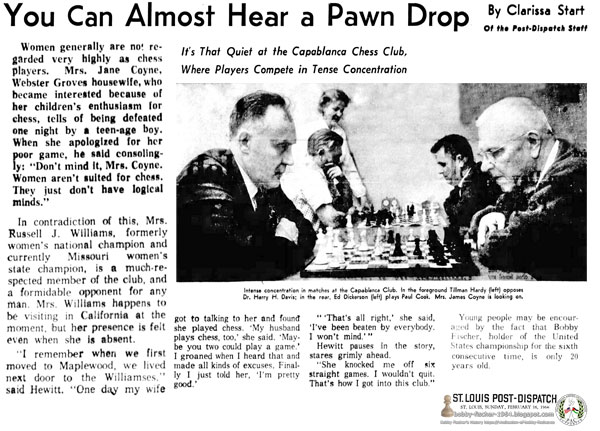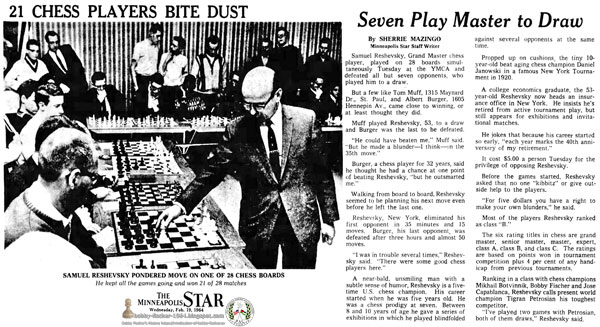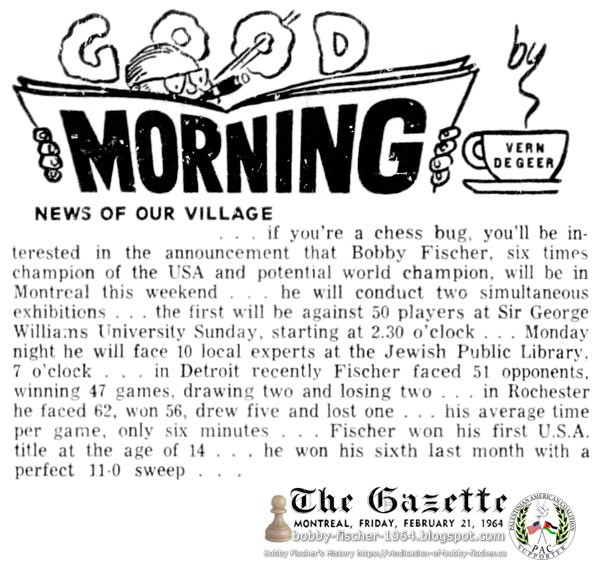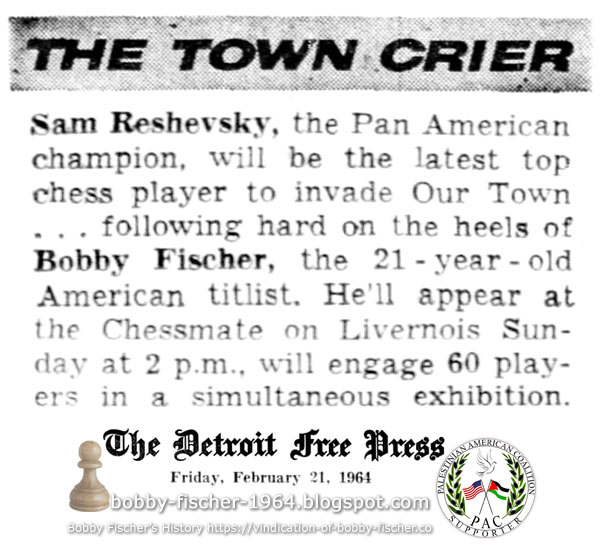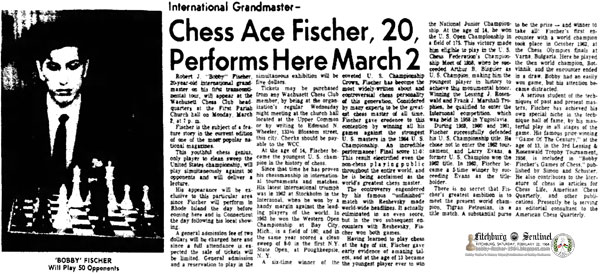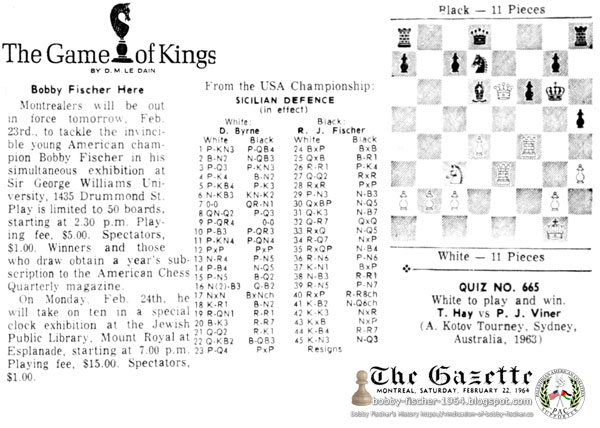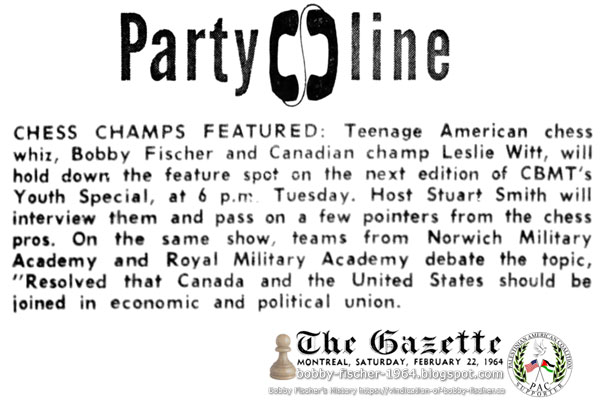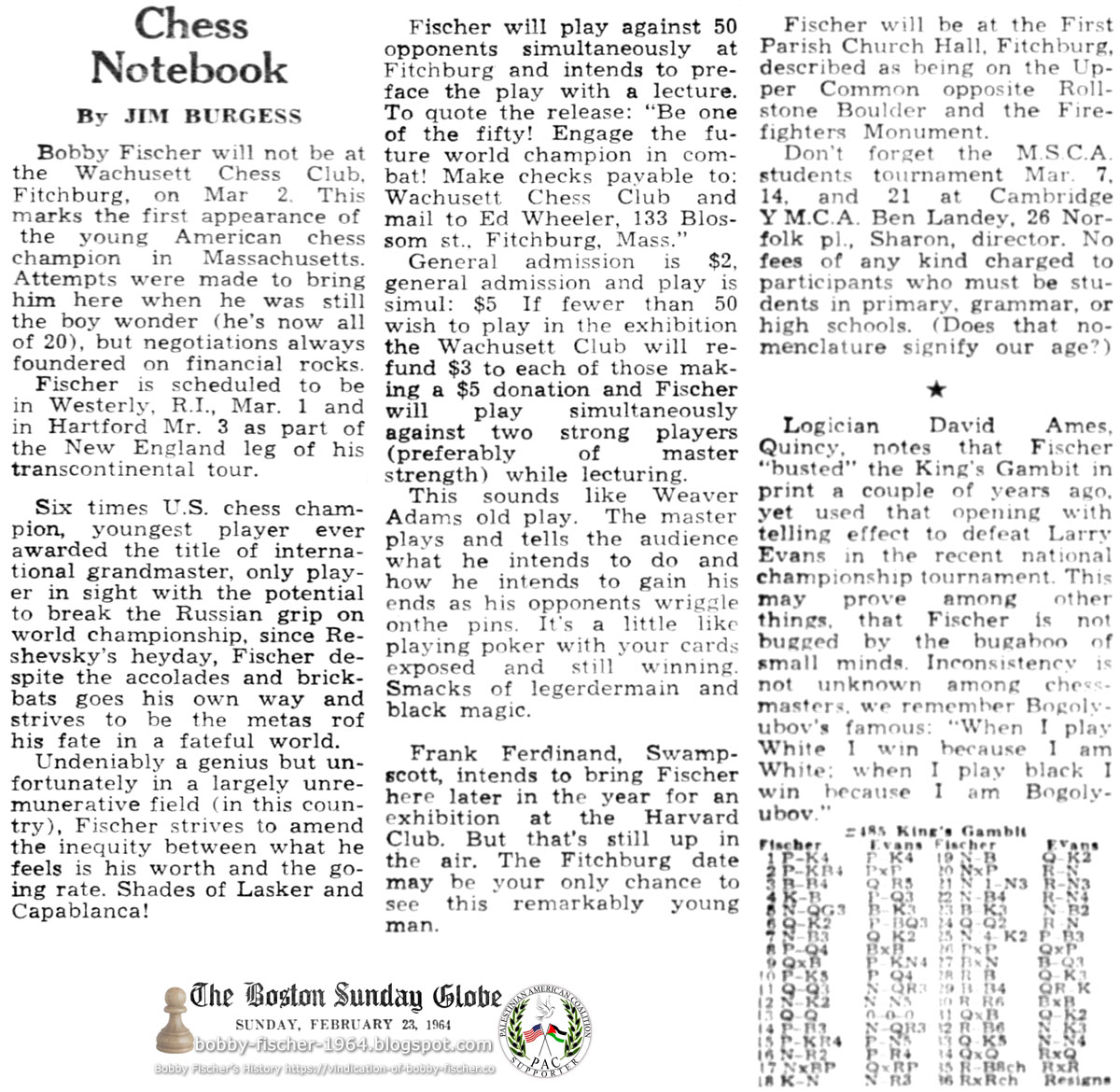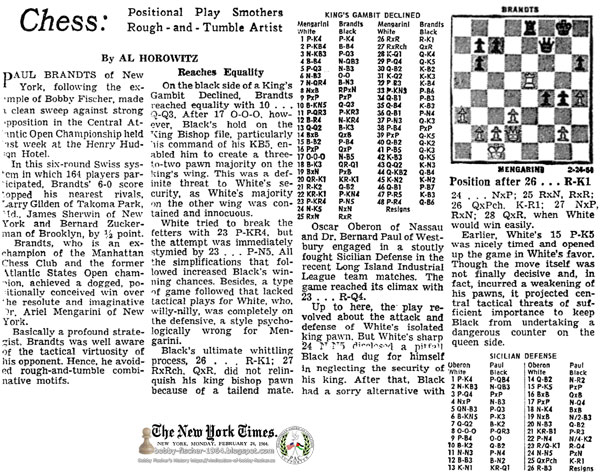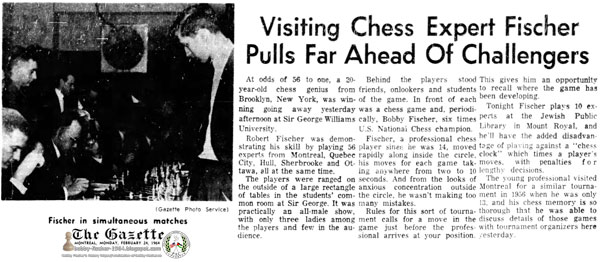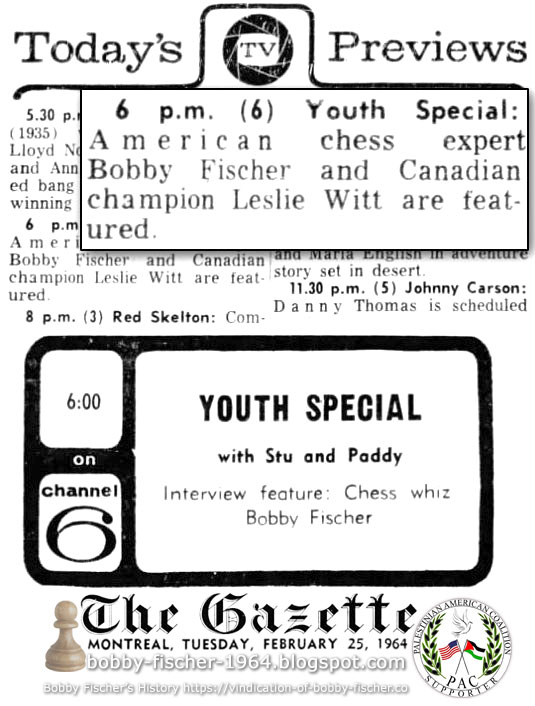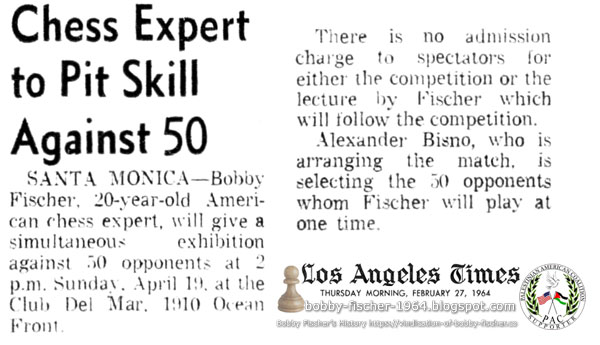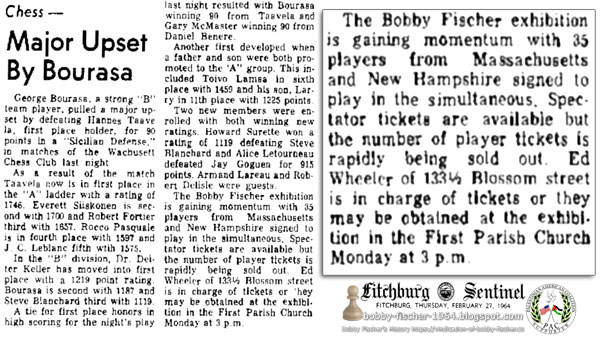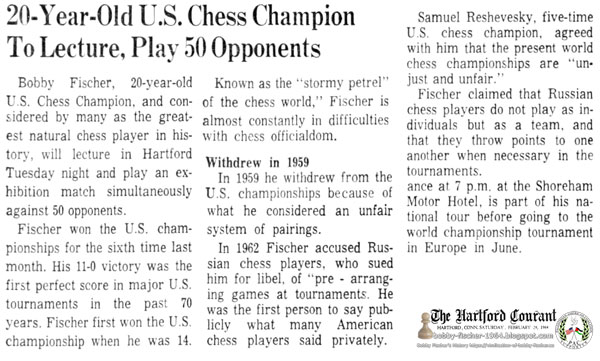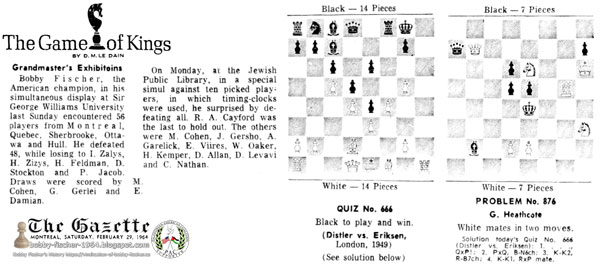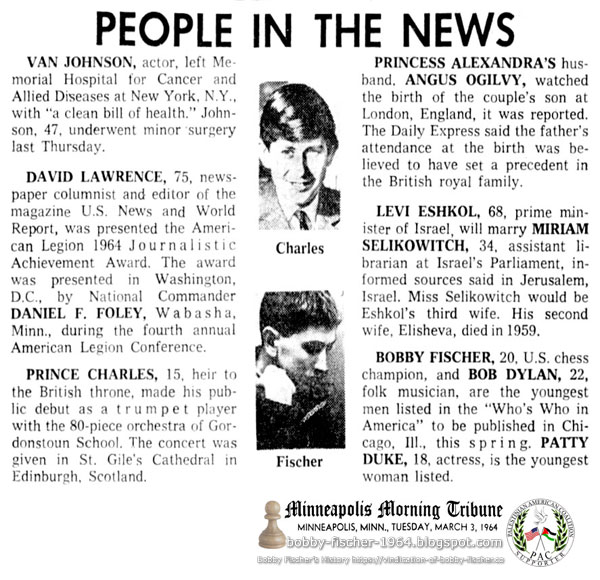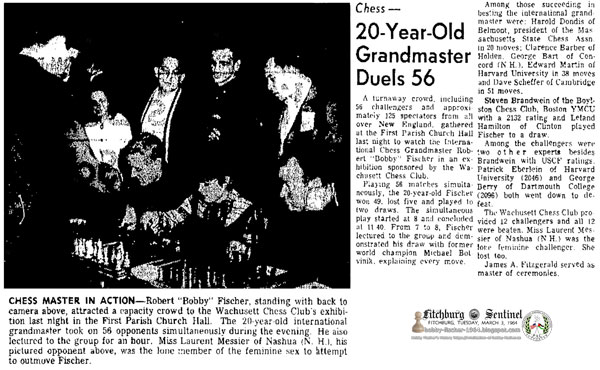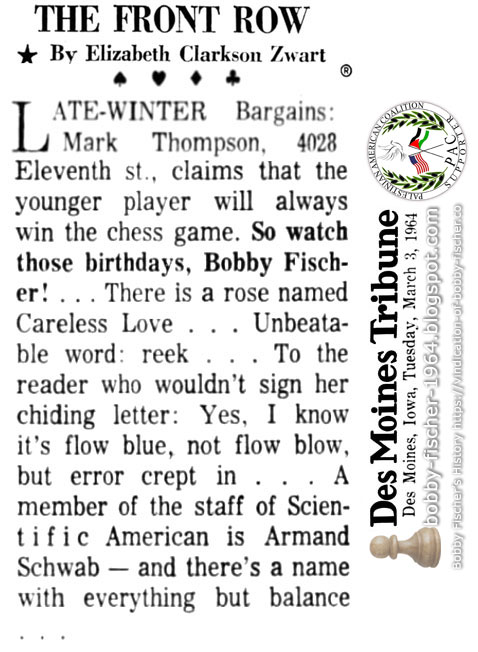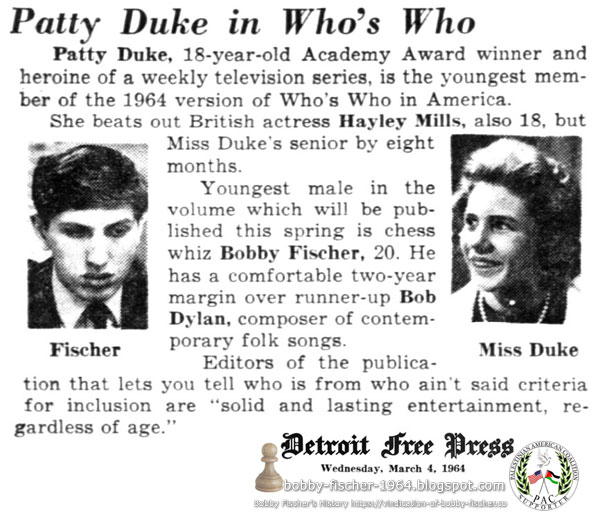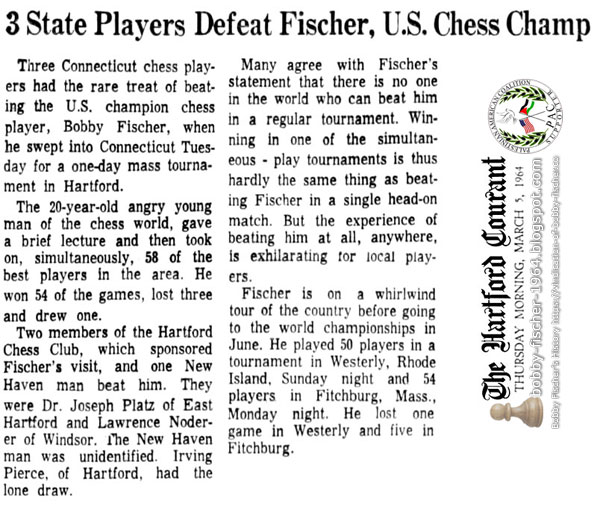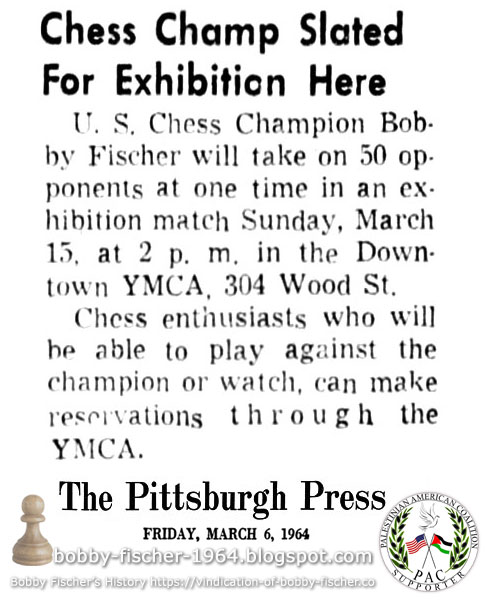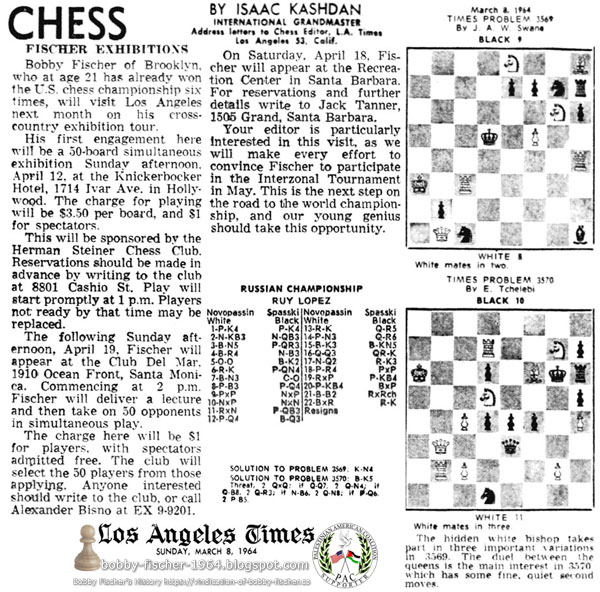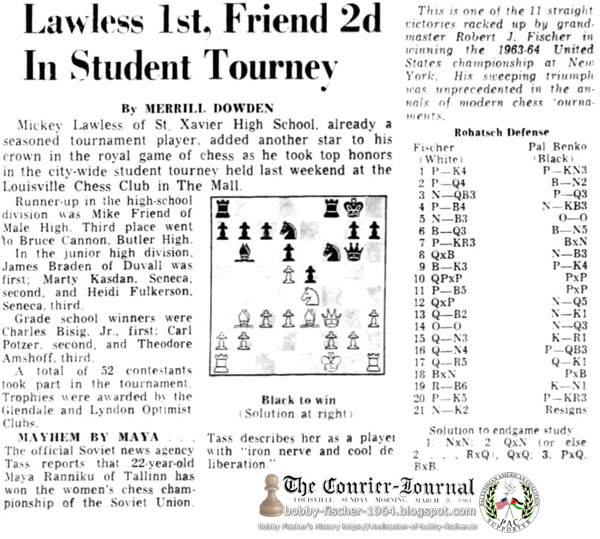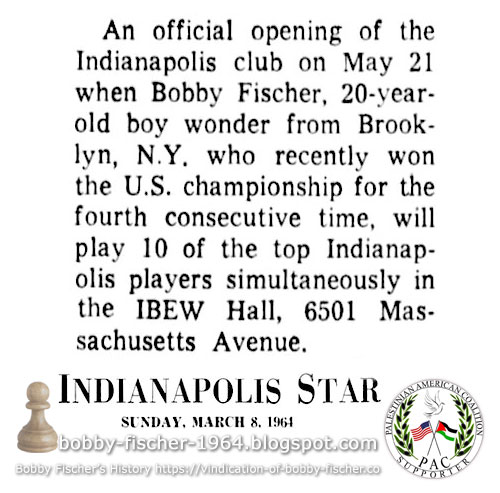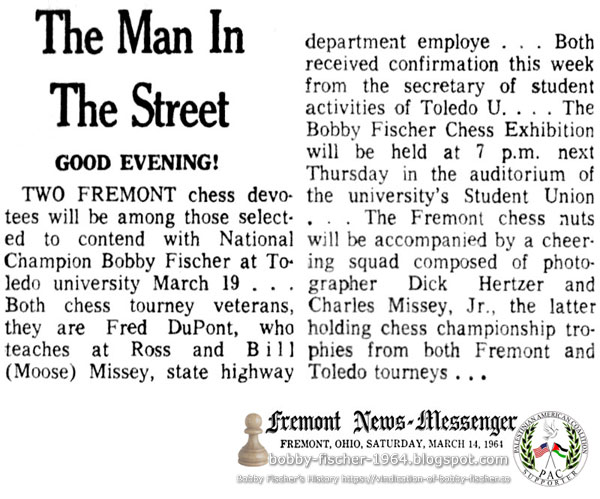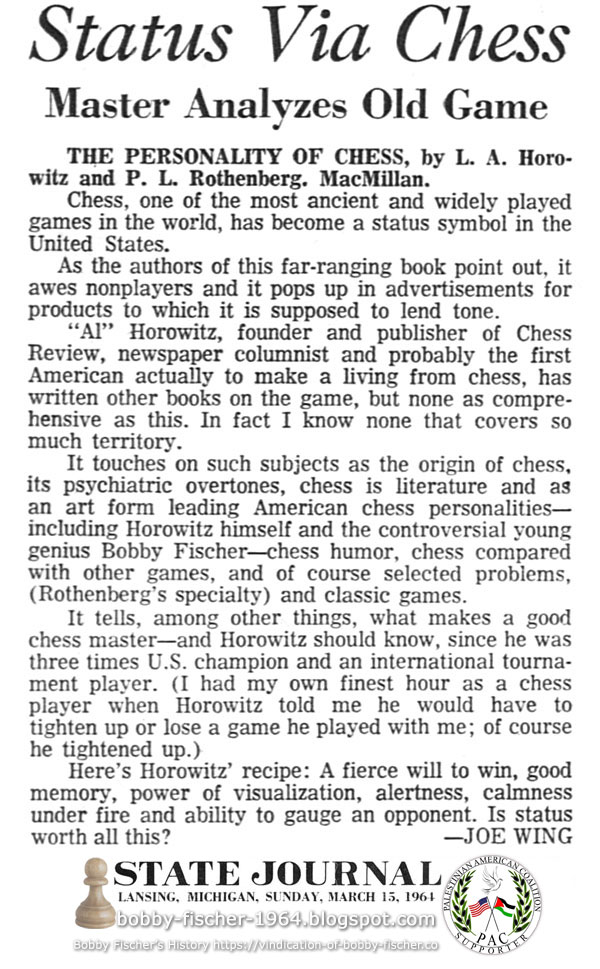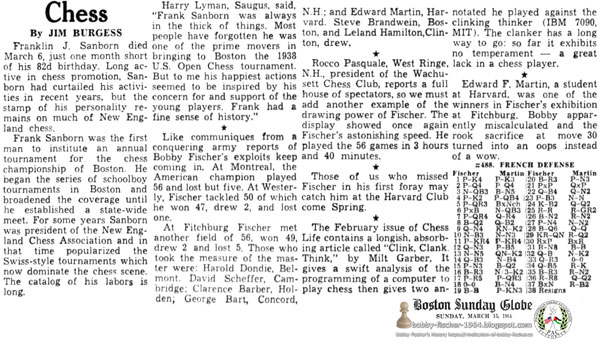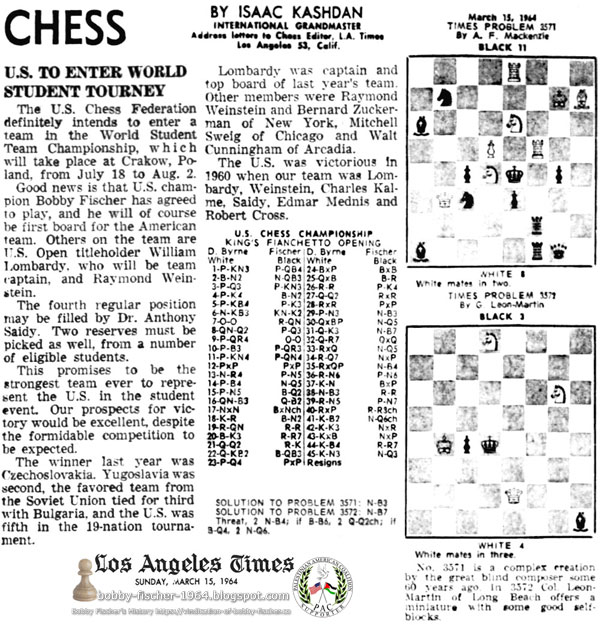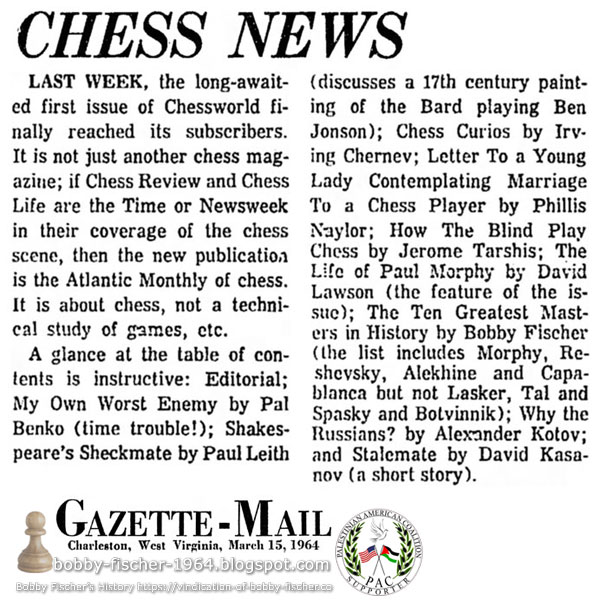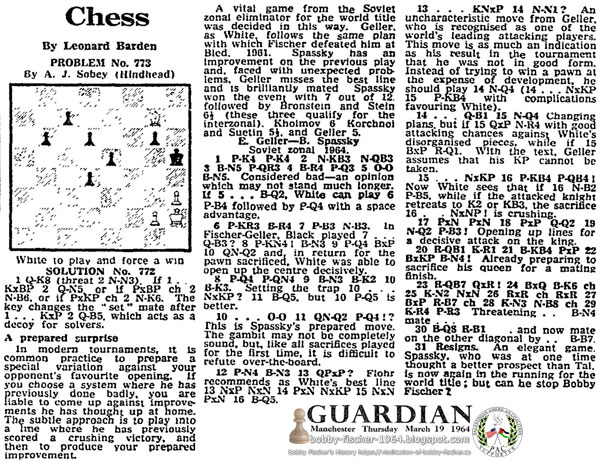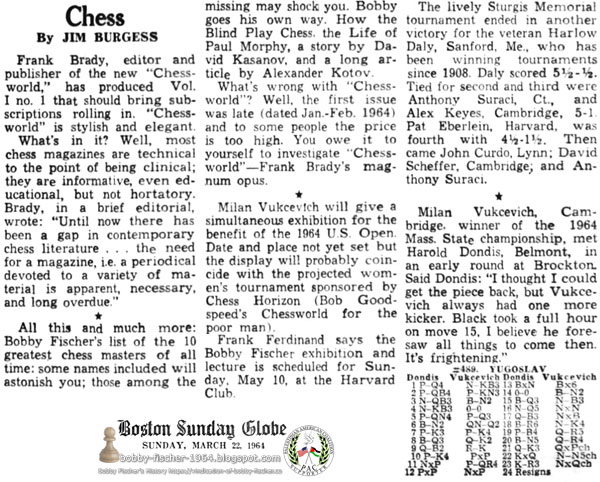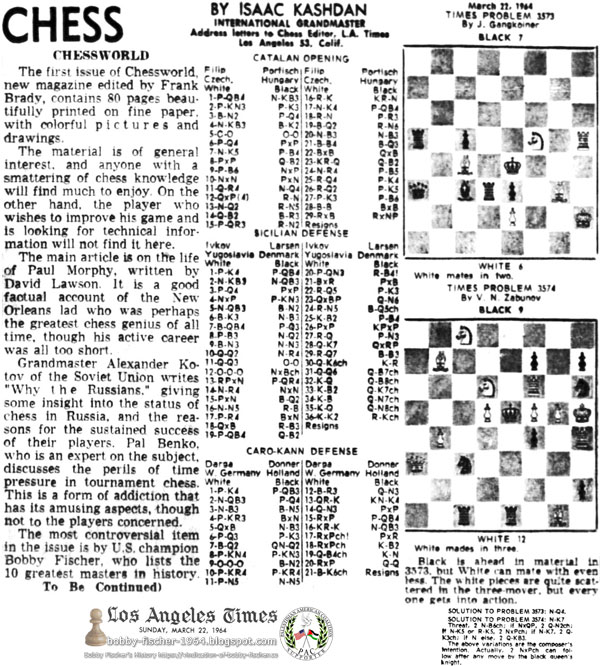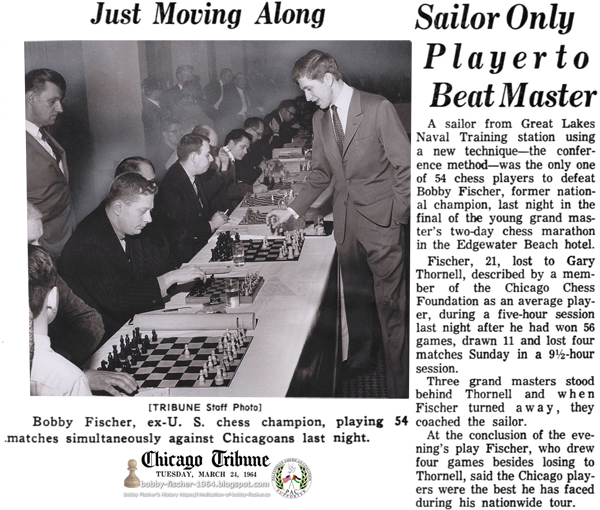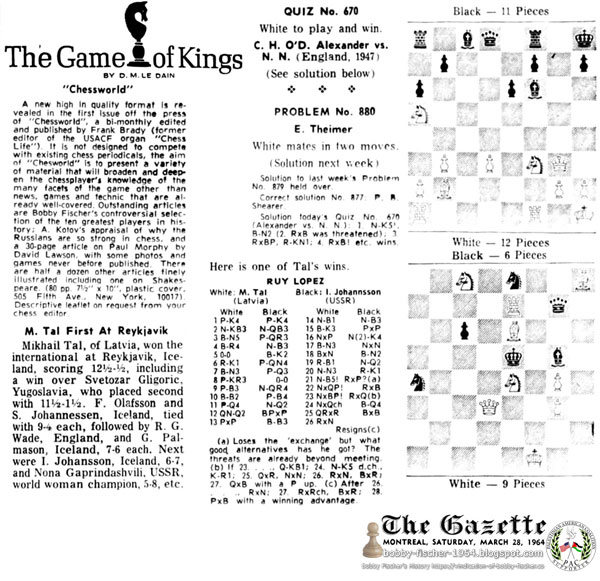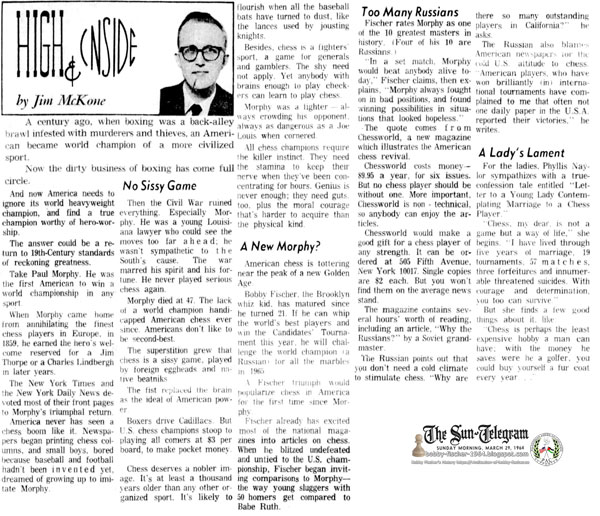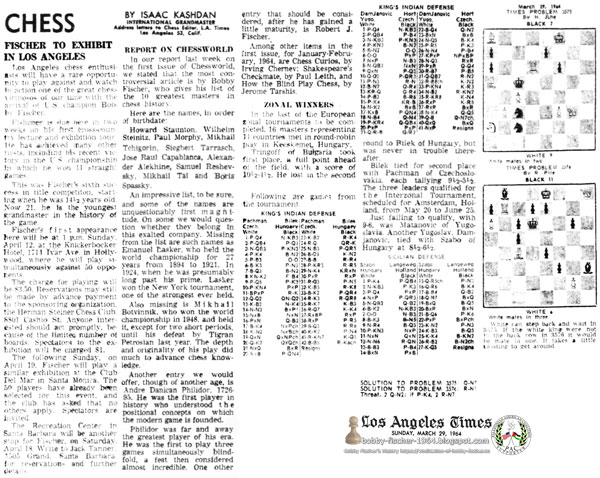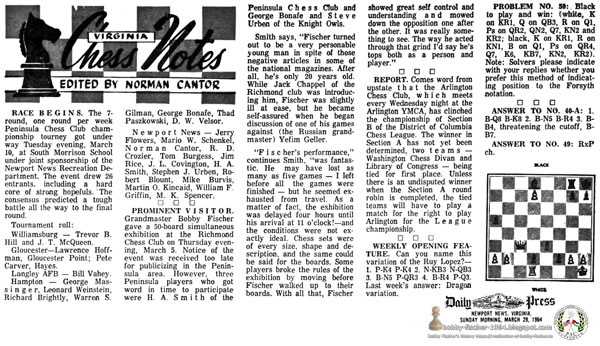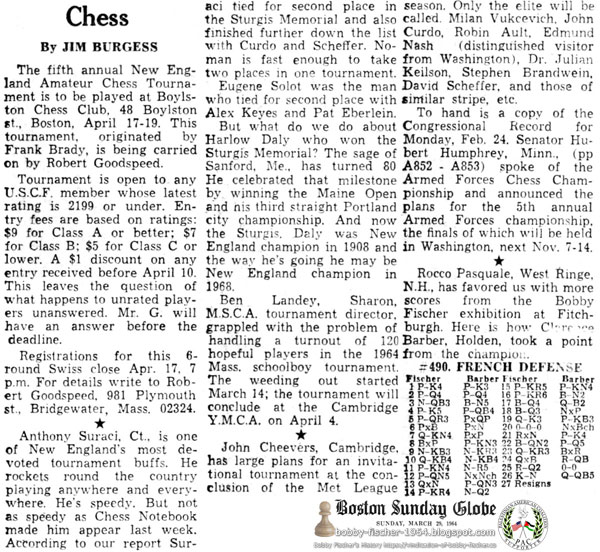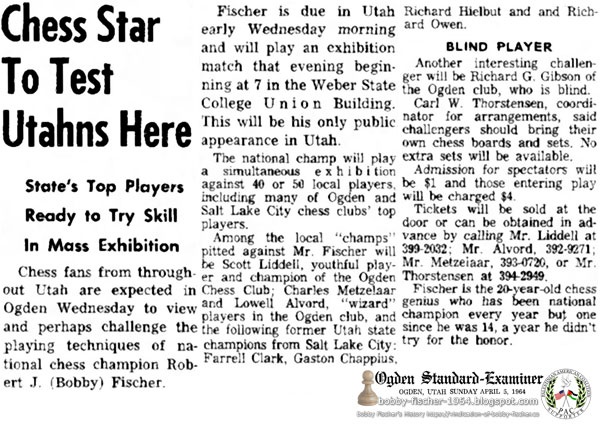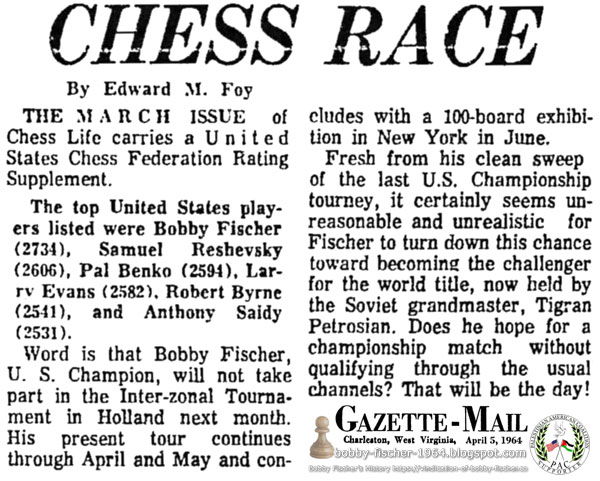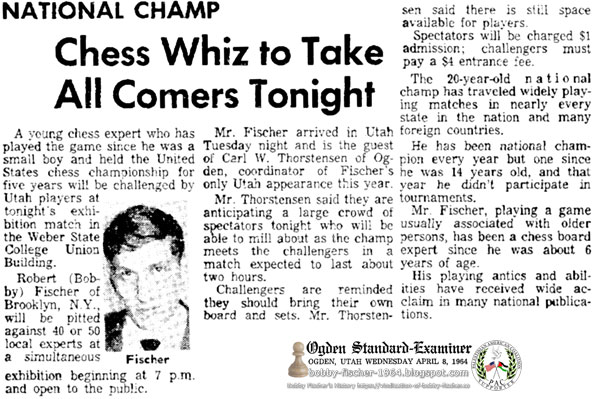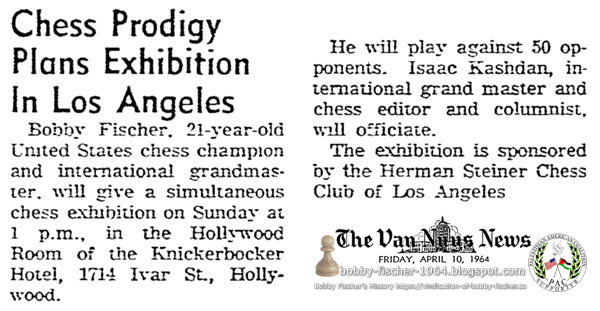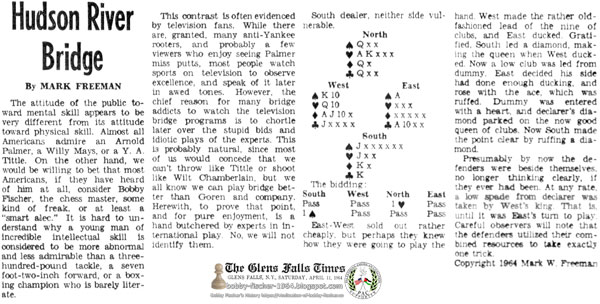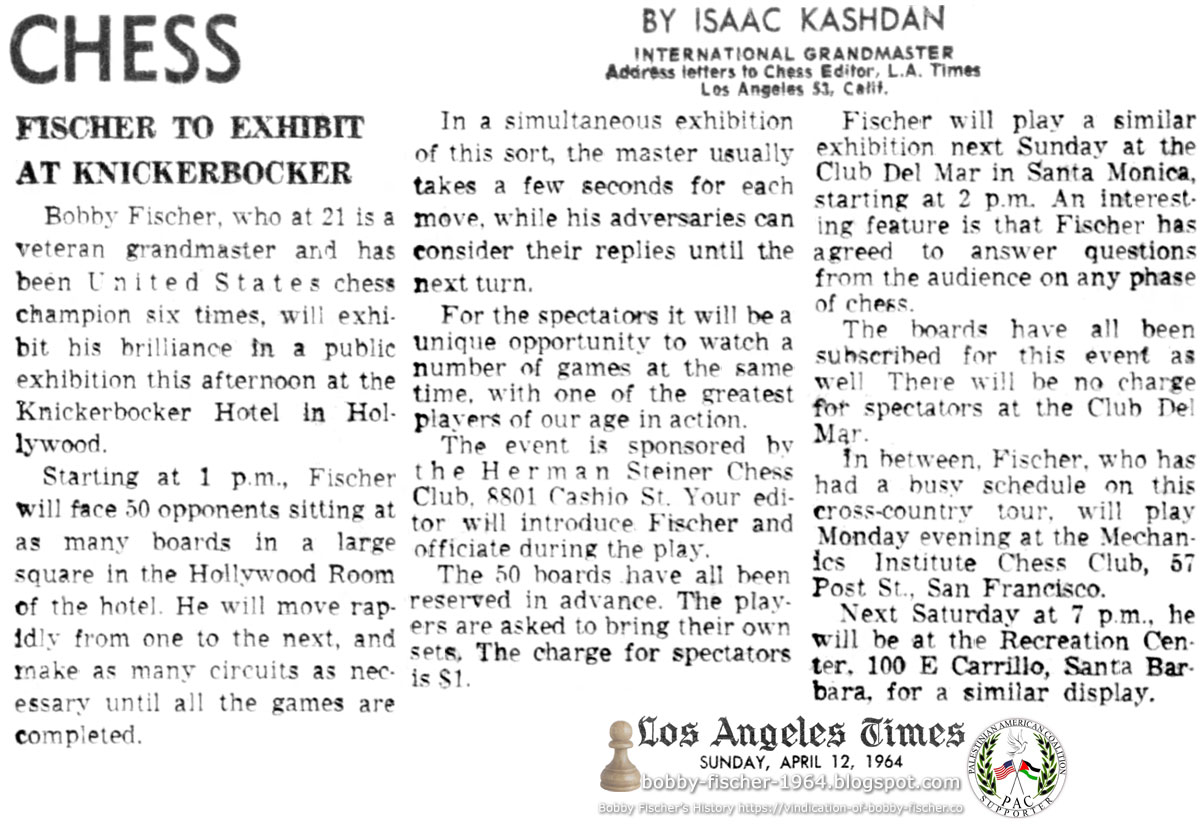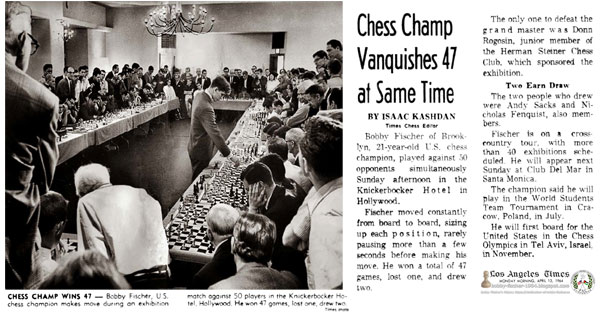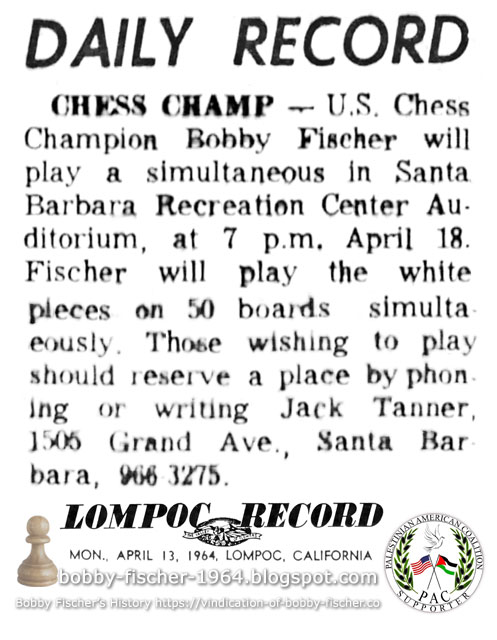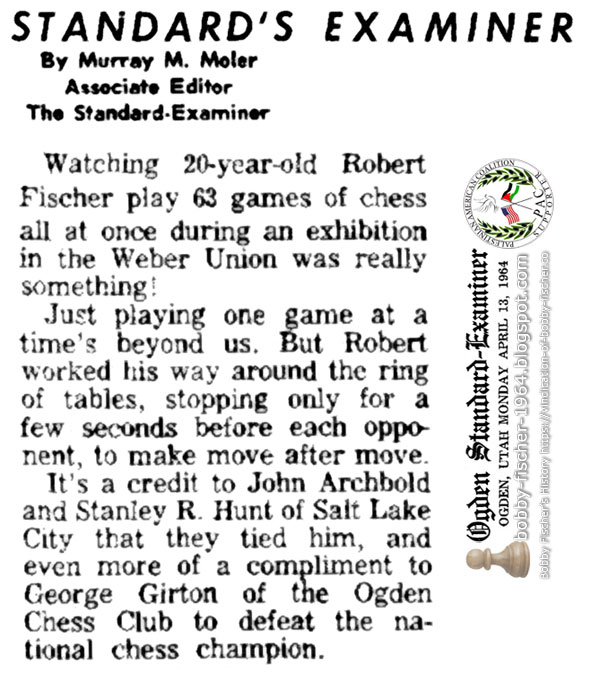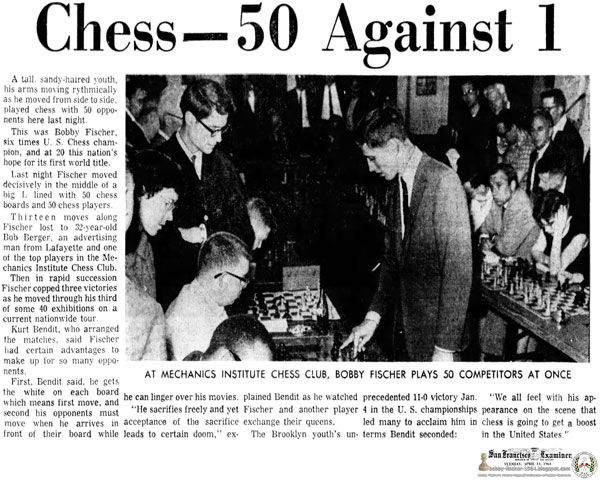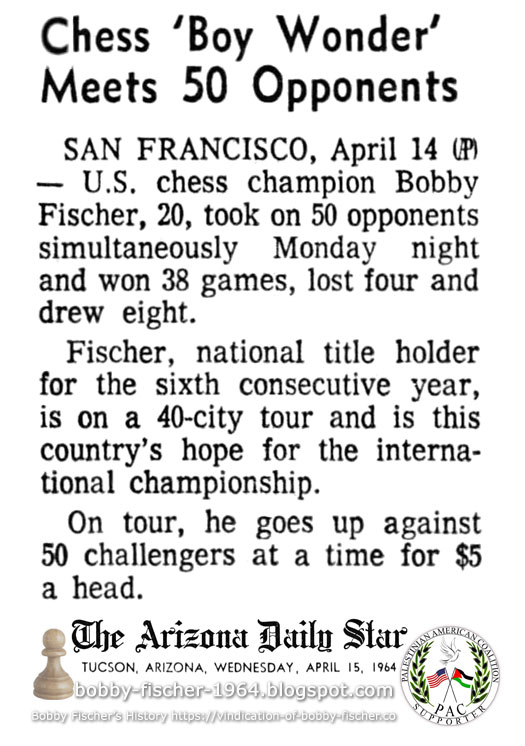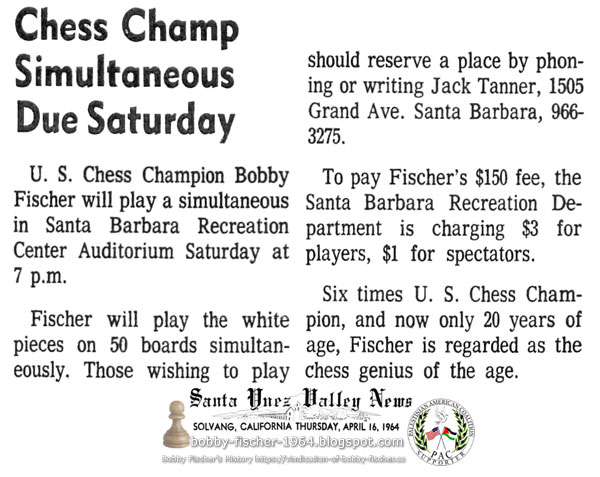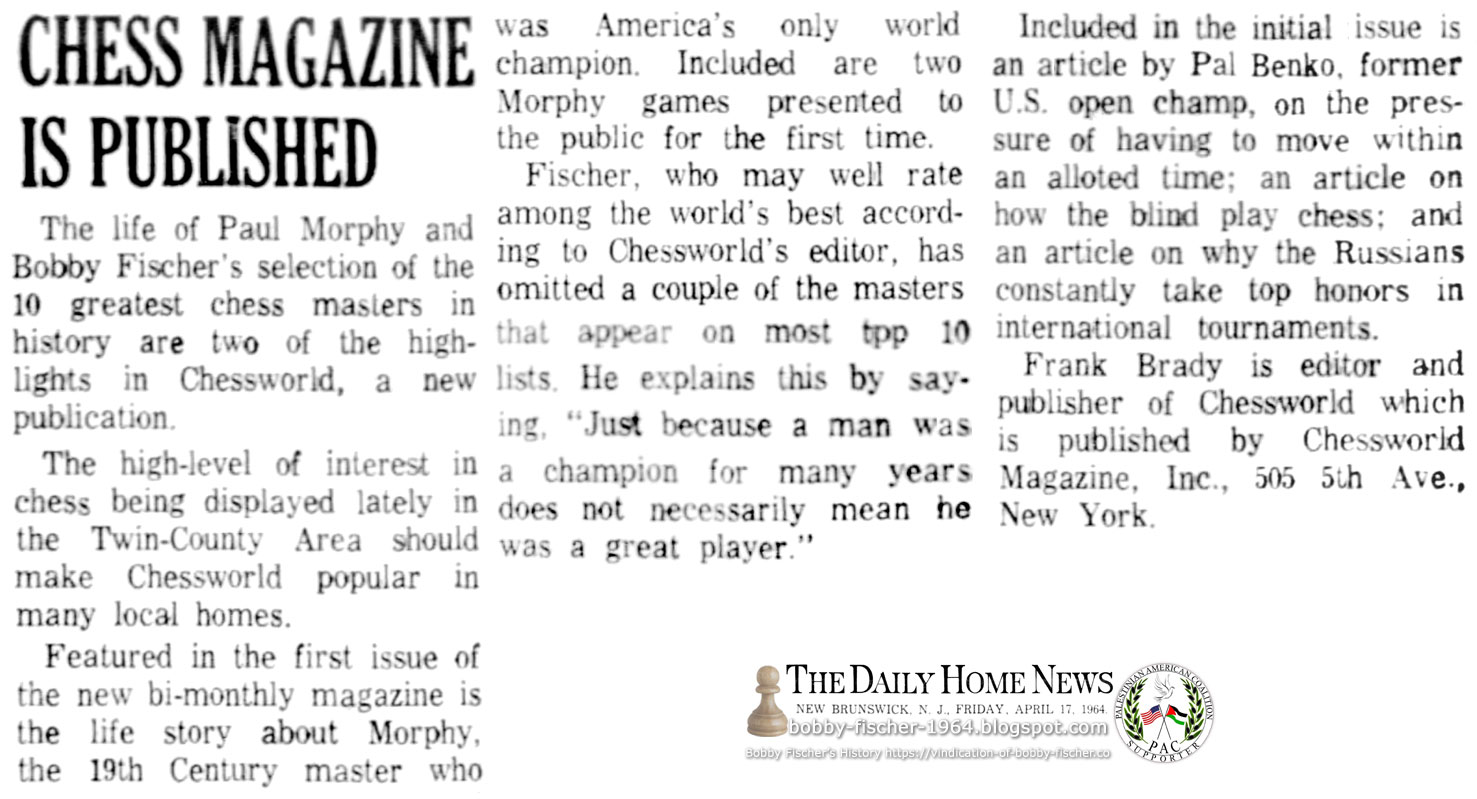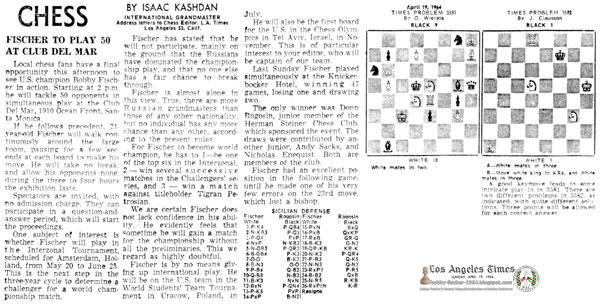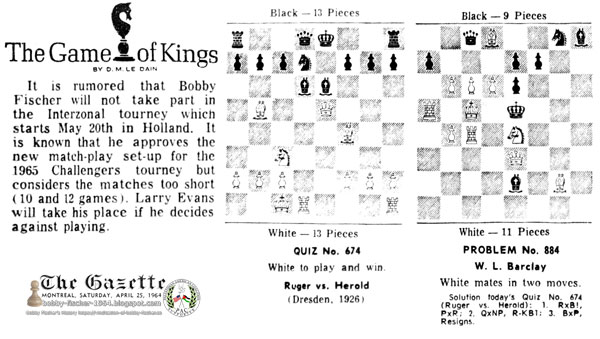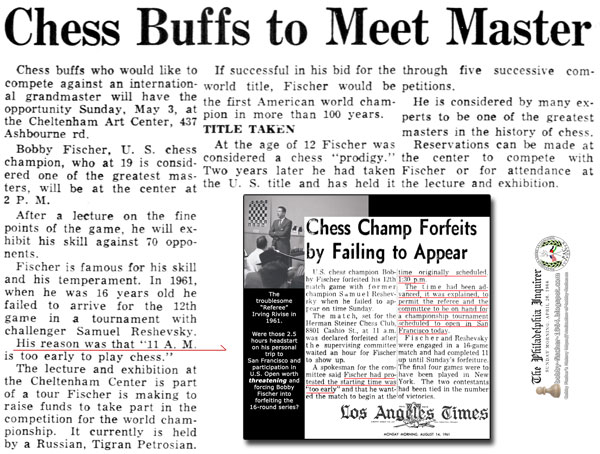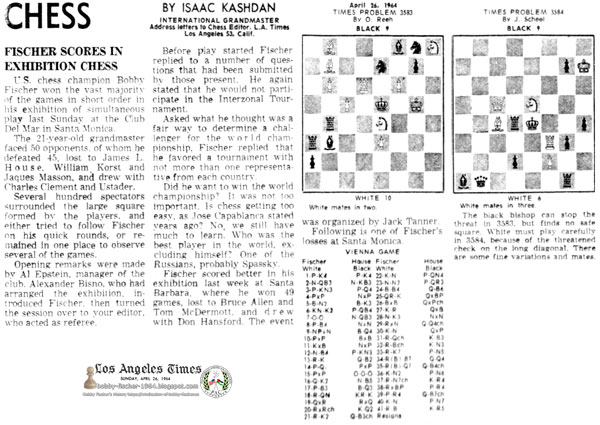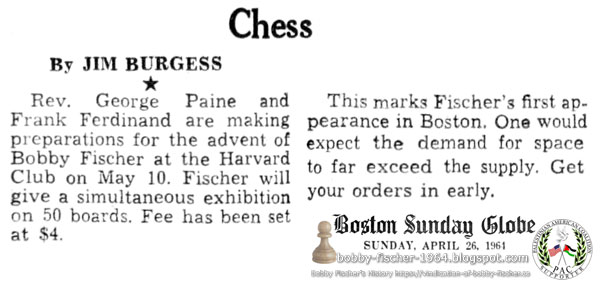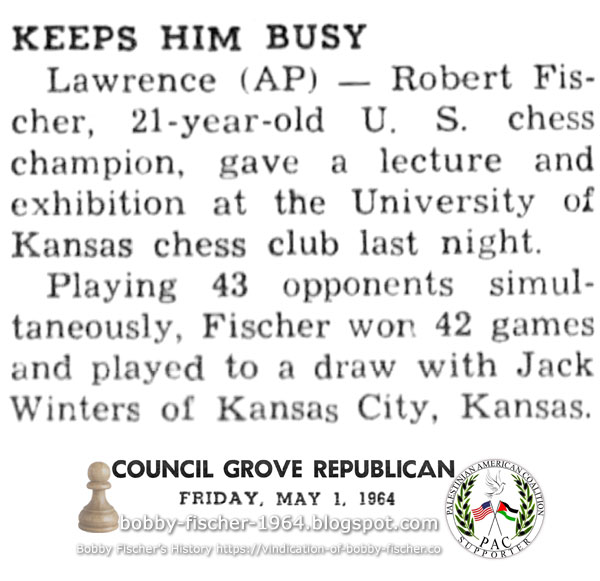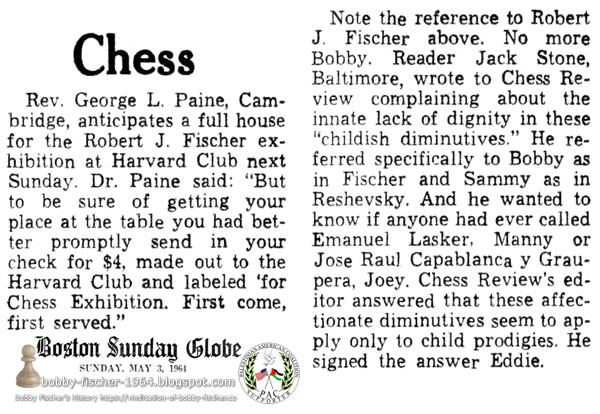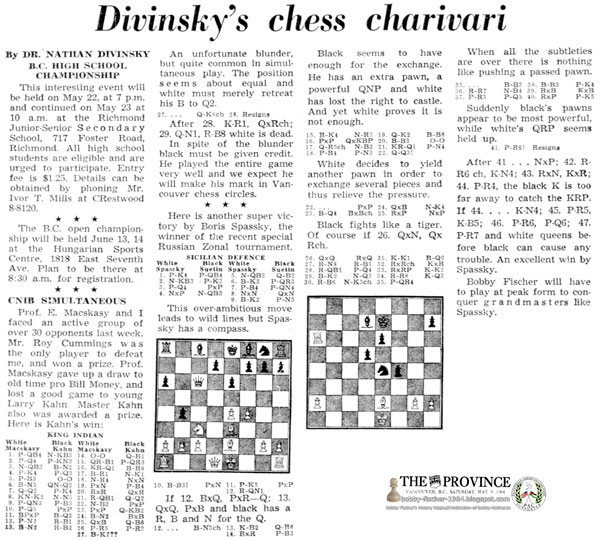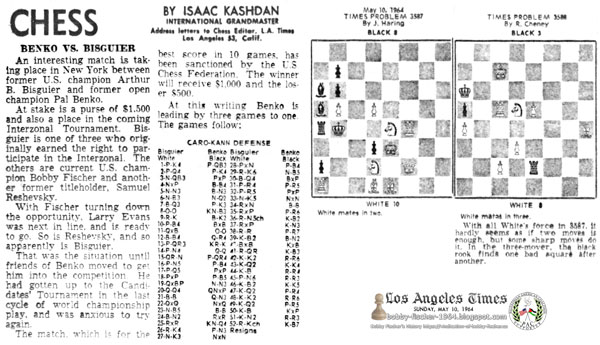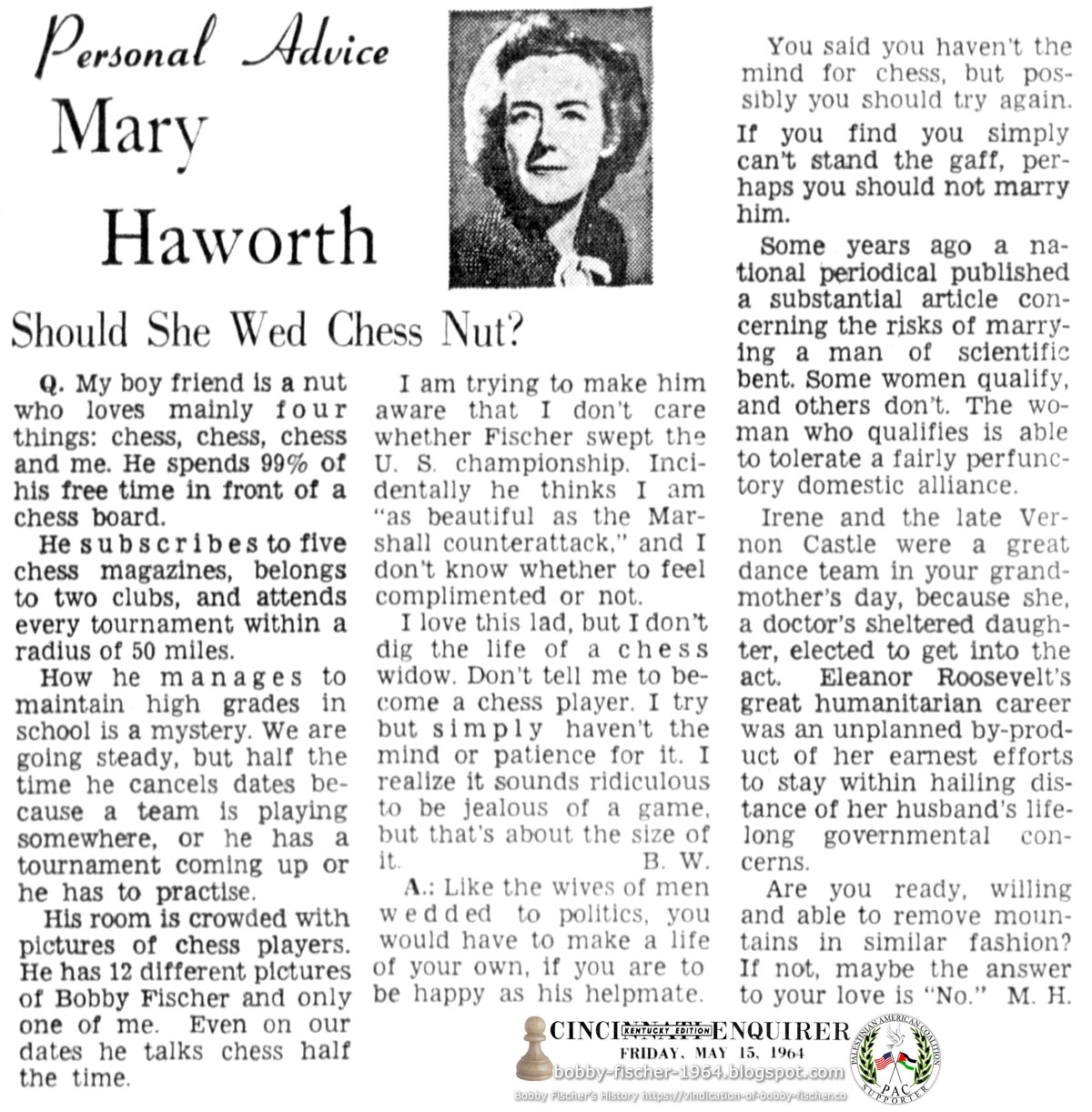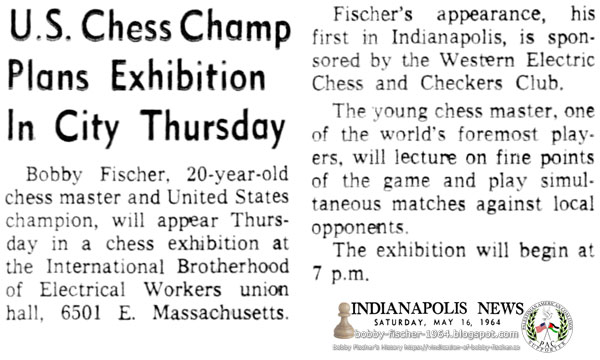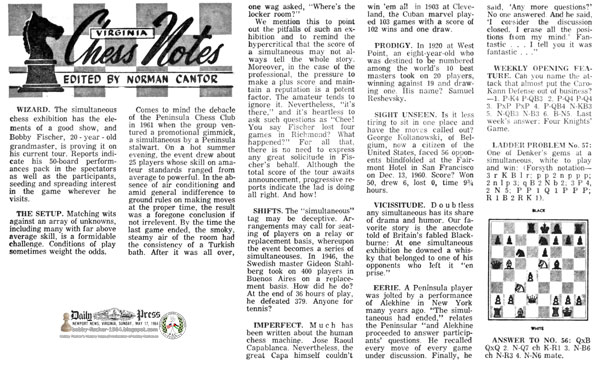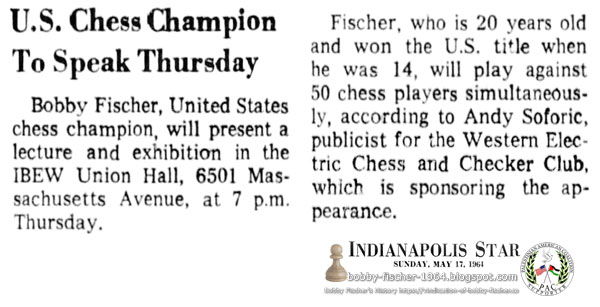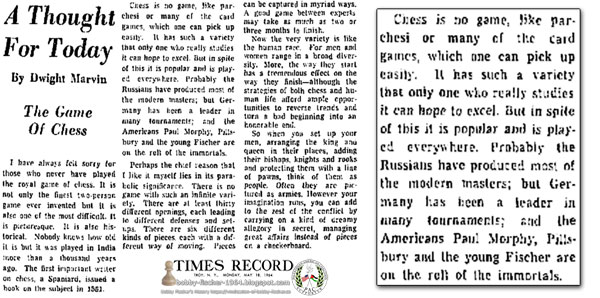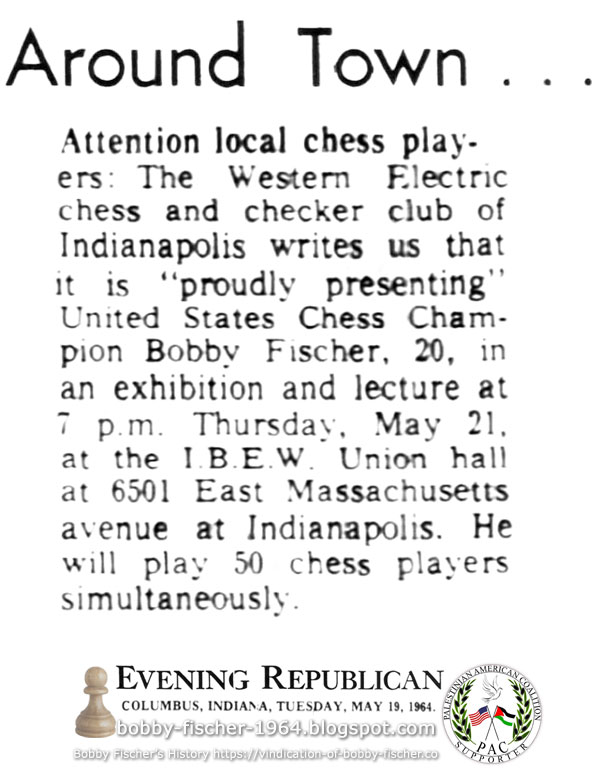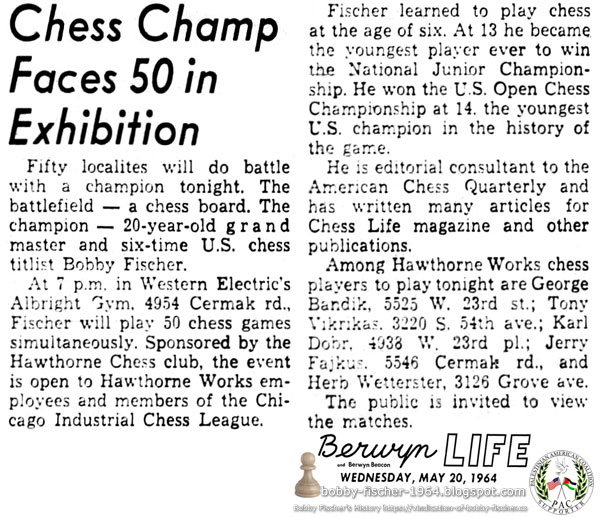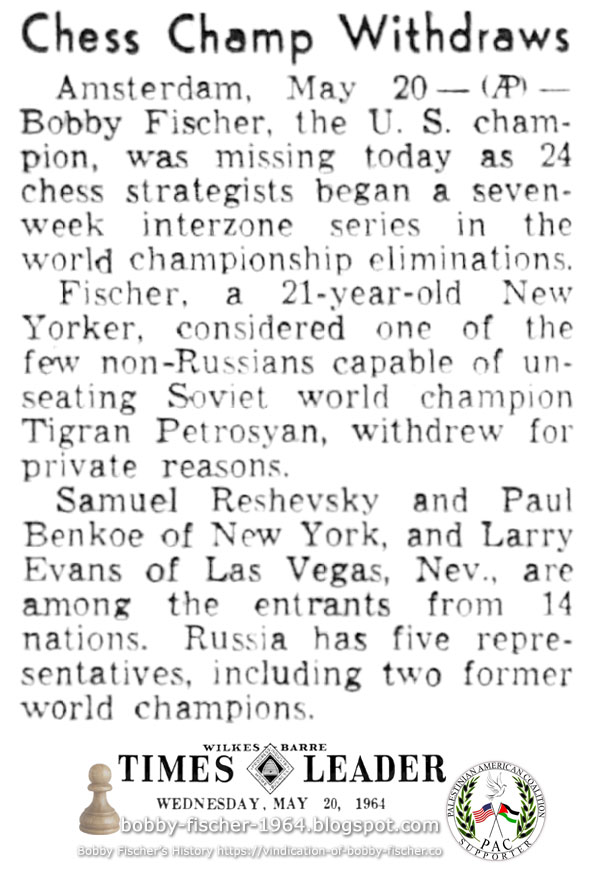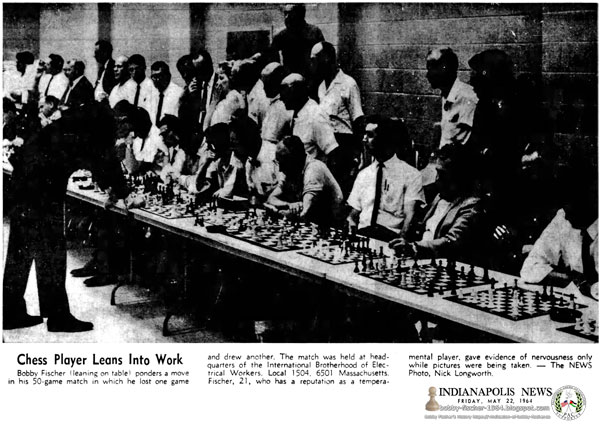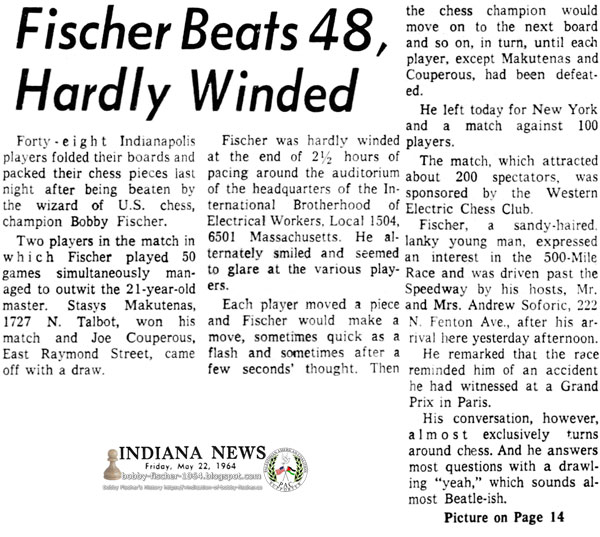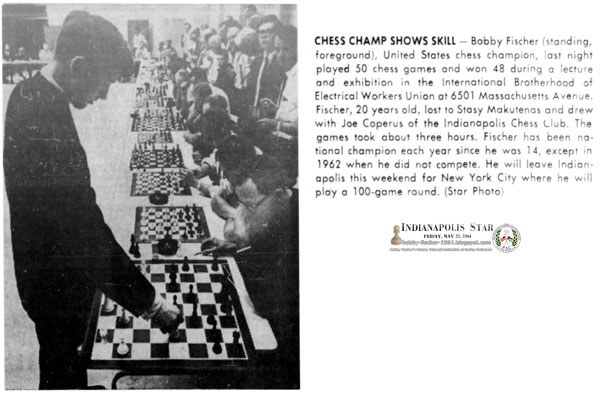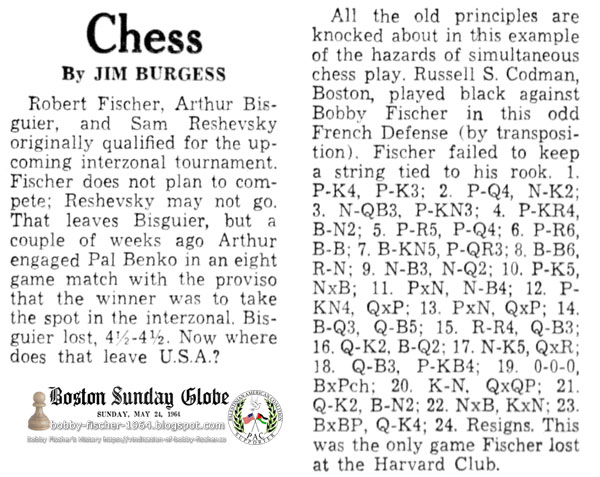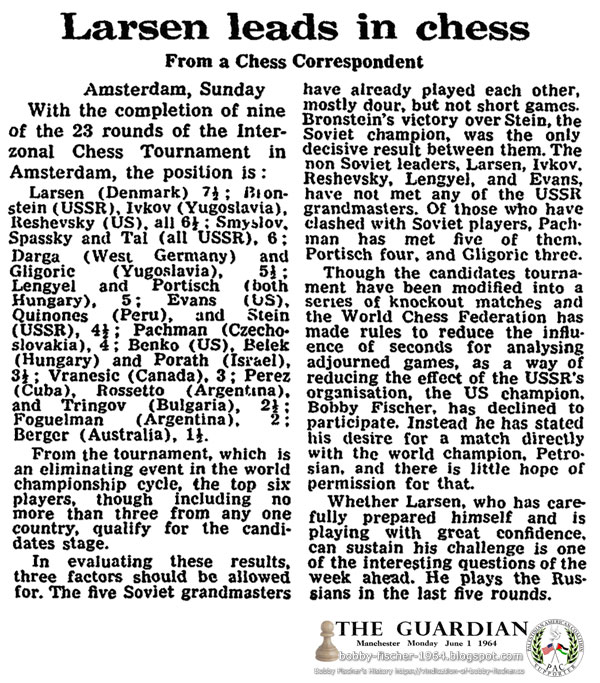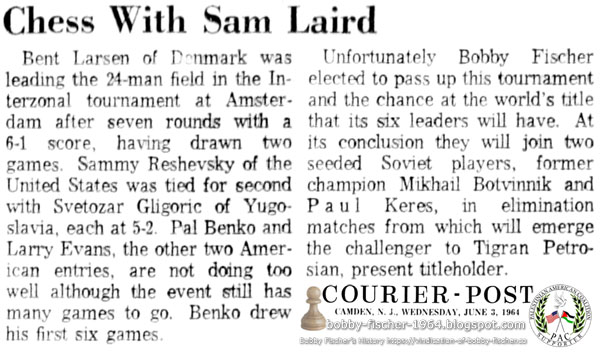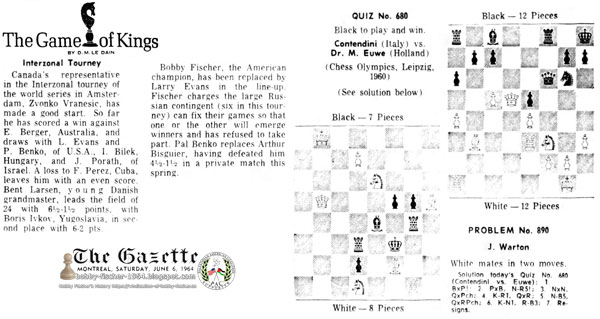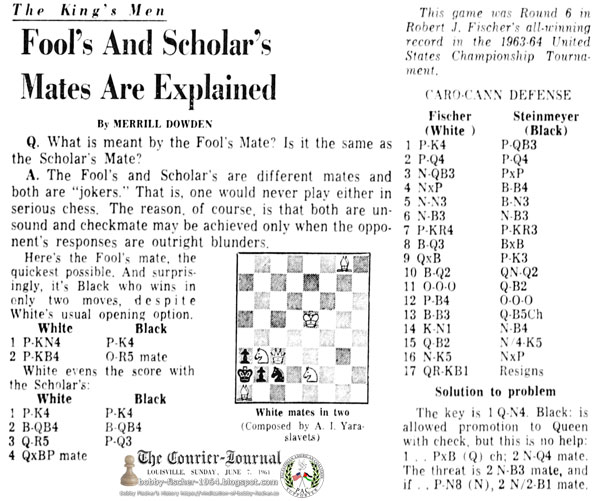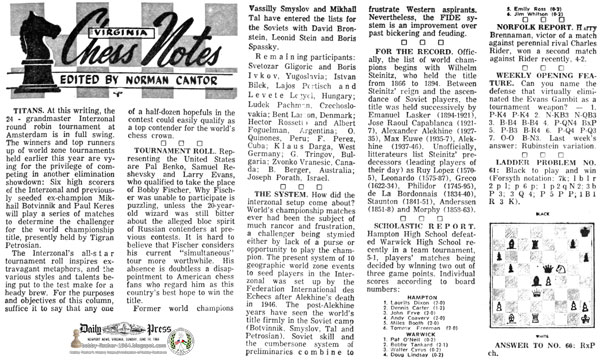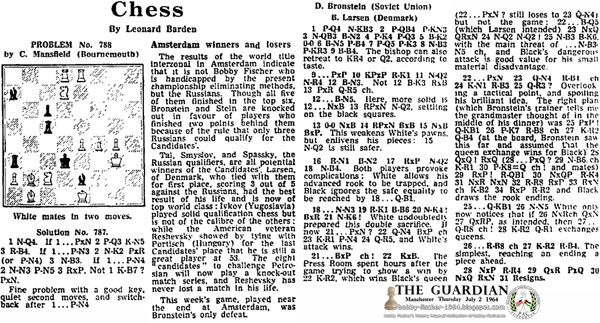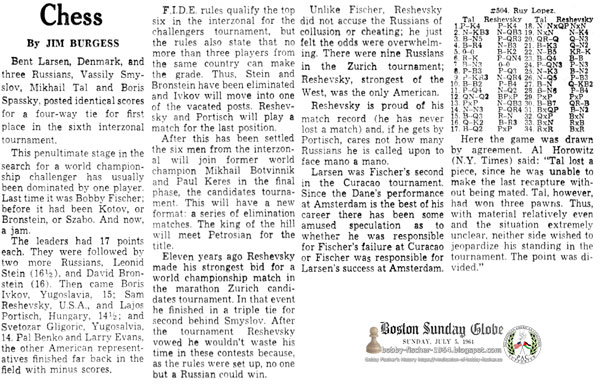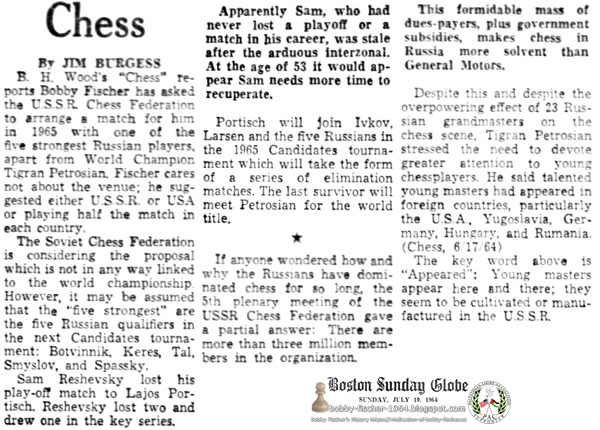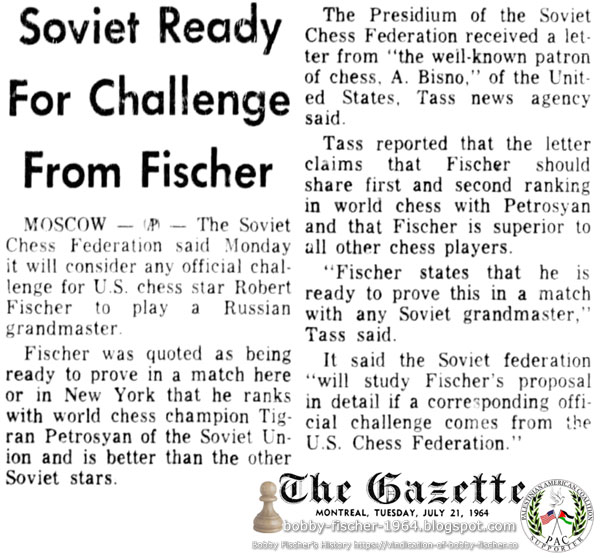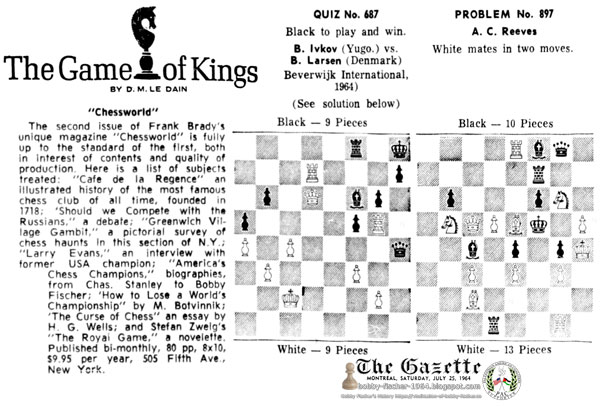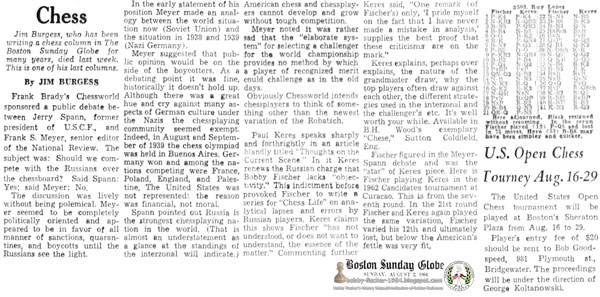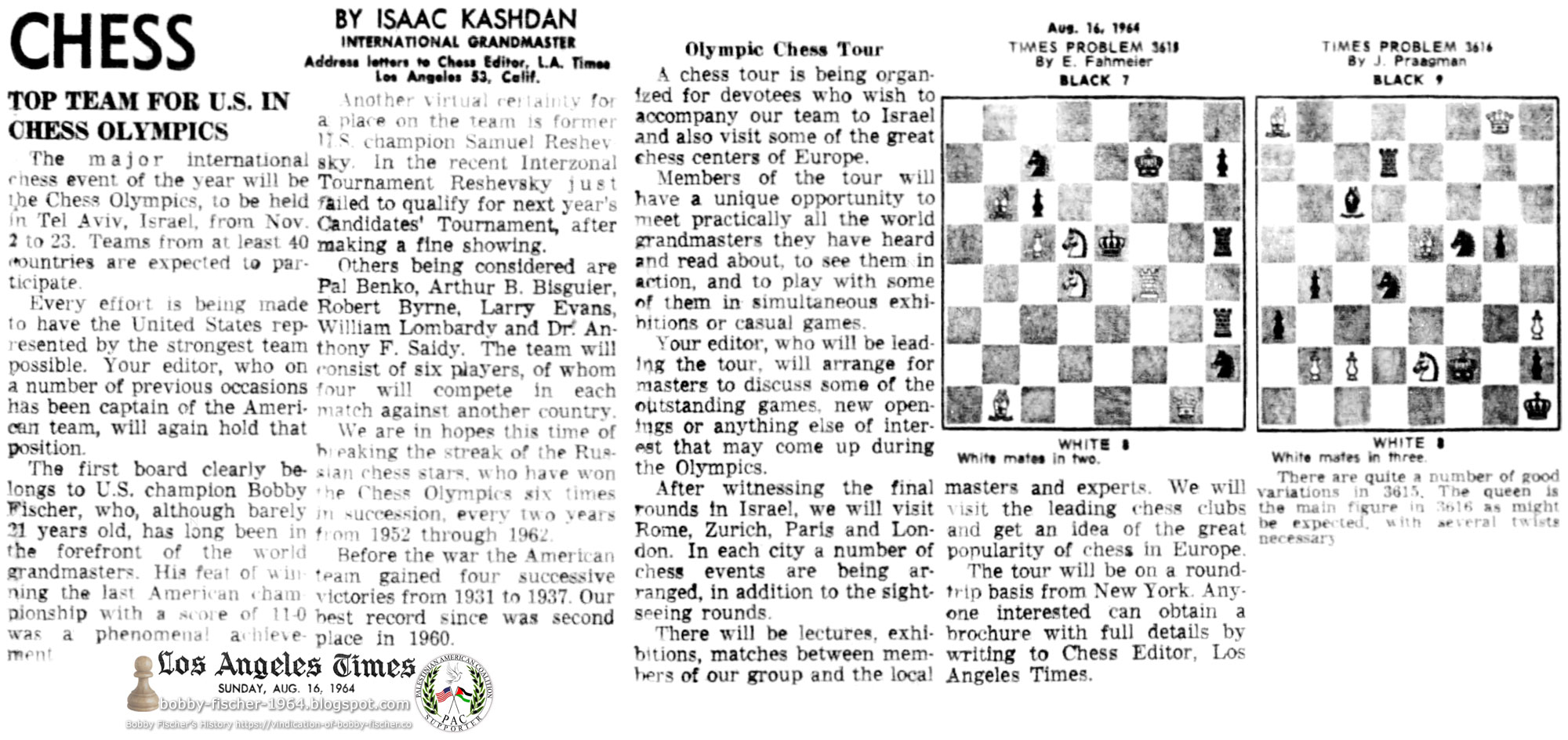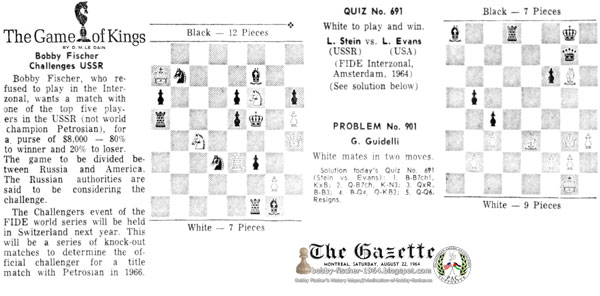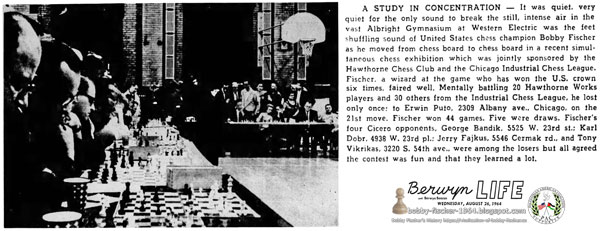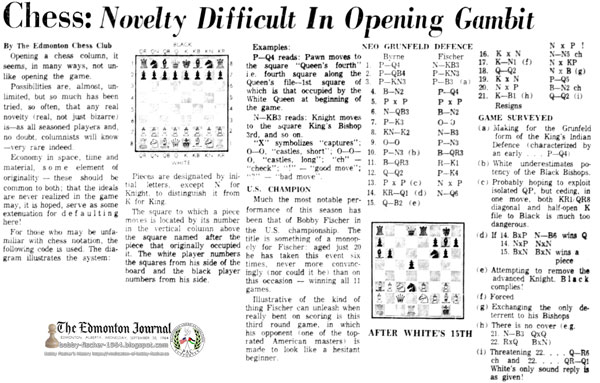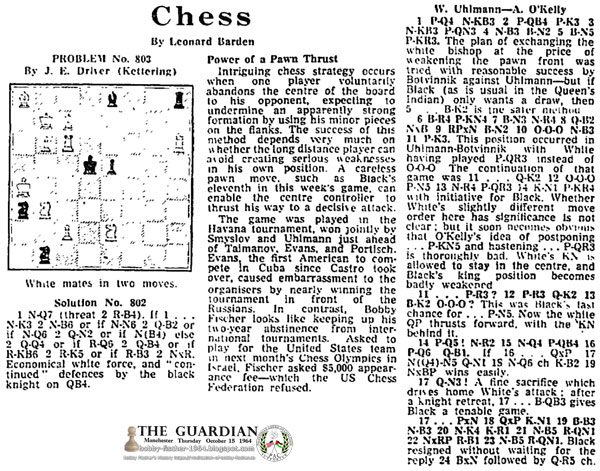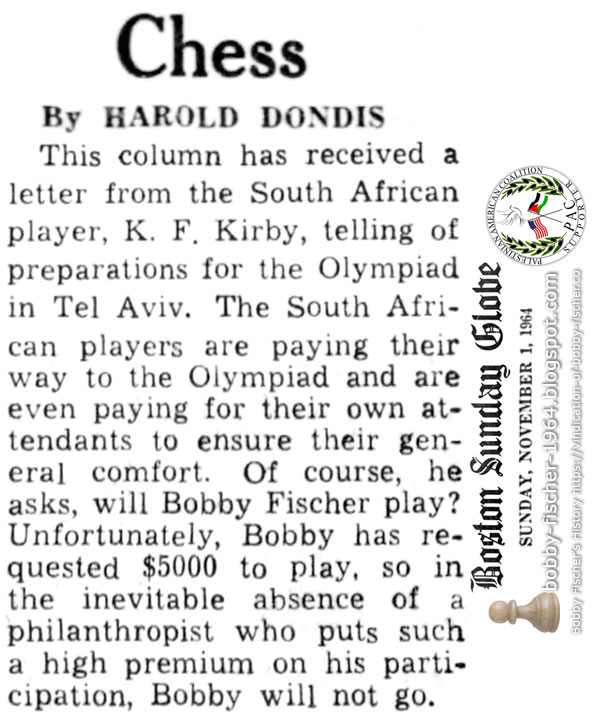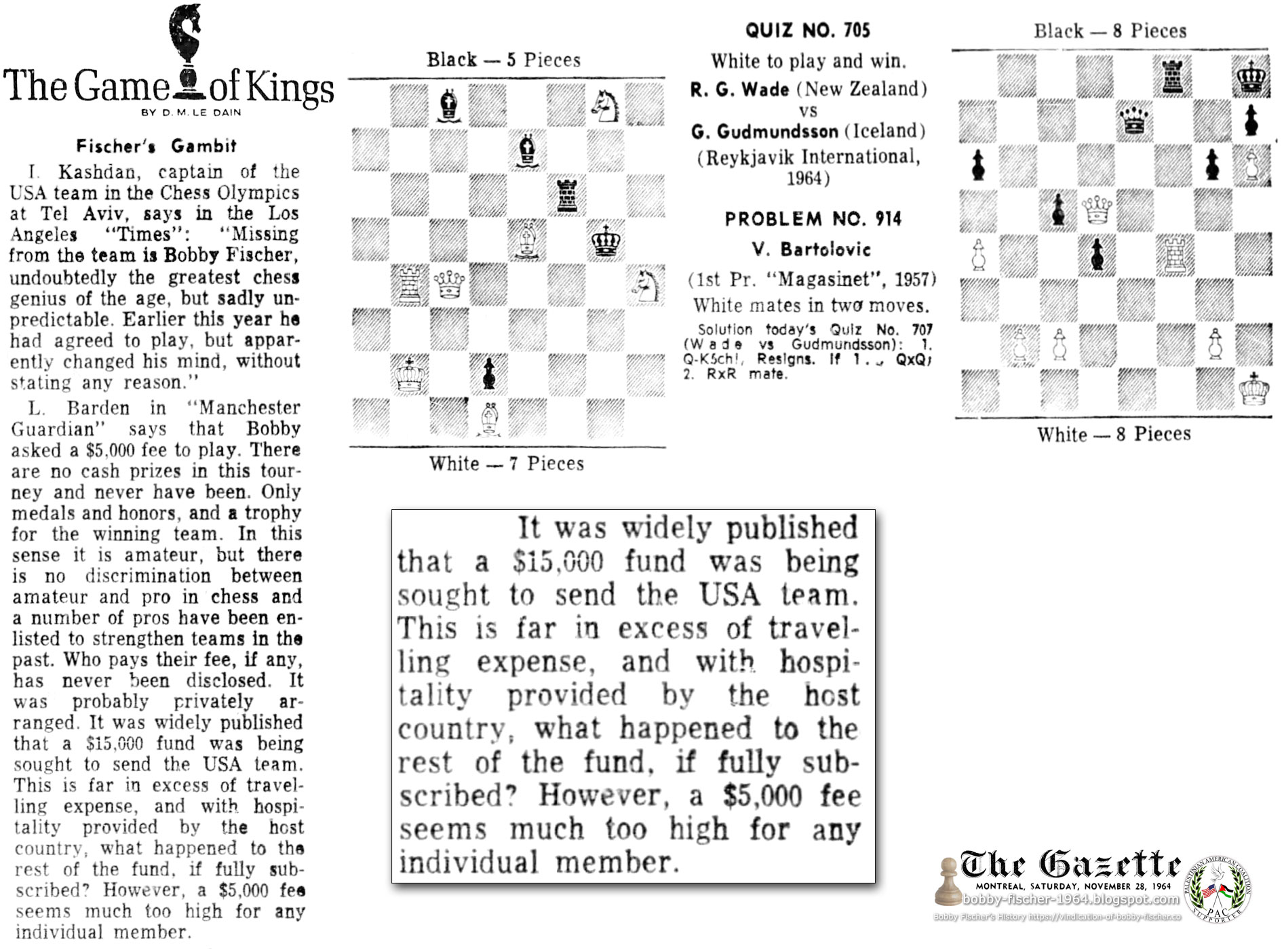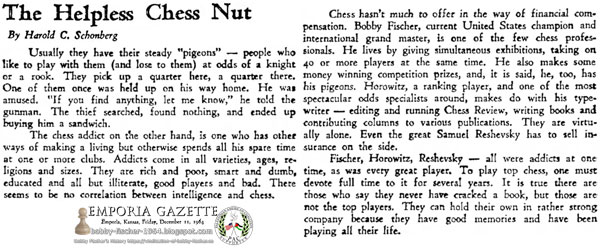New York Times, New York, New York, Wednesday, January 01, 1964 - Page 22
Fischer Keeps Title At Chess Tourney
Bobby Fischer of Brooklyn, the 20-year-old United States chess champion, has retained his title.
Donald Byrne of State College, Pa., resigned his ninth-round adjourned game with Fischer Monday night without further play, giving Fischer a score of 9-0. No one else in the 12-man field has a mathematical chance of equalizing Fischer's score.
In the 10th and penultimate round of the tournament, being played at the Henry Hudson hotel, Fischer defeated Pal Benko of New York. On the white side of a Pirc Defense, he executed an irrefutable mating attack sparked by the offer of a rook. Benko resigned on his 21st turn.
Other tenth-round results follow: Robert Byrne of Indianapolis, on the white side of a Gruenfeld Defense, defeated Robert Steinmeyer of New York after 39 moves. Dr. Anthony Saidy of Puerto Rico, as black in a King's Fianchetto, defeated Donald Byrne after 39 moves.
A draw was recorded in the Queen's Gambit Declined between Sammy Reshevsky of Spring Valley, N.Y., and Arthur Bisguier of New York.
Two games were adjourned: William Addison of Los Angeles vs. Larry Evans of New York, in an even position, and Edmar Mednis of New York vs. Raymond Weinstein of Brooklyn, in a position favorable to Mednis.
—
The 11th and final round will be played tomorrow at 7 P.M. The pairings follow: Saidy vs. Fischer; Evans vs. D. Byrne; Bisguier vs. Addison; Steinmeyer vs. Reshevsky; Weinstein vs. R. Byrne; Benko vs. Mednis. The first named player has the white pieces.
Hartford Courant Hartford, Connecticut Wednesday, January 01, 1964 - Page 10
Chess Finals Start Thursday
New York (UPI) — The final round of the U.S. chess championship will start Thursday with 20-year-old defending champion Bobby Fischer of Brooklyn playing Dr. Anthony Saidy of Puerto Rico.
Fischer adjourned his ninth-round game with Donald Byrne of State College, Pa., last Sunday with an exchange ahead.
Fischer is expected to win, giving him a clean sweep for the first nine rounds.
Only two games in the ninth round have been completed.
They were a draw after 21 moves in a French defense between Arthur Bisguier of New York and Robert Byrne of Indianapolis and a King's Indian defense between Robert Steinmeyer and Edmar Mednis, both of New York, drawn after 22 moves.
This article also appears in,
- The Indianapolis News Indianapolis, Indiana Thursday, January 02, 1964 - Page 36 “Defending Chess Champ Does It Again”
- Poughkeepsie Journal Poughkeepsie, New York Thursday, January 02, 1964 - Page 4 “Brooklyn Youth Gains Chess Title”
- The Bridgeport Post Bridgeport, Connecticut Thursday, January 02, 1964 - Page 10 “Brooklyn Youth Wins U.S. Chess Title Again”
- Press and Sun-Bulletin Binghamton, New York Thursday, January 02, 1964 - Page 30 “Chess Title on Ice”
- The News Journal Wilmington, Delaware Thursday, January 02, 1964 - Page 43 “Youth Clinches U.S. Chess Title”
- Des Moines Tribune Des Moines, Iowa Thursday, January 02, 1964 - Page 9 “Chess Champion Retains His Title”
- St. Louis Post-Dispatch St. Louis, Missouri Thursday, January 02, 1964 - Page 9 “Chess Champion Clinches Defense Of His U.S. Title”
- The Santa Fe New Mexican Santa Fe, New Mexico Thursday, January 02, 1964 - Page 9 “Fischer Wins”
- Hobbs Daily News-Sun Hobbs, New Mexico Thursday, January 02, 1964 - Page 17 “Fischer Wins”
- Fort Lauderdale News Fort Lauderdale, Florida Thursday, January 02, 1964 - Page 2 “Chess Champion”
- The Minneapolis Star Minneapolis, Minnesota Thursday, January 02, 1964 - Page 20 “Bobby Fischer has clinched championship”
- Chicago Tribune Chicago, Illinois Friday, January 03, 1964 - Page 27 “Chess Title Clinched By Bobby Fischer”
- The Philadelphia Inquirer Philadelphia, Pennsylvania Friday, January 03, 1964 - Page 8 “Bobby Fischer Champ”
- The Gazette Montreal, Quebec, Canada Friday, January 03, 1964 - Page 20 “Chess Champ”
- The Daily Reporter Dover, Ohio Friday, January 03, 1964 - Page 12 “Bobby Fischer, clinched U.S. Chess Championship”
- The Mercury Pottstown, Pennsylvania Friday, January 03, 1964 - Page 11 “U.S. Chess Title Won By Bobby Fischer”
The Tampa Times Tampa, Florida Thursday, January 02, 1964 - Page 7 (★)
Fischer Clinches U.S. Chess Title
New York (AP) — Bobby Fischer, 20-year-old defending champion from Brooklyn, has clinched the United States chess championship.
Fischer is undefeated and untied in 10 games, making it mathematically impossible for anyone to overtake him in tomorrow night's final round.
Other leaders are Dr. Anthony Saidy of Puerto Rico with a record of four sins and two losses and two draws. Pal Benko of New York with three wins, two losses and four draws, and Larry Evans of New York, a former champion, with four wins, two losses and one draw.
Austin American-Statesman Austin, Texas Thursday, January 02, 1964 - Page 12
BOBBY FISCHER, a 20-year-old Brooklyn boy, has mathematically clinched his second straight national chess championship.
He will take a record of no defeats, no ties in the last 10 games into the final round of the national chess tournament Friday night in New York.
Other leaders are DR. ANTHONY SAIDY of Puerto Rico; PAL BENKO of New York; and former champion LARRY EVANS of New York.
New York Times, New York, New York, Saturday, January 04, 1964 - Page 20
Fischer Conquers Field In Tourney: He Is First in 70 Years to Match Chess Record
Bobby Fischer won his 11th straight game in the final round of the United States Chess Championship last night, giving him a perfect score, the first in a major tournament in the United States in 70 years.
Fischer defeated Dr. Anthony Saidy of Puerto Rico in 56 moves. The game had been started Thursday night and adjourned. Saidy, the last man who could have blocked Fischer's perfect score, had pondered his final, sealed, move before the adjournment for 40 minutes.
When the move was unsealed last night, however, it became apparent that it was the wrong one. Fischer himself sat down with Saidy after he had won the game to show Saidy that if he had made a different move he could have held Fischer to a draw.
Only a handful of spectators was on hand when Fischer won the final game, in contrast to the hundreds who had followed his play in previous games.
Fischer won $2,000 for placing first; Larry Evans won $1,000 for placing second.
At the age of 20 he has now won the United States championship for the sixth time, breaking a deadlock with Sammy Reshevsky, who has won it five times. Fischer first won the title when he was 14.
Not since 1893 when Dr. Emanuel Lasker won 13 games in a row has a player in a major United States championship won all his games. The following year Lasker went on to win the world championship.
Two games were completed in the final round at the Henry Hudson Hotel on Thursday night. Arthur Bisguier of New York defeated William Addison of Los Angeles in 38 moves of a Sicilian in Reverse. Larry Evans of New York won from Donald Byrne of State College, Pa., in 47 moves of a Gruenfeld Defense.
Four games were adjourned. Robert Steinmeyer of New York and Sammy Reshevsky of Spring Valley played 41 moves of a Neo Gruenfeld Defense, with Reshevsky having the better position. Raymond Weinstein of Brooklyn had five pawns for a piece in a King's Indian Defense with Robert Byrne of Indianapolis. Weinstein was favored to win. Pal Benko and Edmar Mednis, both of New York, were in a difficult position, reached by a Catalan Opening.
This article also appears in,
- The Central New Jersey Home News New Brunswick, New Jersey Saturday, January 04, 1964 - Page 11 “Perfect Score Wins Chess Title”
- The Bridgeport Post Bridgeport, Connecticut Saturday, January 04, 1964 - Page 24 “Brooklyn Youth Wins Sixth U.S. Chess Title”
- The Akron Beacon Journal Akron, Ohio Saturday, January 04, 1964 - Page 3 “Wins Sixth Chess Title”
- The Tampa Times Tampa, Florida Saturday, January 04, 1964 - Page 10 “Sixth Crown”
- The News Journal Wilmington, Delaware Saturday, January 04, 1964 - Page 17 “Perfect 11-0 Score”
- Oakland Tribune Oakland, California Saturday, January 04, 1964 - Page 5 “Fischer Wins Chess Title Again”
- The Pensacola News Pensacola, Florida Saturday, January 04, 1964 - Page 6 “Chess Whiz Wins Crown”
- The Courier-News Bridgewater, New Jersey Saturday, January 04, 1964 - Page 17 “Fischer Wins in Chess”
- Tucson Daily Citizen Tucson, Arizona Saturday, January 04, 1964 - Page 5 “Youth Wins Sixth Chess Tournament”
- The Record Hackensack, New Jersey Saturday, January 04, 1964 - Page 15 “Fischer Takes 6th U.S. Title”
- Press and Sun-Bulletin Binghamton, New York Saturday, January 04, 1964 - Page 7 “Fischer Wins Again”
- The Miami News Miami, Florida Sunday, January 05, 1964 - Page 17 “Perfect 11-0 Score”
- The Tampa Tribune Tampa, Florida Sunday, January 05, 1964 - Page 13 “Youth, 20, Wins Sixth Chess Title”
- The News Paterson, New Jersey Saturday, January 04, 1964 - Page 3 “Fischer, 20-Year-Old Chess Wizard, Wins 6th Championship”
Orlando Evening Star Orlando, Florida Saturday, January 04, 1964 - Page 4
Brooklyn Chess Whiz Racks Up 6th U.S. Title
New York (AP)—Bobby Fischer, 20-year-old chess wizard from Brooklyn, has won his sixth U.S. championship. His perfect 11-0 score was the first in 70 years of major U.S. tourneys.
After his 11th victory last night, Fischer showed his opponent how the game could have ended in a draw. He defeated Dr. Anthony Saidy of Puerto Rico in 56 moves.
The game had been started Thursday.
Fischer won his first U.S. Title at age 14 and has taken every one he's competed for since then. He skipped the 1961 competition.
First prize was $2,000. Second prize of $1,000 went to Larry Evans of Las Vegas, Nev., who scored 7½ points to 3½ for his opponents. Evans won the 1961 title.
The current U.S. chess championship tourney began play Dec. 15 among 12 players.
Reno Gazette-Journal Reno, Nevada Saturday, January 04, 1964 - Page 9
Brooklyn Wizard Defeats Nevadan In Chess Play
New York (AP)—Bobby Fischer, 20-year-old chess wizard from Brooklyn, has won his sixth U.S. championship. His perfect 11-0 score was the first in 70 years of major U.S. tourneys.
Second prize went to Larry Evans of Las Vegas, who scored 7½ points to 3½ for his opponents. Evans won the 1961 title.
First prize was $2,000 and second prize $1,000.
After his 11th victory Friday night, Fischer showed his opponent how the game could have ended in a draw. He defeated Dr. Anthony Saidy of Puerto Rico in 56 moves.
The game had been started Thursday.
Fischer won his first U.S. title at age 14 and has taken every one he's competed for since then. He skipped the 1961 competition.
The current U.S. chess championship tourney began Dec. 15 among 12 players.
This article also appears in,
- The Kansas City Times Kansas City, Missouri Saturday, January 04, 1964 - Page 18 “Keeps A Chess Title”
- The Baltimore Sun Baltimore, Maryland Saturday, January 04, 1964 - Page 7 “Bobby Fischer, 20, Wins U.S. Chess Title”
- The Cincinnati Enquirer Cincinnati, Ohio Saturday, January 04, 1964 - Page 18 “Fischer Wins Chess Title”
- Pittsburgh Post-Gazette Pittsburgh, Pennsylvania Saturday, January 04, 1964 - Page 13 “Bobby Fischer U.S. Chess Champ”
- The Cincinnati Enquirer Cincinnati, Ohio Saturday, January 04, 1964 - Page 18 “Fischer Wins Chess Title”
- The Star Press Muncie, Indiana Saturday, January 04, 1964 - Page 9 “Brooklyn Youth Wins 6th U.S. Chess Title”
- The Morning News Wilmington, Delaware Saturday, January 04, 1964 - Page 5 “Fischer wins 6th U.S. chess crown”
- Democrat and Chronicle Rochester, New York Saturday, January 04, 1964 - Page 7 “Fischer Captures Chess Title”
- The Evening Sun Hanover, Pennsylvania Saturday, January 04, 1964 - Page 3 “Fischer Wins Chess Tourney”
- The South Bend Tribune South Bend, Indiana Saturday, January 04, 1964 - Page 1 (★) “Chess Title Won 6th Time”
- Anderson Herald Anderson, Indiana Sunday, January 05, 1964 - Page 19 “Brooklyn Youth Wins Chess Title”
- The Fresno Bee The Republican Fresno, California Sunday, January 05, 1964 - Page 28 “Brooklyn Chess Champ Repeats”
- Albuquerque Journal Albuquerque, New Mexico Sunday, January 05, 1964 - Page 28 “Brooklyn Youth Wins American Chess Title”
- The Pittsburgh Press Pittsburgh, Pennsylvania Sunday, January 05, 1964 - Page 22 “Champ Keeps Crown”
The San Francisco Examiner San Francisco, California Saturday, January 04, 1964 - Page 5
Whiz-Kid Wins US Chess Title
New York — (UPI) Bobby Fischer, 20, of Brooklyn, (N.Y.), won the U.S. chess championship last night for the sixth time, establishing a national record with a clean sweep score of 11-0.
Fischer, who first won the championship at the age of 14 and is a contender for the world title, defeated Dr. Anthony Saidy of Puerto Rico, in the final match of the 12-round tournament. It began here Dec. 15.
Saidy, as White, conducted an English Opening against Fischer's black pieces and an exchange of queens occurred on the 15th move. By the 23rd move, all of the pieces had been exchanged except one bishop for Saidy and one knight for Fischer.
Both had six pawns and the position appeared to be apparently drawn. However, after a one-day resumption of an adjournment Fischer forced his opponent to resign after 11 moves had been made.
Larry Evans of Las Vegas, captured a clear second place with a score of 7½-3½, which included the defeat of Dr. Donald Byrne of State College, Pa., in the final round.
Twelve of the highest rated players in the United States compete annually in this 100-year-old event, which offers 6,000 in prizes and is co-sponsored by the American Chess Foundation and the U.S. Chess Federation.
This article also appears in,
- Wilkes-Barre Times Leader, The Evening News Wilkes-Barre, Pennsylvania Saturday, January 04, 1964 - Page 5 “Chess Champion”
- Public Opinion Chambersburg, Pennsylvania Saturday, January 04, 1964 - Page 9 “Wins Chess Title”
- The Evening Standard Uniontown, Pennsylvania Saturday, January 04, 1964 - Page 2 “Chess Champ”
- Standard-Speaker Hazleton, Pennsylvania Saturday, January 04, 1964 - Page 3 “Chess Champ Repeats”
- The Gettysburg Times Gettysburg, Pennsylvania Saturday, January 04, 1964 - Page 3 “Chess Championship”
- The Province Vancouver, British Columbia, Canada Monday, January 06, 1964 - Page 2 “Fischer Again Chess Champ”
- Calgary Herald Calgary, Alberta, Canada Saturday, January 04, 1964 - Page 3 “Bobby Fischer, Sixth Time in Last Seven Years”
- The Daily Item Sunbury, Pennsylvania Saturday, January 04, 1964 - Page 2 “Chess Champ Again”
- Independent Long Beach, California Saturday, January 04, 1964 - Page 2 “Winner”
- Pottsville Republican Pottsville, Pennsylvania Saturday, January 04, 1964 - Page 7 “Chess Champ”
- The Honolulu Advertiser Honolulu, Hawaii Saturday, January 04, 1964 - Page 3 “U.S. Chess Championship”
- The Tennessean Nashville, Tennessee Sunday, January 05, 1964 - Page 63 “Brooklyn's Fischer U.S. Chess Champ”
Arizona Daily Star Tucson, Arizona Saturday, January 04, 1964 - Page 18
Fischer Wins 6th Chess Championship In 7 Years
New York, Jan. 3 (AP)—Bobby Fischer, 20, of Brooklyn, won the United States chess championship Friday for the sixth time in a the past seven years. He set a national record with a clean sweep score of 11-0.
Twelve of the nation's best rated players compete annually for $6,000 in prizes offered by the American Chess Foundation and the U.S. Chess Federation.
Fischer won first prize of $2,000 and second prize of $1,000 went to Larry Evans of Las Vegas, Nev., who scored 7½ points to 3½ for his opponents.
Fischer, a contender for world chess honors, won his final match in a 12-round tourney that began Dec. 15 from Dr. Anthony Saidy of Puerto Rico.
Dr. Saidy, as white, conducted an English opening against Fischer's black pieces and an exchange of queens occurred on the 15th move. By the 23rd move, all pieces had been exchanged except one bishop for Saidy and one knight for Fischer.
Both men had six pawns and the position appeared to be a draw.
However, with resumption of play after a one-day adjournment, Fischer, with precise play, forced his opponent's resignation.
Evans won in the final round over Dr. Donald Byrne of State College, Pa.
Daily Independent Journal San Rafael, California Saturday, January 04, 1964 - Page 2
Fischer Chess Champ 6th Time
New York (UPI)—Bobby Fischer, 20, of Brooklyn, N.Y. today held the U.S. chess championship for the sixth time, establishing a national record.
Fischer recorded a clean sweep score of 11-0 with the defeat yesterday of Puerto Rico's Dr. Anthony Saidy in the final match of the 12-round championship tournament here.
Fischer and the chess crown are old friends. The young expert won it at the age of 14 and now is a contender for the world title.
The Des Moines Register Des Moines, Iowa Saturday, January 04, 1964 - Page 2
Fischer Wins
Bobby Fischer, 20, of Brooklyn, N.Y., won the U.S. chess championship in New York City for the sixth time in the last seven years. Competing against 11 of the nation's best, Fischer won all 11 matches becoming the first ever to do so. Fischer got the first prize of $2,000. Second prize of $1,000 went to Larry Evans of Las Vegas, Nev., who scored 7½ points to 3½ for his opponents.
New York Times, New York, New York, Sunday, January 05, 1964 - Page 376
Chess: U.S. Championship Games
By Al Horowitz
After the completion of the sixth round in the recently finished United States Chess Championship, 20-year-old Bobby Fischer of Brooklyn, the defending champion, topped his nearest competitor, Dr. Anthony Saidy of Puerto Rico, by 2 points.
His victims included four of his most formidable opponents, Arthur Bisguier of New York, last year's runner-up: Larry Evans of New York, a former national champion; the 52-year-old veteran Sammy Reshevsky and the Indianapolis stalwart, Robert Byrne. Also succumbing to Fischer's winning streak were Edmar Mednis and Robert Steinmeyer of New York.
Undoubtedly the most eagerly awaiting match of this 12-man round-robin was the fifth-round Queen's Gambit Declined, reached by transposition, adopted by Reshevsky against Fischer. Reshevsky, starting conservatively, allows Fischer some tactical aggression in the early stages. To obtain this initiative, however, Fischer willingly saddles himself with an isolated queen pawn—the same motif he had employed in an earlier triumph against Byrne.
Fischer's 12 … N-K5 poses serious problems for his opponent. Reshevsky has no better than to submit to an exchange of minor pieces and accept a ragged queen-side structure.
Fischer, however, does not proceed to prevent the dissolution of White's weak points. Rather than concentrate his attack on White's queen bishop pawn, he plays for a mating net on the other wing. But this might have been refuted.
Note that if 25 RxP, B-R6ch; etc After 32 R-K1, if 32 . . . Q-K5; 33 P-B3. If, however, 34 . . . Q-K5; 35 QxP, QxQ; 36 N-K7ch, etc. As the game goes, after 33 . . . Q-B6, White's text 32 R-N1, was injudicious. Much better and sufficient to have a slight edge would have been 34 R-Q1. This was the turning point of the game.
White's fatal maneuver began with 35 N-K7ch, K-R1; 35 NxP, R-B1. The pawn was poisoned.
The Los Angeles Times Los Angeles, California Sunday, January 05, 1964 - Page 89
Fischer Retains U.S. Championship
U.S. champion Bobby Fischer, playing the finest chess of his career, won nine games in succession to clinch first place in the current tournament for the title at the Henry Hudson Hotel in New York.
Though two rounds are still to be completed at this writing, none of his 11 rivals could equal Fischer's total. Among Fischer's victims in this sensational streak were former champions Arthur Bisguier, Larry Evans and Samuel Reshevsky.
In second place at this stage was Pal Benko, with a score of 5-3. He had won three games, drawn four and lost to Evans. Benko was scheduled to face Fischer in the semi-final round.
Evans was in third place with 4½-2½ and two games adjourned. He was defeated by Raymond Weinstein as well as by Fischer. Reshevsky was tied with Dr. Anthony Saidy, each with 4-3 scores.
California champion William G. Addison lost to Reshevsky and Fischer in successive rounds to drop down to 2½-4½. Addison finished tied for third in last year's tournament, but is clearly not in the same form this time.
Other tallies after nine rounds, with some games adjourned, were: Weinstein, 4-4; Robert Byrne, 3½-3½; Bisguier 3-5; Robert Steinmeyer, 3-6; Donald Byrne, 2-5, and Edmar Mednis, 1½-6½.
Following are results of play last week and games from the tournament.
The Boston Globe Boston, Massachusetts Sunday, January 05, 1964 - Page 80
Fischer vs. Reshevsky
Bobby Fischer seems a shoo-in for his sixth national championship in as many attempts. Fischer first won the title in the 1957-'58 tournament. He sat out the 1961-'62 tournament but came back with a splash last year.
Now he started with a string of seven wins bowling over in the process such perennial rivals as Sam Reshevsky and Robert Byrne. At this stage Addison, last year's sensation, Bisguier, Don Byrne, Steinmeyer, and Mednis are out of it. Reshevsky, R. Byrne, and Weinstein are teetering on the brink. The only players with any chance at all seem to be Benko, Saidy, and Evans, and their prospects are not exactly bright.
Fischer's lawyer accompanied him to the Reshevsky game in the Henry Hudson Hotel. Reshevsky, a smoker and pacer of note, had been plying his hobbies in his usual manner. Fischer and his lawyer protested, claiming the caged lion bit past the thinking Fischer's chair constituted an annoyance and distraction.
According to the New York Times the protest Reshevsky smilingly stopped his walks just short of Fischer's chair.
Reshevsky was the dominant figure in American chess from 1936 to the advent of Fischer. For several years after Fischer first won the national championship, attempts were made to promote a match between the old champion and the new. Finally in 1960 the Piatigorsky foundation succeeded in bringing about a match. The match ended in a tie (5½-5½) and a dispute. Reshevsky was awarded the match, but nothing had been proven. However, there is little doubt as to which is the major figure now.
Fischer has feuded with many chess organizers and organizations and there was doubt whether he would compete this year. But Bobby is embarking on his first coast to coast tour early this year and so possibly concluded it is better to take the title with him — better gate appeal.
Fischer's career reminds me in many ways of the careers of Capablanca and Lasker. The two older masters set standards thought beyond the capacity of chess organizations of their day. They set their terms and their terms were met. In this way Lasker and Capablanca gradually lifted the chessmaster from the shadows of financial disaster. Fischer appears to be doing something similar today. He is necessary to the success of any tournament in this country, so he makes demands that appear excessive. This has all the earmarks of a temporary nuisance and a long term blessing.
In an interview with Assiac (Heinrich Fraenkel) in 1960 Bobby Fischer described the following game as his favorite. It was played during the 1959 Mar del Plata tournament and Fischer's opponent was Hector Rossetto, sometime Argentine champion.
Bobby's classical demonstration of centralization, doubled rooks on the 7th rank, and finally, zugzwang is heartwarming to Nimzovitch fans.
The Courier-Journal Louisville, Kentucky Sunday, January 05, 1964 - Page 40
Fischer Wins Title In Sweep
Last week, The King's Men posed this question:
“Is American Grandmaster Robert J. Fischer of Brooklyn invincible in the United States?”
The answer is now in, loud and clear.
Twenty-year-old Bobby Friday won the United States Chess Championship in New York for the sixth time in the past seven years. And he set a national record with a clean sweep score of 11-0!
Twelve of the nation's best rated players compete annually for $6,000 in prizes offered by the American Chess Foundation and the U.S. Chess Federation.
Fischer won first prize of $2,000 and second prize of $1,000 went to Larry Evans of Las Vegas, Nev., who scored 7½ points to 3½ for his opponents.
Fischer, a contender for world chess honors, won his final match in a 12-round tourney that began December 15 from Dr. Anthony Saidy of Puerto Rico.
Dr. Saidy, as White conducted an English opening against Fischer's Black pieces and an exchange of Queens occurred on the 15th move. By the 23d move, all pieces had been exchanged except one Bishop for Saidy and one Knight for Fischer.
Both men had six pawns and the position appeared to be a draw;
However, with resumption of play after a one-day adjournment, Fischer, with precise play, forced his opponent's resignation.
Evans won in the final round over Dr. Donald Byrne of State College, Pa.
New York Times, New York, New York, Monday, January 06, 1964 - Page 44
Fischer Tops Field Here By 3½ Points
The United States chess champion, Bobby Fischer of Brooklyn, topped his nearest rival by 3½ points after completion of all adjourned games in the 12-man championship round-robin over the weekend here.
Fischer won 11 straight games.
The rest of the field finished in the following order: second, Larry Evans, New York, 7½—3½; third, Pal Benko, New York, 7—4; fourth and fifth, Dr. Anthony Saidy, Puerto Rico, and Sammy Reshevsky, Spring Valley, each 6½—4½; sixth, Robert Byrne, Indianapolis, 5½—5½; seventh, Raymond Weinstein, Brooklyn, 5—6: eight, Arthur Bisguier, New York, 4½—6½; ninth and 10th William Addison, Los Angeles, and Edmar Mednis, New York, each 3½—7½; 11th, Robert Steinmeyer, New York, 3—8; 12th, Donald Byrne, State College, Pa., 2½—8½.
Three 10th-round games were completed at the Henry Hudson Hotel. Robert Byrne resigned to Weinstein without resumption of play, while Benko defeated Mednis when he reduced the position to a pawn ending with a pawn ahead. Reshevsky won from Steinmeyer when the latter could no longer stave off a decisive penetration.
Fischer won $2,000 and Evans $1,250 out of a total of $6,000, shared proportionately by the players.
New York Times, New York, New York, Monday, January 06, 1964 - Page 44
Chess: Has the Ruy, After Centuries Been Equalized by Fischer?
Bobby Fischer, the 20-year-old Brooklynite who won the recent United States Chess Championship by the extraordinary score of 11—0, came up with a refreshing surprise in his seventh-round game against William Addison of Los Angeles.
Besides being a prime example of position effectiveness, this Ruy Lopez, with Fischer as Black, is of the utmost theoretical, even historical interest. One hesitates to say that here Fischer has shown how to destroy the White side of the Ruy; but perhaps he has demonstrated that Black achieves equality after 1 P-K4, P-PK4; 2 N-NB3, N-QB3; 3 B-N5, P-QR3; 4 B-R4,P-QN4; 5 B-N3, N-R4.
The pertinence of this line is that it cannot be refuted by 6 NxP. For 6 . . . NxB; 7 PRxN, Q-N4 recovers the pawn with equality. Heretofore, after 5 . . . N-R4, Black feared the tactical sacrifice 6 BxPch, KxB; 7 NxPch, K-K2; 8 P-Q4, which supposedly gives White an attack for the material sacrificed.
Wrote of New Line
It is no violation of secret that Fischer, in a recent issue of American Chess Quarterly, asserted that he had a line that absolutely equalized against the Ruy. But two questions remain: Did he play this equalizer line? And why did Addison refuse to try the bishop sacrifice?
In the game, Fischer quickly took the initiative. White's 11 P-K5 gave Black his chance for the sharp 11 ... P-QB4. If 12 QxBP, then 12...N-B4 wins the queen. Black's ... N-K3 initiated a permanent positional bind.
Disdaining to castle, Black immediately raided the king side. White managed to block a pawn-roller by 21 P-KR4, whereupon 21 ... Q-B3 forced an exchange of queens. This simplification enabled Black to control all essential lines.
The rest of the game was a sparkling example of logic.
Courier-Post Camden, New Jersey Wednesday, January 08, 1964 - Page 10
Fischer Continues Miracles in Game
Bobby Fischer continues to perform chess miracles.
Now 20 years old, the Brooklynite has just won, the United States Championship for the sixth time.
He has won it without losing or even drawing a single game, winning all 11 in the round robin. This is the first time such a feat has ever been performed in a major tournament in this country.
Eleven Victims
Included among the 11 players to fall victim to the young genius was Sammy Reshevsky, who like Bobby had won this title five times previous to this tournament. Reshevsky could do no better than a tie for fourth in this one.
Behind Fischer and his 11-0 score came the field in this order:
Larry Evans, a former champion, second at 7½; Pal Benko third at 7; Reshevsky and Dr. Anthony Saidy, 6½ each; Robert Byrne 5½; Raymond Weinstein, 5; Arthur Bisguier, another former champion, 4½; William Addison and Edmar Mednis, 3½ each; Robert Steinmeyer, 3; and Donald Byrne, 2½.
Fischer's closest call apparently came in his last game, against Saidy, after he had the title clinched and the pressure might have been off—except for the desire to maintain a sheet free of draws as well as losses. This game went 56 moves and had to be adjourned. Saidy studied his sealed moves before adjournment for 40 minutes. As soon as it was unsealed the next night it became clear it was a loser and Fischer went on to win.
Shows Opponent
Then the pieces were replaced at the adjournment position and Fischer showed his opponent that if he had made a different move he could have gained a draw!
Detroit Free Press Detroit, Michigan Wednesday, January 08, 1964 - Page 31
The Passing Parade
If a motorist driving past 17126 Livernois at Six Mile should think he sees people playing chess in the window of a large building, he need not rush to his eye specialist. Chess players they are, presided over by the Michigan champion, Morrie Widenbaum, who opened his Chessmate Gallery two weeks ago … Along with the chess is art to inspect and coffee to drink, plus coaching. Any one can stop in for a game, and even kibitzers are welcome. Widenbaum hopes to bring in the American champion, Bobby Fischer, for an exhibition soon.
Edmonton Journal Edmonton, Alberta, Canada Wednesday, January 08, 1964 - Page 34
Fischer Named Chess Champion
New York (AP) — Bobby Fischer, 20, of Brooklyn, N.Y., has won the United States chess championship for the sixth time in the last seven years.
He set a national record with a score of 11-0. Fischer won first prize of $2,000. Second prize of $1,000 went to Larry Evans of Las Vegas, Nev., who scored 7½ to 3½ for his opponents.
The Record Hackensack, New Jersey Thursday, January 09, 1964 - Page 50 (★)
The Larger Chessboard
Bobby Fischer, the 20-year-old United States chess champion, broke a lot of records in the recently completed national tournament in New York. Since he was 14, when he first captured the title, he has won the championship six times. That breaks a deadlock with Samuel Reshevsky of Spring Valley, a 5-time winner. Young Mr. Fischer won 11 straight games, a perfect score and the first in a major tournament in this country in 70 years. (Dr. Emanuel Lasker won 13 games in a row in 1893.) This man Fischer is a redoubtable champion — in our small corner of the world of chess.
Next comes to mind the world championship tournament, the first games of which are to be played in Holland next June.
The latest six world champions have been from the Soviet Union. The United States has never had an official winner.
This is not the time for Bobby Fischer to rest on his record. The Russians have invaded basketball, hockey, yachting. On, Robert, to Holland!
New York Times, New York, New York, Thursday, January 09, 1964 - Page 28
Chess: Quietly, Positionally, Fischer Cracks His Opponent's Line
The Ruy Lopez between Bobby Fischer and Raymond Weinstein, the youngest players in the recent United States championship, demonstrated Fischer's positional finesse.
The dominant theme was the gain of space on the queen's wing and center after 13 P-Q5. In addition, the move nullified Black's 12…B-N2 by closing the bishop's long diagonal.
The build-up came with 15 P-QN4 and 16 P-QR4, after which the queen rook file was controlled by White and Black's forces were extremely cramped. Tactical accuracy was required to exploit these assets.
White, for example, exercised caution in not grabbing a pawn after Black's 24…R-N1. For 25 BxN, BxB; 26 BxP, BxB; 27 QxB would be refuted by 27… N-B4, 28 Q-K2, RxP. But 25 R-R7 sealed the bind against the Black forces.
Black overstepped the time limit, but he had no means to save the game in any event.
Weinstein proved to be a non-drawing master in the event; every one of his games came to a decision, one way or another.
His black-side Nimzo-Indian Defense with Donald Byrne of State College, Pa., illustrated that he plays to win even when risks are involved.
Black obtained a queen-side pawn majority after 12… NxP. This, of itself, was not entirely significant. But Black's freer mobility and his ability to contain White's long-range mating threats without jeopardizing his own king's fortress was to the point.
After penetrating with 26…Q-N6, Black's threats were pertinent. Notice that 29 QxP could have been met by 29… Q-R7; 30 Q-K4, N-B7, etc.
After queens were exchanged, White was helpless. Black had the powerful knight, White the pitiful bishop.
The Gazette Montreal, Quebec, Canada Saturday, January 11, 1964 - Page 44
Robert Fischer's Big Feat
Bobby Fischer won his sixth USA championship title with a perfect 11-0 score. This is the first time anyone has obtained this result in the national event. Former world champions Dr. Em. Lasker and J.R. Capablanca won strong tourneys in N.Y. in 1892 and 1913 with perfect scores. Lasker was 23 and Capablanca 24 at the time.
From the USA Championship, N.Y., 1963.
The Los Angeles Times Los Angeles, California Sunday, January 12, 1964 - Page 108
Record Score For Fischer In U.S. Chess
Bobby Fischer of Brooklyn, who will be 21 in March, made chess history when he scored 11 straight wins, without conceding so much as a draw, to gain the United States chess championship for the sixth time.
Only in the final round, against Dr. Anthony F. Saidy, was Fischer's streak in danger. The game was simplified by exchanges in the early stages, and seemed to be a draw after adjournment.
Saidy's sealed move was an error, however, and Fischer won in another 11 moves, then demonstrated to his opponent how the draw might have been forced.
In no previous tournament of this strength has one player so completely dominated the event. The 12 competitors were invited as the highest rated active American players. Among them were three former American champions and others who have held various chess titles.
Fischer won the U.S. title for the first time in 1957, at the age of 14. He has repeated his victory every year since with the exception of 1961, when he did not participate.
In 1857 Paul Morphy came out of New Orleans to conquer all opposition here and abroad. Not since those glorious days has any American proved himself so superior to his contemporaries.
Fischer, the youngest chess grandmaster in history, has had some remarkable successes abroad, and occasional setbacks. He is expected to enter the Interzonal Tournament later this year, the next stage in quest of the world championship. If he continues in his current form, he will be hard to stop.
Following are some of Fischer's games from the U.S. championship:
The Boston Globe Boston, Massachusetts Sunday, January 12, 1964 - Page 45
Bobby Fischer seems to have made much of this talk academic, at least in this country. He has just won his sixth U.S. title. In accomplishing this feat he posted a perfect score, 11-0. New York Times noted it was the first time in 70 years a perfect score has been achieved in a major U.S. tournament. Dr. Emanuel Lasker, who later was to win the world title and hold it for 26 years, turned the trick in 1893.
It should be noted that William Lombardy, New York, also lined up a picket fence when he won the world junior title, but that was in another country.
Fischer's domination, according to witnesses, was complete. Not only did he win, game after game, but he won swiftly, convincingly. Steven Brandwein says only Reshevsky and Saidy gave the young maestro pause. In fact, Fischer, himself, pointed out a drawing line that Saidy missed on adjournment. But Robert Byrne bit the dust in 21 moves, and, below, Pal Benko was crushed in the same way.
New York Times, New York, New York, Sunday, January 12, 1964 - Page 376
Chess: Some Odd Paths To Victory
The quartet of games below run the gamut for off-beat punch. Sharp, exciting, above all, bizarre, they were played in the recently completed United States Chess Championship at the Henry Hudson Hotel.
Just before the 20-year-old Brooklynite, Bobby Fischer, sat down to play Pal Benko of New York in the tenth round, he had already clinched the title. The resignation by Donald Byrne of their 9th round game without resumption of play gave Fischer a score of 9—0, one that was mathematically beyond the reach of any other player in the 12-man field.
Most competitors in such a fortunate role might have taken it easy for the next two rounds. But relaxation is not Fischer's forte. Against Benko, he was remorseless. On the white side of a King's Fianchetto Defense, he started a king-side attack. After Benko's 18… PxB, Fischer came up with one of the most electrifying moves in the history of American chess.
His obvious move might have been 19 P-K5, threatening mate. But this would have been met by 19 … P-KB4, practically forcing the exchange of queens. Fischer blocked Black's king bishop pawn by playing 19 R-B6. Now, whether or not Benko captures the rook or leaves it alone, he is lost. For now White's unimpeachable threat is 20 P-K5, and it winds up in checkmate or gain of much material.
Black plays it out to the bitter end. But after 21 N-K2 he has no choice but to resign. His knight is attacked. If 21 … N-any; 22 Q-B5, etc. If 21 … BxR; 22 QxP, N-B4; 23 BxN, etc.
The Observer London, Greater London, England Sunday, January 12, 1964 - Page 19
The World of Sport - Chess
Although still legally an infant, Bobby Fischer (20), of Brooklyn, has just won his sixth U.S. championship—something that for him has been an almost monotonous part of his life since he was 13. This time, however, Fischer set a new record in the 70-year history of the event—achieving a grand slam by winning 11 games to nil. Fischer, in a sport in which there are apparently no headaches over amateur and professional status, collected one-third of the prize money, totaling £2,143.
Dayton Daily News Dayton, Ohio Monday, January 13, 1964 - Page 16
Special Lesson
It was like pitching a no-hitter against the Yankees, firing a hole-in-one on the 17th green at Pebble Beach, or kicking a 52-yard field goal against the wind. The best describes Bobby Fischer's winning of the U.S. chess championship.
In gaining the title, the Brooklyn youth defeated the best dozen players in the country with remarkable strategy and skill. By not surrendering a match, his accomplishment will be written in gold in the record books.
But the Fischer story is more than victory of a queen over a king on a black and white chess board. Here's a young man who set a goal for himself in his teens to become the best chess player in the world. He is working hard at it—he is well on his way.
It is this man-versus-goal lesson that gives Bobby Fischer such distinction. It far overshadows the lessons he gives an opponent on the effective use of pawns and knights, rooks and bishops.
New York Times, New York, New York, Monday, January 13, 1964 - Page 32
Chess: Evans, Strong on Theory, Is Powerful Over the Board Too
Larry Evans of New York, a former national champion, is a dangerous competitor in any field. His theoretical knowledge, backed up by staying power and confident style, usually assures him a top place in any tournament.
Though he got off to a bad start in the recent United States Chess Championship—drawing his first-round game with Dr. Anthony Saidy of Puerto Rico and losing his second-round game to the champion, Bobby Fischer of Brooklyn—Evans finished in second place in the 12-man round-robin. His score was 7½-3½, consisting of 6 wins, 3 draws and 2 losses.
Against Edmar Mednis of New York, Evans as White in a King's Indian Defense castled on the queen side. He contained the opposing queen's wing by 13 P-QR4 and was well poised for strong action in the center and other flank.
Here, Mednis came to a bad decision, seeking to open lines for counterplay. But 13 … P-K3 seriously weakened his backward queen pawn, and his troubles mounted rapidly. While struggling to defend his weakling in the center, he could not find time to repel Evan's assault on the king's side.
White's intentions were clear after 17 P-KN4. Black was compelled into the awkward maneuver 17 … R-Q1, followed by 18 … N-K1. In a few moves, White's command of his Q5, and the acceleration of his king-side pawn-roller, which culminated in the break at his KR5, routed the Black forces.
Black's sacrifice of a knight could not delay the inevitable.
Sammy Reshevsky of Spring Valley, N.Y., disappointed his followers when he finished in a tie for 4th and 5th places with Dr. Anthony Saidy of Puerto Rico. His score, 6½-4½, was warped by two losses, to Raymond Weinstein of Brooklyn and Fischer, respectively. And he permitted a stalemate against Evans.
Against Weinstein, with a piece to the good, Reshevsky blundered outright. Against Fischer, in a delicate position, Reshevsky had an edge at one point, but, under time pressure, miscalculated. Nonetheless, Reshevsky achieved some performances in his best style. One of these was the Benoni Defense as White against Saidy.
Knight Is Stuck
Observe Black's 12…
New York Times, New York, New York, Thursday, January 16, 1964 - Page 22
Reshevsky and Bisguier Fight A Bitter Battle to a Draw
Bobby Fischer, the United States champion, had already clinched first prize when Sammy Reshevsky...
The Tribune Coshocton, Ohio Friday, January 17, 1964 - Page 4
The Game of Kings
IN the Soviet Union, chess tournaments are front-page news. In the United States, the game of kings is given less attention in newspapers than canasta.
This is a pity, because many Americans are unaware of the astonishing young man in our midst who has just clinched the United States championship. His is Bobby Fischer, now a venerable 20, who became the youngest grand master in the history of the game in 1958, when he was 15 years old.
Bobby's performance at the national tournament in New York was especially remarkable because he was undefeated and untied in 10 games. Draws are common in chess competitions because increased sophistication of the play makes it difficult for evenly-matched masters to score decisively against each other. Thus Bobby's blitzkrieg is all the more remarkable.
Will he become world champion and dethrone the Soviet Union from chess supremacy? Certainly his prospects are bright, because chess is a game that tends to favor youth. Many of the titans of chess were prodigies—the gifted Capablanca, for example, and the lamented Paul Morphy, America's first truly great player. Morphy also won first prize at 20 in a New York chess congress in 1857. But in his native New Orleans, Morphy was regarded as a kind of freak, and his brilliance at the board brought him more misery than glory.
But that was a century ago. Today we do not overwhelm chess prodigies with attention; we ignore them.
Ironically, Bobby's feat will doubtless attract more attention in Russia than it will in the United States. Only if Bobby beats the Russian champion-a la Van Cliburn—can he expect the recognition here which is his due.
In chess, as in politics, it sometimes seems that it takes a visit to Moscow to establish a reputation.
The Wisconsin Jewish Chronicle Milwaukee, Wisconsin Friday, January 17, 1964 - Page 8
The Greatest of Them All
The way young Bobby Fischer has swept the current chess tournament for the US championship, the wonder was not that he won 11 straight games, an unmatched record, but that his opponents showed up at all. His winning of the first ten games against master chess players, including among his victims the one-time “boy wonder” Samuel Reshevsky, has set a record that has the chess world in turmoil. This young “phenom” could well emerge as the greatest chess player the world has ever known. Masters of the game admire his skill, his tactics, his power of concentration, his daring, his brilliance, his imagination and, above all, his almost mystical capacity to probe and detect his opponents moves.
Reshevsky, who had a few scuffles with the young master, was said to have told friends that Bobby Fischer may well revolutionize the game of chess as it is being played today. Others who encountered him feel that he will go on to unbelievable heights in the game if he continues at the pace he has been going virtually since childhood.
It runs in the family. The problem is, Bobby Fischer was of “Caucasian” racial descent, but namely, “the Human race,” and secondly, he was never a practitioner of the religion Judaism.
Fischer 1. Zionists 0.
The Gazette Montreal, Quebec, Canada Saturday, January 18, 1964 - Page 27
R. Fischer Coming
The young American champion, Bobby Fischer, who astonished the chess world by making a clean sweep in the recent defense of his title at N.Y., will play here on the afternoon of Feb. 23rd against all comers (50 boards) in a simultaneous exhibition. The fee is $5.00 each and reservations may be made in advance with Leslie Witt, 2261 Prud'homme Ave., Montreal 28. The place of play will be announced later. Those who win or draw receive a one-year subscription to the American Chess Quarterly. If two or more wish to play on the same board, they may do so. One will be charged $5.00 and the others $1.00 each admission as spectators.
The next evening on Feb. 24th, Fischer will take on ten experts using clocks. The fee is $15.00.
The charge for spectators at each exhibition will be $1.00 and reservations can also be made in advance, as space may have to be limited.
The Province Vancouver, British Columbia, Canada Saturday, January 18, 1964 - Page 66
Divinsky's Chess Charivari
By Dr. N. Divinsky
Bobby Fischer has won the U.S. chess championship for the sixth time. He did it the hard way - he won every game he played!
Eleven straight victories over the cream of American chess is an incredible achievement. Veteran grandmasters like Benko, Bisguier and Reshevsky, young chess giants like Evans, Robert Byrne, Donald Byrne, all went down to defeat.
Fischer, who will be 21 this year, stands in a class by himself. At this point it seems that world champion Tigran Petrosian of Russia is not the best player in the world, and in our opinion the only player who is in Fischer's class is ex-world-champion Mischa Tal of Latvia.
Fischer will probably participate in the inter-zonal tournament this year and will certainly qualify for the challengers' tournament in 1965. If Tal's health is good he may be the only one to prove a serious competitor.
Dr. Barrie Richmond of Winnipeg, now studying in Chicago, visited New York and sent us Fischer's sensational third-round game against Robert Byrne. He included some “live” comment and we are pleased to pass these on to our readers.
White: R. Byrne
Black: B. Fischer
Neo: Gruenfeld defense
1. P-Q4 N-KB3
2. P-QB4 P-KN3
3. P-KN3 P-B3
4. B-N2 P-Q4
5. PxP PxP
6. N-QB3 B-N2
Byrne commented at this point that be had expected this variation. He had read Fischer's recent article in Chess Life and agreed that the symmetric development
7. N-B3, O-O;
8. O-O, N-B3 does not give white any advantage. With this in mind Byrne said be had studied the “Botvinnik” variation of 7. N-R3 (Fifth game of the Botvinnik-Bronstein world championship match; 1951) where white obtained a strong grip on the center with a later N-B4. However in one of the Botvinnik-Bronstein games black retaliated with 7. N-R3, BxN and after 8. BxB black can play P-K3, and the white king bishop is misplaced. Therefore Byrne played:
7. P-K3 O-O
8. KN-K2 N-B3
9. O-O P-QN3
10. P-QN3 B-QR3
11. B-QR3 R-K1
This was a mysterious rook move for Byrne who expected 11…QR-B1 instead. He had played a similar game two weeks previously and the action had occurred on the QB-file.
12. Q-Q2 P-K4!
13. PxP NxP
14. KR-Q1
The black QP, attacked four times and defended only twice, is a dead duck, and besides, white's pieces are well developed. Surely white stands better. (It seems that 14. QR-Q1 would have been much better.)
14… N-Q6!
This caused Byrne to think for half an hour, for he could not see what Fischer could do after
15. Q-B2
See Diagram.
Position after 15…Q-B2
White threatens to win N and B for a rook. If the black N retreats white wins the QP.
15. … NxP!
16. KxN N-N5ch
17. K-N1 NxP
18. Q-Q2
At this point Byrne expected
18 … NxR; and he felt that after
19. RxN he would win the black QP and have two knights for R and P. He certainly didn't feel he had the worst of it.
18. … NxB!
The entire combination is one of surprise, beauty and depth.
19. KxN P-Q5
20. NxP
The only move for it the N at B3 moves, P-Q6 wins. However, most of the analysts, including grandmaster Rossolimo, and Byrne, thought at this point that white stood better and that Fischer, in some mysterious way, had overextended himself.
20 … B-N2ch
See Diagram.
Position after 20…B-N2 ch.
White must now be very careful. If 21. N-B3, QxQch; 22. RxQ, KBxN and black will be the exchange and a pawn up.
If white plays the natural 21. K-N1 then he loses to 21 … BxNch!; 22. QxB, R-K8ch!; 23. K-B2 (if 23. RxR, QxQ), QxQch; 24. RxQ, RxR.
21. K-B1!
Byrne of course, saw all of this as far back as the 15th move.
21 … Q-Q2!
22. Q-KB2 Q-R6ch
23. Resigns.
When Byrne appeared in the open room everyone thought that Fischer had resigned because after 23. K-N1, black is a full piece down.
However after 23. K-N1, R-K8ch1; 24. RxR, BxN; 25. QxB, QN7 mate.
A masterpiece.
The Times Munster, Indiana Sunday, January 19, 1964 - Page 49
Wizard Would Play 50 Simultaneously
Milton I. Kaplan, Hammond lawyer, was elected president of the Hammond Chess Club at the club's last meeting in the Hammond Civic Center.
Kaplan announced in his acceptance speech he will try to arrange for an appearance of Bobby Fischer, 20-year-old New Yorker, who is presently U.S. chess champion, to the Calumet Region.
“I'm trying to arrange to get Fischer here for a simultaneous match with 50 local players,” Kaplan said.
FISCHER, who became a chess master at 15, is considered by many to be the greatest American player of the century.
“If arrangements are made” Kaplan said, “I'm sure Fischer's appearance in Hammond will attract many players from adjoining states to watch him play.”
Kaplan, a member of the U.S. Chess Federation, invited local chess players to join the club, which meets Thursday nights in the Hammond Civic Center.
The Los Angeles Times Los Angeles, California Sunday, January 19, 1964 - Page 72
Fischer Far Ahead In U.S. Title Tourney
The final cross-table of the United States Chess Championship Tournament points up the magnificent performance of six-time winner Bobby Fischer. His perfect score of 11-0 left the rest of the field far behind.
In second place was former champion Larry Evans, who won the title in 1961, when Fischer did not participate. Evans won six games, drew three and lost to Raymond Weinstein as well as to Fischer.
Pal Benko took third prize with a final total of 7-4. He lost to both the leaders, while winning five games and drawing four.
Close behind, in a tie for fourth, were former U.S champion Samuel Reshevsky and Dr. Anthony F. Saidy. Saidy won five games to Reshevsky's four, but also lost one more, to arrive at the same point total.
Following is a selection of games from the tournament.
New York Times, New York, New York, Monday, January 20, 1964 - Page 40
Chess: Fischer Kept His Opponents Expecting The Unexpected
Bobby Fischer's versatility in opening play gave him a pregame edge against every opponent in the recent 12-man round-robin United States Championship, which he won without a defeat.
Always expecting the unexpected, his opponents were on the defensive mentally, strategically and tactically.
Fischer's game, on the black side of a closed Sicilian against Donald Byrne, illustrated his ability to capitalize against overly cautious play.
Two long-range weaknesses on White's part highlighted the issue. Note, for example, 13 N-R4. This knight remained at its inconsequential post for the rest of the fray. (Such abortive maneuvers occurred quite frequently in games with Fischer).
White Concedes a Square
Probably White's most questionable play was 14 P-B4. This conceded Black's Q5 to Black. Superficially, Black lost time after 18 … B-N2. The bishop had moved three times, and White, apparently, had control of the queen rook file.
But White, by 19 R-QN1, admitted the potency of the bishop forays.
After 26…P-K4 Black was on top. The exchange of queens and rooks left White with more pawn targets. Above all, White's end-game chances were curtailed by the inadequacy of his minor men. Fischer had no trouble in gaining material, and his passed pawn forced the win of an exchange.
—
Fischer will be presented with the Frank J. Marshall trophy tomorrow night at the Marshall Chess Club, 23 West 10th Street. Cleveland Armory, author and critic, will be the guest speaker.
The Guardian London, Greater London, England Thursday, January 23, 1964 - Page 6
World Selection - Fischer vs. Evans
Tournaments follow thick and fast at this time of year; this week's three games were the most interesting in recent events. Littlewood's Hastings win delighted the spectators; the second game helped Fischer to his clean sweep in the United States championship; and the final win was Tal's best in his exhibition against 24 Middlesex players (where he scored only 66 per cent).
The Kingston Daily Freeman Kingston, New York Friday, January 24, 1964 - Page 13
“…One of my readers showed me an item in the Daily News, of Friday, Dec. 27, of an article by Sidney Fields about a young wizard of chess, Bobby Fischer. At 14, Bobby Fischer, won the U.S. chess championship, and at 16 he felt school was interfering with chess, so he dropped out, and is trying to prove that a man can live by chess alone. Many of our famous people, through the years were drop outs, which doesn't mean they stopped studying or learning. Formal education is not the answer, so it seems.
For those without talent, formal education, a diploma and degree are most important, for then they can be fitted by others into a financial if not exactly creative existence. Then many arrive at a respectable existence, and continue until retirement, taking their yearly vacation, and receiving their check on time. Others, like Bobby Fischer, who is now 20 is carving his own niche in life, which is a constant struggle. They would not allow him to teach in the school system, because he does not have the required hours in a school seat, and signed papers. Bobby is now defending his title for the sixth time, in the national tournament in New York with the country's top players, he being the youngest among them. Three are professional chess players, two are college professors, one is an engineer. He has so far won the first six of the 11 games each of them must play.
This six foot two, 185 pound, 20-year-old, who should be in college yet, was born in Chicago, and raised in Brooklyn, and was only two when his parents were divorced. His mother now lives in London and is remarried. His sister is a nurse, and first taught him chess when he was six. At 10 he was in his first tournament and ended up fifth. An observer took him in hand for 18 months, and at 13 Bobby was U.S. junior champ. Making a living at chess is not simple and there are not enough tournaments to keep you going. Still at 20 he has been to Europe seven times, to South America three times, and met and defeated some of the world's best chess champs, and he certainly loves his work.
Bobby Fischer now subscribes to 10 chess magazines, and buys another five. They are in English, German, French, Spanish, Russian, Polish and Bulgarian, and although he does not speak all those languages he has learned the limited chess vocabulary of each language, perhaps a 100 words or so, and so can follow the moves. He knows he's good at chess and perfectly happy in his three-room Brooklyn apartment which he shares with his chessmen.
The Gazette Montreal, Quebec, Canada Saturday, January 25, 1964 - Page 46
“Another of Bobby's ‘blitz’ attacks from the USA championship:’
Corrections: Game Fischer vs. R. Weinstein (not Bisguier) 11 P-Q4, BPxP.
Daily Press Newport News, Virginia Sunday, January 26, 1964 - Page 98
Titlist. Bobby Fischer is United States chess champion for the sixth time by virtue of his recent triumph in New York. The 20-year-old grandmaster won 11 straight! The New York Times pointed out that the perfect score was the first in a major tournament in the United States in 70 years.
The Kingston Daily Freeman Kingston, New York Wednesday, January 29, 1964 - Page 9
I wonder how many of the folks who attended the chess exhibition at the Woodstock school, Sunday, June 29, 1958, remember how hot it was that day. Samuel Reshevsky, internationally famous chess master defeated 46 opponents in a simultaneous exhibition. This presentation was sponsored jointly by the Woodstock Chess Club and the Kings Knight Chess Club of Kingston. It took about three hours to complete the matches. I think the Kings Knight Chess club meets weekly at the Elks Club in Kingston. I would like to see them play sometime.
I watched that Sammy Reshevsky, (of Spring Valley, N.Y.) exhibition in Woodstock. There are many who play well, and many who would like to play chess, as I notice lately in newspaper advertisements or on TV commercials fine chess sets are often shown, or met of culture are playing the game. It plays on a checker board, but the chess man are of various shapes and sizes, and have different moves, which makes it more exciting. At the exhibition Mr. Reshevsky walked from board to board. They players sat in a ring all around him, facing him. When he approached then they made their move, and it took him only a few seconds at the most to make his.
During intermission I had a chance to talk to him, for a few seconds and asked for his autograph, which surprised him, it seemed. Now, some five years later, young Bobby Fischer, a 20 year old from Brooklyn, who is making his living at chess, defended his United States championship and won. Sammy Reshevsky, is now called, a veteran, also played in the match, according to the New York Times, Sunday, Dec. 29, 1963 report by Al Horowitz. I witnessed Mr. Reshevsky play and win 46 opponents at one time, so I can imagine the performance young Bobby Fischer exhibited at the U.S. championship.
The Kingston Daily Freeman Kingston, New York Wednesday, February 05, 1964 - Page 11
Do You Remember By Sophie Miller
“I do not know how many folks play chess in Kingston, although I know there is a chess club. I think called King's Knight, and meets at the Elks. In the above newspaper on page 12X in same section, there is mention of Bobby Fischer, the Brooklyn boy champ, in the chess column by Al Horowitz. Also, I see mention of Sammy Reshevsky. I wonder if he is the one who played 50 players at the Woodstock school at one time. Chess can be a very tense and exciting game between good players.”
El Paso Herald-Post El Paso, Texas Thursday, February 06, 1964 - Page 18
Not Enough Interest in Chess?
EDITOR: On the evening of Jan 3. 20-year-old Bobby Fischer from Brooklyn won the United States Chess Championship for the sixth time!
This is what the January issue of “Chess Life” says, “By virtue of Fischer's stunning performance (11-0), the U.S. Championship will undoubtedly be remembered as one of the greatest chess events of all time. Though the winner was never in doubt, few tournaments have produced as much excitement. The tension built-up, round by round, as one player after another resigned to the 20-year-old grandmaster from Brooklyn.”
Again quoting from “Chess Life”. “Bobby Fischer, grandmaster at the age of 14, has now won the national title for the sixth time. At the moment he seems clearly to be in a class by himself among American players. The next step—the only further step possible to a player who has done just about everything else—is the World Championship. Will Fischer enter the Interzonal this summer in order to try for a match with Tigran Petrosian? (The Russian Champion.)”
As amazing as Fischer's performance was in this tournament, it is almost as amazing to find that very few American newspapers print this type of news, and this despite the fact that the news of this history-making event were flashed to the world. —Hector M. Fabela, 5904 Delta.
The Guardian London, Greater London, England Thursday, February 06, 1964 - Page 5
Chess by Leonard Barden
Fischer Brilliancies
Last week's game and commentary did not reflect the purple patches in Fischer's clean sweep of the United States championship. Two of his wins were among the most brilliant games of the tournament. When Fischer sacrificed a knight on move 13 against Robert Byrne (whom he had never previously beaten), grandmaster Rossolimo, commentating on the game remarked that “Bobby is giving away all his pieces for nothing,” and at the moment when Byrne resigned almost all the spectators thought that he was winning.
Wausau Daily Herald Wausau, Wisconsin Friday, February 07, 1964 - Page 11
Chess Proves Popular Pastime
“All the famous world champions like Capablanca, Alekhine and Reti started playing when they were only four or five years old. The present champion of the United States and the runner-up to the world championship, Bobby Fischer, is only 20. Bobby has won the U.S. chess championship every year but one since he was 14.”
This article also appears in,
- Arizona Republic Phoenix, Arizona Sunday, February 09, 1964 - Page 88 “It's Fun to Play Chess”
- El Paso Times El Paso, Texas Sunday, March 01, 1964 - Page 73 “Chats on Chess”
The Ottawa Citizen Ottawa, Ontario, Canada Saturday, February 08, 1964 - Page 74
Seventh Round of the United States Chess Championship
In the seventh round of the recent United States Chess Championship, Bobby Fischer, the 20-year-old Brooklynite who won the tournament with the extraordinary score of 11-0, came up with something new and refreshing in his game with William Addison of Los Angeles. The Ruy Lopez, or Spanish, opening has been considered for centuries the strongest opening for White, for it puts a sort of stranglehold on Black who has to play with all the brains and skill at his command in order not to lose the game positionally. That is why masters seek to defend themselves against 1. P-K4; with 1…P-QB4 (The Sicilian); 1…P-Q3 (The Pirc); 1…P-K3 (The French); 1…P-QB3 (The Caro-Kann,) etc.
In this game, Fischer plays a line that is generally held in low esteem because it gives White too many attacking possibilities;
1. P-K4, P-K4; 2. N-KB3, N-QB3; 3. B-N5, P-QR3; 4.B-R4, P-QN4; 5. B-N3, N-QR4 !!??. Now White is supposed to continue with 6. BxPch, KxB; 7. NxPch, K-K2; 8. P-Q4, which is supposed to give White a solid attack for the material he has sacrificed. The line 5…N-QR4 would seem to achieve at least equality, after which might follow 6. NxP, NxB; 7.RPxN, Q-N4; 8.P-Q4, QxP; 9.Q-B3, QxQ; 10.NxQ.
As is well-known, there is nothing new under the sun, but Bobby Fischer is bringing back old lines of play which have long gathered dust in the chess scrap heap. He has spruced them up with the sure Fischer touch and has given us something to marvel at!
New York Times, New York, New York, Monday, February 09, 1964 - Page 365
Chess: An International Quartet
By Al Horowitz
Chess circles the globe. Its many devotees, living in diverse lands under different political systems, attest to the universality of the game. Underlining its international character, and also displaying the variety of techniques brought into play at important chess events, is this quartet of recent triumphs staged in New York, Reykjavik, Leningrad and London.
When Bobby Fischer defeated Dr. Anthony Saidy in the 11th and final round of the United States Championship in New York last month, he established a modern tournament record—11 straight wins. He thus joined the select trio of former world champions who had swept the boards in previous tournaments.
The first was Wilhelm Steinitz, who won 16 straight in a double round-robin in Vienna in 1873; among his opponents was the immortal Adolph Anderssen. The next was Dr. Emanuel Lasker, who won 13 straight in New York in 1893; the field included the famous American star, Harry Nelson Pillsbury. Twenty years later, Jose Raoul Capablanca duplicated Lasker's feat in New York, with a score of 13—0.
Although his victory in the recent tournament already was assured, Fischer was determined to win from Saidy for the sake of the record. From Saidy's point of view, the stakes also were high. A victory would have tied him for second place with Larry Evans, and a draw would have tied him for third with Pal Benko.
Knight Against Bishop
The game took a singular course. Pieces were exchanged regularly, and after 23 BxR all that remained were pawns and a knight versus a bishop. The pawns were so fixed, however, that the knight was the more active unit, and the question was whether Fischer could capitalize the minute advantage. Certainly, he could not lose.
Saidy was in a delicate position, for the onus of finding the best defensive maneuvers fell upon him.
Up to adjournment time, after Fischer's 43 … N-R3, with Saidy to make his sealed move, Fischer had made no progress. The judgment of the masters at this moment was that the draw was foreshadowed.
Here fate intervened. Had he moved impulsively, Saidy would have made the correct sealed move. Instead, he thought for 40 minutes and sealed a blunder. 44 B-K1 was out of order. 44 K-K2 would have held the game, as Fischer admitted during the post-mortem.
As the game went, 51…N-R5 was decisive. If 52 BxN, KxB; 53 K-K2, K-N6; 54 K-B1, P-B6 wins.
This article also appears in,
- The Corpus Christi Caller-Times Corpus Christi, Texas Sunday, March 01, 1964 - Page 12 “America's Greatest”
- The Press Democrat Santa Rosa, California Sunday, March 29, 1964 - Page 12 “Chess Chats”
The Press Democrat Santa Rosa, California Sunday, February 09, 1964 - Page 41
America's Greatest
In the seventh round of the recent United States Chess Championship, Bobby Fischer, the 20-year-old Brooklynite who won the tournament with the extraordinary score of 11-0, came up with something new and refreshing in his game with William Addison of Los Angeles.
The Ruy Lopez, or Spanish, opening has been considered for centuries the strongest opening for White, for it puts a sort of stranglehold on Black who has to play with all the brains and skill at his command in order not to lose the game positionally. That is why masters seek to defend themselves against 1. P-K4; with 1…P-QB4 (The Sicilian); 1…P-Q3 (The Pirc); 1…P-K3 (The French); 1…P-QB3 (The Caro-Kann,) etc.
Attacking Possibilities
In this game, Fischer plays a line that is generally held in low esteem because it gives White too many attacking possibilities;
1. P-K4, P-K4; 2. N-KB3, N-QB3; 3. B-N5, P-QR3; 4.B-R4, P-QN4; 5. B-N3, N-QR4 !!??. Now White is supposed to continue with 6. BxPch, KxB; 7. NxPch, K-K2; 8. P-Q4, which is supposed to give White a solid attack for the material he has sacrificed. The line 5…N-QR4 would seem to achieve at least equality, after which might follow 6. NxP, NxB; 7.RPxN, Q-N4; 8.P-Q4, QxP; 9.Q-B3, QxQ; 10.NxQ.
As is well-known, there is nothing new under the sun, but Bobby Fischer is bringing back old lines of play which have long gathered dust in the chess scrap heap. He has spruced them up with the sure Fischer touch and has given us something to marvel at!
Daily Press Newport News, Virginia Sunday, February 09, 1964 - Page 74
Women in Chess
“I'd welcome some girls in chess.”
—Bobby Fischer, 1972, Interview with Dick Cavett
Why the desperate concerted effort to single out and make Fischer solely, into a misogynist, when he was not, while raging Misogynists regularly voice anti-female opinions, including self-deprecating women perpetuating the stereotype such as Lisa Lane? Chess publications are silent, about real life misogynists, such as Dick Verber, Jack S. Battell and Garry Kasparov. The press is silent in its criticism of chauvinist bigotry. Is it a concerted effort from the media to hide the truth from the public… scapegoating Fischer (non-misogynist) whilst Kasparov, Richard Verber, and Jack S. Battell escape criticism unscathed?
False accusations of misogyny libeled against Bobby Fischer
This article also appears in,
- El Paso Times El Paso, Texas Sunday, March 15, 1964 - Page 75 “Another Game from the Inter-Zonal, Stockholm”
The Corpus Christi Caller-Times Corpus Christi, Texas Sunday, February 09, 1964 - Page 51
Game from the Stockholm Inter-Zonal
(a) Sacrifice a pawn, which Fischer accepts without hesitation. It is usually doubtful if one can take on QN7 with the Queen but Bobby knows the “book” backwards.
(b) Doesn't consider taking the sacrificed Bishop. Development is much more important now.
(c) If 15… QxN; 16. N-B5 decides.
(d) Not 18… K-R2; as after 19. BxP., Black has no way of stopping the mate on KN1.
(e) Bobby, in a Wild West role, remains cool and calm!
(f) Time trouble for sure. With 21, Q-K8ch, K-R2; 22. RxN, (illegible) Qx?ch; 23. K-B1, Black has to go for the perpetual check, as mate on KR8 is threatened.
(g) Q-K7 would hold the game
(h) While overstepped the time—he was lost anyway.
New York Times, New York, New York, Monday, February 10, 1964 - Page 24
Bisguier Chess
Vague, indirect mention of Bobby Fischer.
Detroit Free Press Detroit, Michigan Monday, February 10, 1964 - Page 2
Champ Defeats 47 Chess Fans
By Van G. Sauter, Free Press Staff Writer
The tall, gangly youth in a midnight blue double-breasted tuxedo walked quickly around the inside of the large square formed by the four tables and sullenly viewed the chess boards arrayed before him.
He paused briefly at each of the 51 boards.
The men behind the boards made their moves with precision, while the impatient youth stood before them, his left hand in a pocket, the right pointed toward the floor.
WHEN THE challenger completed his move, Bobby Fischer's right hand shot up in retaliation and took a knight. He then moved on to the next table, continuing the devastation of those brazen enough to challenge the U.S. chess champion.
Fischer, who is 20, captured the championship just a few days after he turned 14, and relinquished it only for one year when he chose not to enter the annual competition that enthralls the small and dedicated American chess community.
He flew into Detroit Sunday and took on 51 of Michigan's strongest players in a simultaneous exhibition at the Chess Mate Gallery, 17126 Livernois.
Fischer lives alone in a Brooklyn walk-up apartment and cares for little outside chess, which he began to play at 6.
MORRIE WIDENBAUM, 1963-64 Michigan state champion, and proprietor of the gallery, paid Fischer $255 and his plane fare for the exhibition. If Fischer didn't thank Widenbaum, those who saw the show certainly did.
“It's just unnerving,” one player moaned, as each circuit by Fischer brought the contest closer and closer to an early end game. “It is almost embarrassing to go like this.”
It shouldn't be embarrassing to any amateur, as Fischer has topped about everyone in the chess world except Tigran Petrosian, a Soviet citizen, who currently reigns as the world's chess champion. The champs of East and West have yet to meet.
A logical mind with a bent towards math helps in chess, which has 169,518,829,100,544,000,000,000,000,000 possible combinations in the first 10 moves of a game.
Approximately five hours after the competition began, the matches ended with Fischer scoring 47 wins, two losses and two draws.
Fischer is not a gracious winner. His attitude towards defeat is ever less gracious.
“I hate to lose,” he sneered, “to anybody.”
Detroit Free Press Detroit, Michigan Tuesday, February 11, 1964 - Page 38
51 Opponents
…In action against 51 opponents at one time at the Chess Mate, national chess champion Bobby Fischer paralleled nothing so much as a vengeful automation. Right hand lashed like a bull whip for each move, opposing men were swept from the board with the decisive snap of a clam bucket. As players voluntarily toppled their own kings in token of surrender, Fischer quickly autographed their preferred charts as if he were signing a death certificate…
Detroit Free Press Detroit, Michigan Wednesday, February 12, 1964 - Page 36
“After watching national chess champion Bobby Fischer in action, Newell Banks, at 76 still the national blindfold checker champion and no slouch at chess, rated Jose Capablanca, Paul Morphy and Alexander Alekhine the three greatest chess players of all…
At the Manhattan Chess Club in 1913 he witnessed what he still believes to be the most virtuoso performance of all time. Capablanca and David Jankowski, the French champion, went at each other in rapid transit chess—a move required every three seconds. Making moves with both hands and setting up the board in between, the men played 41 games in 43 minutes…with Capablanca winning them all. The longest game took only 72 seconds.
Fitchburg Sentinel Fitchburg, Massachusetts Thursday, February 13, 1964 - Page 11
Robert Fischer Will Appear at Local Club
“Robert Fischer, recent winner of the United States championship, will appear at the local club in the near future.”
Democrat and Chronicle Rochester, New York Saturday, February 15, 1964 - Page 13
Chess Champion To Play Here
Chess prodigy Robert James (Bobby) Fischer, who became the youngest U.S. champion at the age of 14 and who has won the U.S. championship six times, will give a lecture and simultaneous-play chess exhibition against 50 opponents at 7 tonight in Kodak Park Recreation Center, 200 Ridge Road W.
Straight from the Herbert W. Armstrong cult booklets, which Bobby Fischer had long since been reading (since 1962, possibly earlier). For Bobby Fischer's critics, I recommend reading the Herbert Armstrong Library for a much more insightful elaboration on Fischer's new found belief system and views toward women, their place indeed being assigned by God as “in the home,” and scroll down to:
“True Womanhood”
“The New Feminism”
Read. Enlighten yourselves as to what the young cult member Bobby Fischer was parroting.
See “Bobby Fischer Chess Hall of Shame, False Accusations of Misogyny”
Democrat and Chronicle Rochester, New York Sunday, February 16, 1964 - Page 22
Woman's Just Pawn
Bound to Lose in World of Chess, Champion Bobby Fischer Says
By Earl Caldwell
In the wide world of chess, a woman is bound to be a loser, according to Bobby Fischer, a bona fide winner.
And Fischer is in a position to know. He's the young man who six years ago, at the age of 14, won the first of a half dozen U.S. chess championships.
Not only that, the boyish-looking blond talks about the current world chess champion as though he were just a cut above the 60 opponents he took on last night in a visit to Rochester.
“Chess,” Fischer says, “is something that is out of a woman's line.” He listed a number of reasons but ended up putting it like this: “A woman's place is in the home and chess is a game where they just can't excel.”
ABOUT WORLD champ Tigran Petrosian, Fischer doesn't waste any words. “I think I can take him.” This may be something of a compliment because Fischer is a fellow who talks about “smashing” opponents.
Confident Fischer is, but he's a realist, too, and says it will be some time before he gets a crack at the champ. Again, he puts it bluntly: “The Russians have the title and they are not anxious to lose it.”
Since winning his first title back in 1958, the slightly-built New Yorker has alternately been tabbed as being a genius and highly temperamental.
He brushes the genius bit off, saying he just has the “natural skill”for chess. He also lets it be known that he works at it, almost constantly, but adds that he still enjoys playing.
As for his temper, he attributes this to the press—“That some reporter had his story written before he talked to me.”
BOBBY WAS in Rochester first to lecture and then take on 50 players. The exhibition was sponsored by Kodak Park Recreation Association. However, Fischer proved such an attraction that 60 players brought their chess boards and they weren't exactly patsies.
Fischer's only loss of the evening was to Greg Grant, 17-year-old high school pupil from Jamesville, near Syracuse. Five draws were achieved by Dr. Thomas Noonan of 3715 Chili Ave., Chili; Clarence Hurtubuse of 56 Groton Pkwy., Henrietta; Gerry Lubberts of 70 Yarmouth Road; Donald Reithel of 60 Putnam Road, Ontario, and Dr. Edwin Lefferts, 113 Pontiac Drive, Irondequoit.
The Los Angeles Times Los Angeles, California Sunday, February 16, 1964 - Page 78
Kashdan to Captain Chess Olympic Team and Fischer to Visit Los Angeles
“There will be no problem on the first board if U.S. champion Bobby Fischer accepts the position. He has excellent prospects against anyone in the world, at least if he maintains the form which resulted in his 11-0 victory in the recent U.S. title tournament.
Others who are likely to make the team are former champions Samuel Reshevsky, Larry Evans and Arthur B. Bisguier, Pal Benko, William Lombardy, and Dr. Anthony F. Saidy are also good prospects, as well as former team members Donald Byrne, Robert Byrne and Raymond Weinstein.
As to financing, which has been a sad stumbling block in the past, we have high hopes in the dynamic ideas of Maj. Ed Edmondson of Sacramento, president of the USCF, and the support of the other officers and directors of the federation.
We must make every effort this year to break the streak of the USSR, which has won the Chess Olympics six times in succession, every two years from 1952 through 1962.
The best result of the U.S. team in that stretch was second place in 1960, when your editor was team captain. We had better days before the war, gaining four successive victories from 1931 to 1937.
Fischer to Visit L.A.
Bobby Fischer is on a cross-country exhibition tour, and is planning to visit Los Angeles in mid-April. He will be in action on at least two public occasions.
The Club Del Mar, 1910 Ocean Front, Santa Monica, has arranged for a lecture and simultaneous exhibition by Fischer for Sunday, April 19, to start at 2 p.m.
The brilliant young grandmaster will play 50 boards, with a charge of $1 for each participant. Admission is free for spectators. The Club Del Mar is absorbing most of the cost of the event, which accounts for the unusually low fee.
Anyone wishing to play should write to the club, which will select the 50 participants, or call Alexander Bisno at EX. 9-9201.
Fischer will also play simultaneously on Sunday, April 12, with the Herman Steiner Chess Club as sponsor. The details will be announced later.
Following is Fischer's final game with Dr. Anthony Saidy in the recent U.S. Championship Tournament. Fischer had already clinched the title, with the phenomenal score of 10-0.
The game was even throughout the first session, drifting into what seemed a clearly drawn ending. Practically everyone else would have been content, but not Bobby.
When Saidy moved 41 K-Q3, Fischer found a way to break through on the king side. A clever knight maneuver netted a pawn plus for the champion, and the game was his, along with the perfect score.
St. Louis Post-Dispatch St. Louis, Missouri Sunday, February 16, 1964 - Page 110
Historical Context: “…generally are not regarded…” tells the reader, that in 1964, the overwhelming consensus of men in their 30's, 40's, 50's, etc., (and even women) did not regard women's chess play with much respect. But this fact is generally ommitted from modern accounts of chess history.
Modern writers have often cherrypicked the young Fischer, age 20, to scapegoat as the sole source of “misogyny” in 1964 by mis-characterizing his religious beliefs, as “misogynist” which includes the ample fake quotes, often attributed to Bobby Fischer, quotes, which he adamantly denied making, or clarified were “taken out of context” time and time again.
You Can Almost Hear a Pawn Drop
“Women generally are not regarded very highly as chess players. Mrs. Jane Coyne, Webster Groves housewife, who became interested because of her children's enthusiasm for chess, tells of being defeated one night by a teen-age boy. When she apologized for her poor game, he said consolingly: “Don't mind it, Mrs. Coyne. Women aren't suited for chess. They just don't have logical minds.”
“Young people may be encouraged by the fact that Bobby Fischer, holder of the United States championship for the sixth consecutive time, is only 20 years old.
The Capablanca Club sponsors exhibitions whenever visiting stars are in the area. In 1958 Sammy Reshevsky played 28 games here simultaneously and didn't lose one…
The Minneapolis Star Minneapolis, Minnesota Wednesday, February 19, 1964 - Page 17
21 Chess Players Bite Dust
“Ranking in a class with chess champions Mikhail Botvinnik, Bobby Fischer and Jose Capablanca, Reshevsky calls present world champion Tigran Petrosian his toughest competitor.
‘I've played two games with Petrosian, both of them draws,’ Reshevsky said.”
The Gazette Montreal, Quebec, Canada Friday, February 21, 1964 - Page 23
Chess Bug
“…if you're a chess bug, you'll be interested in the announcement that Bobby Fischer, six times champion of the USA and potential world champion, will be in Montreal this weekend … he will conduct two simultaneous exhibitions … the first will be against 50 players at Sir George Williams University Sunday, starting at 2:30 o'clock … Monday night he will face 10 local experts at the Jewish Public Library, 7 o'clock … in Detroit recently Fischer faced 51 opponents, winning 47 games, drawing two and losing two … in Rochester he faced 62, won 56, drew five and lost one … his average time per game, only six minutes … Fischer won his first USA title at the age of 14 … he won his sixth last month with a perfect 11-0 sweep…”
This article also appears in,
- The Courier-News Bridgewater, New Jersey Friday, February 21, 1964 - Page 8 “Fischer Simultaneous, Brandeis University”
Hartford Courant Hartford, Connecticut Friday, February 21, 1964 - Page 14
Queens Top Chess King
Waltham, Mass (AP)—Chess Champion Bobby Fischer played 40 simultaneous matches at Brandeis University but not, students reported, until two coeds replaced a button on his jacket.
“He said he couldn't play without his jacket,” said Patricia Bardanell, a sophomore from Shelton, Conn.
“But he's got his jacket open, anyway,” Pat added.
The Connecticut girl said she was assisted in the sewing by Nadine Payn, a junior from New York City.
Detroit Free Press Detroit, Michigan Friday, February 21, 1964 - Page 48
“Sam Reshevsky, the Pan American champion, will be the latest top chess player to invade Our Town… following hard on the heels of Bobby Fischer, the 21-year-old American titlist. He'll appear at the Chessmate on Livernois Sunday at 2 p.m., will engage 60 players in a simultaneous exhibition.”
Fitchburg Sentinel Fitchburg, Massachusetts Saturday, February 22, 1964 - Page 8
International Grandmaster—Chess Ace Fischer, 20, Performs Here March 2
Robert J. “Bobby” Fischer, 20-year-old international grandmaster on his first transcontinental tour, will appear at the Wachusett Chess Club headquarters at First Parish Church hall on Monday, March 2, at 7 p.m.
Fischer is the subject of a feature story in the current edition of one of the most popular national magazines.
This youthful chess genius, only player to clean sweep the United States championship, will play simultaneously against 50 opponents and will deliver a lecture.
His appearance will be exclusive to this particular area since Fischer will perform in Rhode Island the day before coming here and in Connecticut the day following his local showing.
A general admission fee of two dollars will be charged here and since a full attendance is expected the sale of tickets will be limited. General admission and a reservation to play in the simultaneous exhibition will be five dollars.
Tickets may be purchased from any Wachusett Chess Club member, by being at the organization's regular Wednesday night meeting at the church hall located at the Upper Common or by writing to Edmund N. Wheeler, 133½ Blossom Street, this city. Checks should be payable to the WCC.
At the age of 14, Fischer became the youngest U.S. champion in the history of chess.
Since that time he has proven his chessmanship in international tournaments and matches. His latest international triumph was in 1962 at Stockholm in the Interzonal, when he won by a handy margin against the leading players of the world. In 1963 he won the Western Open Championship at Bay City, Mich., in a field of 160, and in the same year scored a clean sweep of 8-0 in the first N.Y. State Open, at Poughkeepsie, N.Y.
A six-time winner of the coveted U.S. Championship Crown, Fischer has become the most widely-written about and controversial chess personality of this generation. Considered by many experts to be the greatest chess master of all time, Fischer gave credence to this contention by winning all his games against the strongest U.S. masters in the 1964 U.S. Championship. An incredible performance! Final score 11-0! This result electrified even the non-chess playing public throughout the entire world, and he is being acclaimed as the world's greatest chess master.
The controversy engendered by his famous “unfinished” match with Reshevsky made world-wide headlines. It actually culminated in an even score, but in the two subsequent encounters with Reshevsky, Fischer won both games.
Having learned to play chess at the age of six, Fischer gave early evidence of amazing talent, and at the age of 13 became the youngest player ever to win the National Junior Championship. At the age of 14, he won the U.S. Open Championship in a field of 175. This victory made him eligible to play in the U.S. Chess Federation's Championship Meet of 1958, when he succeeded Arthur B. Bisguier as U.S. Champion, making him the youngest player in history to achieve this monumental honor. Winning the Lessing J. Rosenwald and Frank J. Marshall Trophies, he qualified to enter the Interzonal competition, which was held in 1958 in Yugoslavia.
During 1959, 1960 and 1961, Fischer successfully defended his U.S. Championship title. He chose not to enter the 1962 tournament, and Larry Evans, a former U.S. Champion won the 1962 title. In 1963, Fischer became a 5-time winner by succeeding Evans as the title-holder.
There is no secret that Fischer's greatest ambition is to meet the present world champion, Tigran Petrosian, in a title match. A substantial purse to be the prize — and winner to take all! Fischer's first encounter with a world champion took place in October 1962, at the Chess Olympics finals at Varna, Bulgaria. Here he played the then world champion, Botvinnik and the encounter ended in a draw. Bobby had an easily won game, but his attention became distracted.
A serious student of the techniques of past and present masters, Fischer has achieved his own special niche in the technique hall of fame, by his masterful play in all stages of the game. His famous prize-winning “Game Of The Century,” at the age of 13, in the 3rd Lessing & Rosenwald Trophy Tournament, 1956, is included in “Bobby Fischer's Games of Chess,” published by Simon and Schuster. He also contributes to the literature of chess in articles for Chess Life, American Chess Quarterly, and other publications. Presently he is serving as editorial consultant to the American Chess Quarterly.
The Gazette Montreal, Quebec, Canada Saturday, February 22, 1964 - Page 16
Bobby Fischer Here
Montrealers will be out in force tomorrow, Feb. 23rd., to tackle the invincible young American champion Bobby Fischer in his simultaneous exhibition at Sir George Williams University, 1435 Drummond St. Play is limited to 50 boards, starting at 2:30 p.m. Playing fee, $5.00. Spectators, $1.00. Winners and those who draw obtain a year's subscription to the American Chess Quarterly magazine.
On Monday, Feb. 24th, he will take on ten in a special clock exhibition at the Jewish Public Library, Mount Royal at Esplanade, starting at 7:00 p.m. Playing fee, $15.00. Spectators $1.00
The Gazette Montreal, Quebec, Canada Saturday, February 22, 1964 - Page 12
Chess Champs Featured
Teenage American chess whiz, Bobby Fischer and Canadian champ Leslie Witt, will hold down the feature spot on the next edition of CBMT's Youth Special, at 6 p.m. Tuesday. Host Stuart Smith will interview them and pass on a few pointers from the chess pros. On the same show…
The Boston Globe Boston, Massachusetts Sunday, February 23, 1964 - Page 37
Bobby Fischer will not be at the Wachusett Chess Club, Fitchburg, on Mar 2. This marks the first appearance of the young American chess champion in Massachusetts. Attempts were made to bring him here when he was still the boy wonder (he's now all of 20), but negotiations always floundered on financial rocks.
Fischer is scheduled to be in Westerly, R.I., Mar. 1 and in Hartford Mar. 3 as part of the New England leg of his transcontinental tour.
Six times U.S. chess champion, youngest player ever awarded the title on international grandmaster, only player in sight with the potential to break the Russian grip on world championship, since Reshevsky's heyday, Fischer despite the accolades and brickbats goes his own way and strives to be the metas rof his fate in a fateful world.
Undeniably a genius but unfortunately in a largely unremunerative field (in this country), Fischer strives to amend the inequity between what he feels is his worth and the going rate. Shades of Lasker and Capablanca!
Fischer will play against 50 opponents simultaneously at Fitchburg and intends to preface the play with a lecture. To quote the release: “Be one of the fifty! Engage the future world champion in combat! Make checks payable to: Wachusett Chess Club and mail to Ed Wheeler, 133 Blossom St., Fitchburg Mass.
General admission is $2, general admission and play is simul: $5 If fewer than 50 wish to play in the exhibition the Wachusett Club will refund $3 to each of those making a $5 donation and Fischer will play simultaneously against two strong players (preferably of master strength) while lecturing.
This sounds like Weaver Adams old play. The master plays and tells the audience what he intends to do and how he intends to gain his ends as his opponents wriggle on the pins. It's a little like playing poker with your cards exposed and still winning. Smacks of legerdermain and black magic.
Frank Ferdinand, Swampscott, intends to bring Fischer here later in the year for an exhibition at the Harvard Club. But that's still up in the air. The Fitchburg date may be your only chance to see this remarkably young man.
Fischer will be at the First Parish Church Hall, Fitchburg, described as being on the Upper Common opposite Rollstone Boulder and the Firefighters Monument.
Logician David Ames, Quincy, notes that Fischer “busted” the King's Gambit in print a couple of years ago, yet used that opening with telling effect to defeat Larry Evans in the recent national championship tournament. This may prove among other things, that Fischer is not bugged by the bugaboo of small minds. Inconsistency is not unknown among chessmasters, we remember Bogolyubov's famous: “When I play White I win because I am White; when I play black I win because I am Bogolyubov.”
New York Times, New York, New York, Monday, February 24, 1964 - Page 22
Positional Play Smothers Rough-and-Tumble Artist
Paul Brandts of New York, following the example of Bobby Fischer, made a clean sweep against strong opposition in the Central Atlantic Open Championship held last week at the Henry Hudson Hotel.
In this six-round Swiss system in which 164 players participated, Brandts' 6-0 score stopped his nearest rivals…
The Gazette Montreal, Quebec, Canada Monday, February 24, 1964 - Page 32
Fischer in Simultaneous Matches: Visiting Chess Expert Fischer Pulls Far Ahead of Challengers
At odds of 56 to one, a 20-year-old chess genius from Brooklyn, New York, was winning going away yesterday afternoon at Sir George Williams University.
Robert Fischer was demonstrating his skill by playing 56 experts from Montreal, Quebec City, Hull, Sherbrooke and Ottawa, all at the same time.
The players were ranged on the outside of a large rectangle of tables in the students' common room at Sir George. It was practically an all-male show, with only three ladies among the players and few in the audience.
Behind the players stood friends, onlookers and students of the game. In front of each was a chess game and, periodically, Bobby Fischer, six times U.S. National Chess Champion.
Fischer, a professional chess player since he was 14, moved rapidly along inside the circle, his moves for each game taking anywhere from two to 10 seconds. And from the looks of anxious concentration outside the circle, he wasn't making too many mistakes.
Rules for this sort of tournament calls for a move in the game just before the professional arrives at your position. This gives him an opportunity to recall where the game has been developing.
Tonight Fischer plays 10 experts at the Jewish Public Library in Mount Royal, and he'll have the added disadvantage of playing against a “chess clock” which times a player's moves, with penalties for lengthy decisions.
The young professional visited Montreal for a similar tournament in 1956 when he was only 13, and his chess memory is so thorough that he was able to discuss details of those games with tournament organizers here yesterday.
The Gazette Montreal, Quebec, Canada Tuesday, February 25, 1964 - Page 10
Today's TV Previews
6 p.m. Youth Special: American chess expert Bobby Fischer and Canadian champion Leslie Witt are featured.
The Los Angeles Times Los Angeles, California Thursday, February 27, 1964 - Page 139
Chess Expert to Pit Skill Against 50
Santa Monica—Bobby Fischer, 20-year-old American chess expert, will give a simultaneous exhibition against 50 opponents at 2 p.m. Sunday, April 19 at the Club Del Mar, 1910 Ocean Front.
There is no admission charge to spectators for either the competition or the lecture by Fischer which will follow the competition.
Alexander Bisno, who is arranging the match, is selecting the 50 opponents whom Fischer will play at one time.
Fitchburg Sentinel Fitchburg, Massachusetts Thursday, February 27, 1964 - Page 10
Bobby Fischer Exhibition
The Bobby Fischer exhibition is gaining momentum with 35 players from Massachusetts and New Hampshire signed to play in the simultaneous. Spectator tickets are available but the number of player tickets is rapidly being sold out. Ed Wheeler of 133½ Blossom street is in charge of tickets or they may be obtained at the exhibition in the First Parish Church Monday at 3 p.m.
Hartford Courant Hartford, Connecticut Saturday, February 29, 1964 - Page 9
20-Year-Old U.S. Chess Champion To Lecture, Play 50 Opponents
Bobby Fischer, 20-year-old U.S. Chess Champion, and considered by many as the greatest natural chess player in history, will lecture in Hartford Tuesday night and play an exhibition match simultaneously against 50 opponents.
Fischer won the U.S. championships for the sixth time last month. His 11-0 victory was the first perfect score in major U.S. tournaments in the past 70 years. Fischer first won the U.S. championship when he was 14.
Known as the “stormy petrel” of the chess world,” Fischer is almost constantly in difficulties with chess officialdom.
Withdrew in 1959
In 1959 he withdrew from the U.S. championships because of what he considered an unfair system of pairings.
In 1962 Fischer accused Russian chess players, who sued him for libel, of “pre-arranging games at tournaments. He was the first person to say publicly what many American chess players said privately.
Samuel Reshevsky, five-time U.S. chess champion, agreed with him that the present world chess championships are “unjust and unfair.”
Fischer claimed that Russian chess players do not play as individuals but as a team, and that they throw points to one another when necessary in the tournaments.
ance at 7 p.m. at the Shoreham Motor Hotel is part of his national tour before going to the world championship tournament in Europe in June.
The Gazette Montreal, Quebec, Canada Saturday, February 29, 1964 - Page 42
Grandmaster's Exhibitions
Bobby Fischer, the American champion, in his simultaneous display at Sir George Williams University last Sunday encountered 56 players from Montreal, Quebec, Sherbrooke, Ottawa and Hull. He defeated 48, while losing to I. Zalys, H. Zizys, H. Feldman, D. Stockton and P. Jacob. Draws were scored by M. Cohen, G. Gerlei and E. Damien.
On Monday, at the Jewish Public Library, in a special simul against ten picked players, in which timing-clocks were used, he surprised by defeating all. R.A. Cayford was the last to hold out. The others were M. Cohen, J. Gersho, A. Garelick, E. Viires, W. Oaker, H. Kemper, D. Allan, D. Levavi and C. Nathan.
This article also appears in,
- The Des Moines Register Des Moines, Iowa Tuesday, March 03, 1964 - Page 2 “Briefly... People In The News”
- The News Journal Wilmington, Delaware Tuesday, March 03, 1964 - Page 6 “Names In The News”
- The Mercury Pottstown, Pennsylvania Wednesday, March 04, 1964 - Page 22 “A Quick Glance At The News”
- The Minneapolis Star Minneapolis, Minnesota Thursday, March 12, 1964 - Page 29 “Who's Who in America”
Star Tribune Minneapolis, Minnesota Tuesday, March 03, 1964 - Page 3
People In The News
Bobby Fischer, 20, U.S. chess champion, and Bob Dylan, 22, folk musician, are the youngest men listed in the “Who's Who in America” to be published in Chicago, Ill., this spring. Patty Duke, 18, actress, is the youngest woman listed.
Fitchburg Sentinel Fitchburg, Massachusetts Tuesday, March 03, 1964 - Page 10
20-Year-Old Grandmaster Duels 56
(Caption):Chess Master In Action—Robert “Bobby” Fischer, standing with back to camera above, attracted a capacity crowd to the Wachusett Chess Club's exhibition last night in the First Parish Church Hall. The 20-year-old international grandmaster took on 56 opponents simultaneously during the evening. He also lectured to the group for an hour. Miss Laurent Messier of Nashua (N.H.), his pictured opponent above, was the lone member of the feminine sex to attempt to outmove Fischer.
A turnaway crowd, including 56 challengers and approximately 125 spectators from all over New England, gathered at the First Parish Church Hall last night to watch the International Chess Grandmaster Robert “Bobby” Fischer is an exhibition sponsored by the Wachusett Chess Club.
Playing 56 matches simultaneously, the 20-year-old Fischer won 49, lost five and played to two draws. The simultaneous play started at 8 and concluded at 11:40. From 7 to 8, Fischer lectured to the group and demonstrated his draw with former world champion Micheal Botvinnik, explaining every move.
Among those succeeding in besting the international grandmaster were: Harold Dondis of Belmont, president of the Massachusetts State Chess Assn. in 20 moves; Clarence Barber of Holden, George Bart of Concord (N.H.). Edward Martin of Harvard University in 38 moves and Dave Scheffer of Cambridge in 51 moves. Steven Brandwein of the Boylston Chess Club, Boston YMCU with a 2132 rating and Leland Hamilton of Clinton played Fischer to a draw.
Among the challengers were two other experts besides Brandwein with USCF ratings. Patrick Eberlein of Harvard University (2046) and George Berry of Dartmouth College (2096) both went down to defeat.
The Wachusett Chess Club provided 12 challengers and all 12 were beaten. Miss Laurent Messier of Nashua (N.H.) was the lone feminine challenger. She lost too.
James A. Fitzgerald served as master of ceremonies.
Des Moines Tribune Des Moines, Iowa Tuesday, March 03, 1964 - Page 11
The Front Row
Mark Thompson claims that the younger player will always win the chess game. So watch those birthdays, Bobby Fischer!…
Detroit Free Press Detroit, Michigan Wednesday, March 04, 1964 - Page 16
Patty Duke in Who's Who
“Youngest male in the volume which will be published this spring is chess whiz Bobby Fischer, 20. He has a comfortable two-year margin over runner-up Bob Dylan, composer of contemporary folk songs.”
Hartford Courant Hartford, Connecticut Thursday, March 05, 1964 - Page 37
3 State Players Defeat Fischer, U.S. Chess Champ
Three Connecticut chess players had the rare treat of beating the U.S. champion chess player, Bobby Fischer, when he swept into Connecticut Tuesday for a one-day mass tournament in Hartford.
The 20-year-old angry young man of the chess world, gave a brief lecture and then took on, simultaneously, 58 of the best players in the area. He won 54 of the games, lost three and drew one.
Two members of the Hartford Chess Club, which sponsored Fischer's visit, and one New Haven man beat him. They were Dr. Joseph Platz of East Hartford and Lawrence Noderer of Windsor. The New Haven man was unidentified. Irving Pierce, of Hartford, had the lone draw.
Many agree with Fischer's statement that there is no one in the world who can beat him in a regular tournament. Winning in one of the simultaneous - play tournaments is thus hardly the same thing as beating Fischer in a single head-on match. But the experience of beating him at all, anywhere, is exhilarating for local players.
Fischer is on a whirlwind tour of the country before going to the world championships in June. He played 50 players in a tournament in Westerly, Rhode Island. Sunday night and 54 players in Fitchburg, Mass., Monday night. He lost one game in Westerly and five in Fitchburg.
The Pittsburgh Press Pittsburgh, Pennsylvania Friday, March 06, 1964 - Page 14
Chess Champ Slated For Exhibition Here
U. S. Chess Champion Bobby Fischer will take on 50 opponents at one time in an exhibition match Sunday, March 15, at 2 p. m. in the Downtown YMCA, 304 Wood St. Chess enthusiasts who will he able to play against the champion or watch, can make reservations through the YMCA.
The Los Angeles Times Los Angeles, California Sunday, March 08, 1964 - Page 96
Fischer Exhibition
Bobby Fischer of Brooklyn, who at age 21 has already won the U.S. chess championship six times, will visit Los Angeles next month on his cross-country exhibition tour.
His first engagement here will he a 50-board simultaneous exhibition Sunday afternoon. April 12. at the Knickerbocker Hotel, 1714 Ivar Ave. in Hollywood. The charge for playing will be $3.50 per board, and $1 for spectators.
This will be sponsored by the Herman Steiner Chess Club. Reservations should be made in advance by writing to the club at 8801 Cashio St. Play will start promptly at 1 p.m. Players not ready by that time may be replaced.
The following Sunday afternoon, April 19, Fischer will appear at the Club Del Mar, 1910 Ocean Front, Santa Monica. Commencing at 2 p.m. Fischer will deliver a lecture and then take on 50 opponents in simultaneous play.
The charge here will be $1 for players with spectators admitted free. The club will select the 50 players from those applying. Anyone interested should write to the club, or call Alexander Bisno at EX 9-9201.
On Saturday, April 18, Fischer will appear at the Recreation Center in Santa Barbara. For reservations and further details write to Jack Tanner, 1505 Grand, Santa Barbara.
Your editor is particularly interested in this visit, as we will make every effort to convince Fischer to participate in the Interzonal Tournament in May. This is the next step on the road to the world champion-ship, and our young genius should take this opportunity.
The Courier-Journal Louisville, Kentucky Sunday, March 08, 1964 - Page 40
“This is one of the 11 straight victories racked up by grandmaster Robert J. Fischer in winning the 1963-64 United States championship at New York. His sweeping triumph was unprecedented in the annals of modern chess tournaments.”
The Indianapolis Star Indianapolis, Indiana Sunday, March 08, 1964 - Page 58
An official opening of the Indianapolis club on May 21 when Bobby Fischer, 20-year-old boy wonder from Brooklyn, N.Y. who recently won the U.S. championship for the fourth consecutive time, will play 10 of the top Indianapolis players simultaneously in the IBEW Hall, 6501 Massachusetts Avenue.
The News-Messenger Fremont, Ohio Saturday, March 14, 1964 - Page 16
Two Fremont Chess Devotees Selected to Contend with National Champion Bobby Fischer
TWO FREMONT chess devotees will be among those selected to contend with National Champion Bobby Fischer at Toledo University March 19 … Both chess tourney veterans, they are Fred DuPont, who teaches at Ross and Bill (Moose) Missey, state highway
department employee … Both received confirmation this week from the secretary of student activities of Toledo U. … The Bobby Fischer Chess Exhibition will be held at 7 p.m. next Thursday in the auditorium of the university's Student Union … The Fremont chess nuts will be accompanied by a cheering squad composed of photographer Dick Hertzer and Charles Missey, Jr., the latter holding chess championship trophies from both Fremont and Toledo tourneys…
This article also appears in,
- Biddeford-Saco Journal Biddeford, Maine Saturday, January 11, 1964 - Page 4 “Status deal Sounds like Lot of Work”
- The Times Munster, Indiana Sunday, January 19, 1964 - Page 76 “Status Via Chess Sounds Like Work”
- Rapid City Journal Rapid City, South Dakota Sunday, April 12, 1964 - Page 7 “Status Through Chess Sounds Lot Like Work”
Lansing State Journal Lansing, Michigan Sunday, March 15, 1964 - Page 49
Status Via Chess
Master Analyzes Old Game
THE PERSONALITY OF CHESS, by L. A. Horowitz and P. L. Rothenberg, MacMillan.
Chess, one of the most ancient and widely played games in the world, has become a status symbol in the United States. As the authors of this far-ranging book point out, it awes nonplayers and it pops up in advertisements for products to which it is supposed to lend tone. “Al” Horowitz, founder and publisher of Chess Review, newspaper columnist and probably the first American actually to make a living from chess, has written other books on the game, but none as comprehensive as this. In fact I know none that covers so much territory. It touches on such subjects as the origin of chess. its psychiatric overtones, chess is literature and as an art form leading American chess personalities—including Horowitz himself and the controversial young genius Bobby Fischer—chess humor, chess compared with other games, and of course selected problems, (Rothenberg's specialty) and classic games. It tells, among other things, what makes a good chess master—and Horowitz should know, since he was three times U.S. champion and an international tournament player. (I had my own finest hour as a chess player when Horowitz told me he would have to tighten up or lose a game he played with me; of course he tightened up.) Here's Horowitz' recipe: A fierce will to win, good memory, power of visualization, alertness, calmness under fire and ability to gauge an opponent. Is status worth all this?
—JOE WING
The Boston Globe Boston, Massachusetts Sunday, March 15, 1964 - Page 113
Chess By Jim Burgess
Franklin J. Sanborn died March 6, just one month short of his 82d birthday. Long active in chess promotion, Sanborn had curtailed his activities in recent years, but the stamp of his personality remains on much of New England chess.
Frank Sanborn was the first man to institute an annual tournament for the chess championship of Boston. He began the series of schoolboy tournaments in Boston and broadened the coverage until he established a state-wide meet. For some years Sanborn was president of the New England Chess Association and in that time popularized the Swiss-style tournaments which now dominate the chess scene. The catalog of his labors is long.
Harry Lyman, Saugus, said, “Frank Sanborn was always in the thick of things. Most people have forgotten he was one of the prime movers in bringing to Boston the 1938 U.S. Open Chess tournament. But to me his happiest actions seemed to be inspired by his concern for and support of the young players. Frank had a fine sense of history.”
Like communiques from a conquering army reports of Bobby Fischer's exploits keep coming in. At Montreal, the American champion played 56 and lost but five. At Westerly, Fischer tackled 50 of which he won 47, drew 2, and lost one.
At Fitchburg Fischer met another field of 56, won 49, drew 2 and lost 5. Those who took the measure of the master were: Harold Dondie, Belmont. David Scheffer, Cambridge; Clarence Barber, Holden; George Bart, Concord, N.H.; and Edward Martin, Harvard. Steve Brandwein, Boston, and Leland Hamilton, Clinton, drew.
Rocco Pasquale, West Ringe, N.H., president of the Wachusett Chess Club, reports a full house of spectators, so we must add another example of the drawing power of Fischer. The display showed once again Fischer's astonishing speed. He played the 56 games in 3 hours and 40 minutes.
Those of us who missed Fischer in his first foray may catch him at the Harvard Club come Spring.
The February issue of Chess Life contains a longish, absorbing article called “Clink, Clank, Think,” by Milt Garber. It gives a swift analysis of the programming of a computer to play chess then gives two annotated he played against the clinking thinker (IBM 7090, MIT). The clanker has a long way to go: so far it exhibits no temperament — a great lack in a chess player.
Edward F. Martin, a student at Harvard was one of the winners in Fischer's exhibition at Fitchburg. Bobby apparently miscalculated and the rook sacrifice at move 30 turned into an oops instead of a wow.
The Los Angeles Times Los Angeles, California Sunday, March 15, 1964 - Page 106
U.S. To Enter World Student Tourney
Good news is that U.S. champion Bobby Fischer has agreed to play, and he will of course be first board for the American team. Others on the team are U.S. Open titleholder William Lombardy, who will be team captain. and Raymond Weinstein.
The fourth regular position may be filled by Dr. Anthony Saidy. Two reserves must be picked as well from a number of eligible students.
This promises to be the strongest team ever to represent the U.S. in the student event. Our prospects for victory would be excellent, despite the formidable competition to be expected.
The winner last year was Czechoslovakia. Yugoslavia was second, the favored team from the Soviet Union tied for third with Bulgaria and the U.S. was fifth in the 19-nation tournament.
Lombardy was captain and top board of last year's team Other members were Raymond Weinstein and Bernard Zuckerman of New York, Mitchell Sweig of Chicago and Walt Cunningham of Arcadia.
The U.S. was victorious In 1960 when our team was Lombardy, Weinstein. Charles Kalme, Saidy, Edmar Mednis and Robert Cross.
Sunday Gazette-Mail Charleston, West Virginia Sunday, March 15, 1964 - Page 21
“The Ten Greatest Masters in History by Bobby Fischer (the list includes Morphy, Reshevsky, Alekhine and Capablanca but not Lasker, Tal and Spassky and Botvinnik).
The Guardian London, Greater London, England Thursday, March 19, 1964 - Page 14
Chess By Leonard Barden
A prepared surprise
In modern tournaments, it is common practice to prepare a special variation against your opponent's favorite opening. if you choose a system where he has previously done badly, you are liable to come up against improvements he has thought up at home. The subtle approach is to play into a line where he has previously scored a crushing victory, and then to produce your prepared improvement.
A vital game from the Soviet zonal eliminator for the world title was decided in this way. Geller, as White, follows the same plan with which Fischer defeated him at Bled. 1961. Spassky has an improvement on the previous play and, faced with unexpected problems, Geller misses the best line and is brilliantly mated Spassky won the event with 7 out of 12 followed by Bronstein and Stein 6½ (these three qualify for the interzonal). Kholmov 6 Korchnoi and Suetin 5½ and Geller 5.
31 Resigns. An elegant game. Spassky, who was at one time thought a better prospect than Tal, is now again in the running for the world title; but can he stop Bobby Fischer?
The Boston Globe Boston, Massachusetts Sunday, March 22, 1964 - Page 147
Chess By JIM BURGESS
Frank Brady, editor and publisher of the new “Chessworld,” has produced Vol. I no. 1 that should bring subscriptions rolling in. “Chessworld” is stylish and elegant.
What's in it? Well, most chess magazines are technical to the point of being clinical; they are informative, even educational, but not hortatory. Brady, in a brief editorial, wrote: “Until now there has been a gap in contemporary chess literature… the need for a magazine, i.e. a periodical devoted to a variety of material is apparent, necessary, and long overdue.”
All this and much more: Bobby Fischer's list of the 10 greatest chess masters of all time: some names included will astonish you; those among the missing may shock you. Bobby goes his own way. How the Blind Play Chess, the Life of Paul Morphy, a story by David Kasanov, and a long article by Alexander Kotov.
What's wrong with “Chessworld”? Well, the first issue was late (dated Jan.-Feb. 1964) and to some people the price is too high. You owe it to yourself to investigate “Chessworld”—Frank Brady's magnum opus.
Milan Vukcevich will give a simultaneous exhibition for the benefit of the 1964 U.S. Open. Date and place not yet set but the display will probably coincide with the projected women's tournament sponsored by Chess Horizon (Bob Goodspeed's Chessworld for the poor man).
Frank Ferdinand says the Bobby Fischer exhibition and lecture is scheduled for Sunday, May 10, at the Harvard Club.
The lively Sturgis Memorial tournament ended in another victory for the veteran Harlow Daly, Sanford, Me., who has been winning tournaments since 1908. Daly scored 5½-½ for second and third were Anthony Suraci, Ct., and Alex Keyes, Cambridge, 5-1. Pat Eberlein, Harvard, was fourth with 4½-1½. Then came John Curdo, Lynn; David Scheffer, Cambridge; and Anthony Suraci.
Milan Vukcevich, Cambridge. winner of the 1964 Mass. State championship, met Harold Dondis, Belmont, in an early round at Brockton. Said Dondis: “I thought I could get the piece back, but Vukcevich always had one more kicker. Black took a full hour on move 15, I believe he foresaw all things to come then. It's frightening.”
The Los Angeles Times Los Angeles, California Sunday, March 22, 1964 - Page 84
CHESSWORLD
The first issue of Chessworld, new magazine edited by Frank Brady, contains 80 pages beautifully printed on fine paper with colorful pictures and drawings.
The material is of general interest, and anyone with a smattering of chess knowledge will find much to enjoy. On the other hand, the player who wishes to improve his game and is looking for technical information will not find it here.
The main article is on the life of Paul Morphy, written by David Lawson. It is a good factual account of the New Orleans lad who was perhaps the greatest chess genius of all time, though his active career was all too short.
Grandmaster Alexander Kotov of the Soviet Union writes “Why the Russians,” giving some insight into the status of chess in Russia, and the reasons for the sustained success of their players. Pal Benko, who is an expert on the subject, discusses the perils of time pressure in tournament chess. This is a form of addiction that has its amusing aspects, though not to the players concerned. The most controversial item in the issue is by U.S. champion Bobby Fischer, who lists the 10 greatest masters in history.
To Be Continued.
Chicago Tribune, Chicago, Illinois, Tuesday, March 24, 1964 - Page 37
(Tribune Staff Photo) Bobby Fischer, ex-U.S. chess champion, playing 54 matches simultaneously against Chicagoans last night.
Sailor Only Player to Beat Master
A sailor from Great Lakes Naval Training station using a new technique—the conference method—was the only one of 54 chess players to defeat Bobby Fischer, former national champion, last night in the final of the young grand master's two-day chess marathon in the Edgewater Beach hotel.
Fischer, 21, lost to Gary Thornell, described by a member of the Chicago Chess Foundation as an average player, during a five-hour session last night after he had won 56 games, drawn 11 and lost four matches Sunday in a 9½-hour session.
Three grand masters stood behind Thornell and when Fischer turned away, they coached the sailor.
At the conclusion of the evening's play Fischer, who drew four games besides losing to Thornell, said the Chicago players were the best he has faced during his nationwide tour.
The Gazette Montreal, Quebec, Canada Saturday, March 28, 1964 - Page 18
Chessworld
A new high in quality format is revealed in the first issue off the press of “Chessworld”, a bi-monthly edited and published by Frank Brady (former editor of the USACF organ “Chess Life”). It is not designed to compete with existing chess periodicals, the aim of “Chessworld” is to present a variety of material that will broaden and deepen the chessplayer's knowledge of the many facets of the game other than news, games and technique that are already well-covered. Outstanding articles are Bobby Fischer's controversial selection of the ten greatest players in history; A. Kotov's appraisal of why the Russians are so strong in chess, and a 30-page article on Paul Morphy by David Lawson, with some photos and games never before published. There are half a dozen articles finely illustrated including one on Shakespeare.
The San Bernardino County Sun San Bernardino, California Sunday, March 29, 1964 - Page 25
Chessworld: Paul Morphy, Bobby Fischer and Changing American Attitudes toward Chess
A century ago, when boxing was a back-alley brawl infested with murderers and thieves, an American became world champion of a more civilized sport.
Now the dirty business of boxing has come full circle.
And now America needs to ignore its world heavyweight champion, and find a true champion worthy of hero-worship.
The answer could be a return to 19th-Century standards of reckoning greatness. Take Paul Morphy. He was the first American to win a world championship in any sport.
When Morphy came home from annihilating the finest chess players in Europe, in 1859, he earned the hero's welcome reserved for a Jim Thorpe or a Charles Lindbergh in later years.
The New York Times and the New York Daily News devoted most of their front pages to Morphy's triumphal return.
America never has seen a chess boom like it. Newspapers began printing chess columns, and small boys, bored because baseball and football hadn't been invented yet, dreamed of growing up to imitate Morphy.
No Sissy Game
Then the Civil War ruined everything. Especially Morphy. He was a young Louisiana lawyer who could see the moves too far ahead; he wasn't sympathetic to the South's cause. The war marred his spirit and his fortune. He never played serious chess again.
Morphy died at 47. The lack of a world champion handicapped American chess ever since. Americans don't like to be second-best.
The superstition grew that chess is a sissy game, played by foreign eggheads and native beatniks.
The fist replaced the brain as the ideal of American power.
Boxers drive Cadillacs. But U.S. chess champions stoop to playing all corners at $3 per board, to make pocket money.
Chess deserves a nobler image. It's at least a thousand years older than any other organized sport. It's likely to flourish when all the baseball bats have turned to dust, like the lances used by jousting knights.
Besides, chess is a fighters' sport, a game for generals and gamblers. The shy need not apply. Yet anybody with brains enough to play checkers can learn to play chess.
Morphy was a fighter — always crowding his opponent, always as dangerous as a Joe Louis when cornered.
All chess champions require the killer instinct. They need the stamina to keep their nerve when they've been concentrating for hours. Genius is never enough; they need guts, too, plus the moral courage that's harder to acquire than the physical kind.
A New Morphy?
American chess is tottering near the peak of a new Golden Age.
Bobby Fischer, the Brooklyn whiz kid, has matured since he turned 21. If he can whip the world's best players and win the Candidates' Tournament this year, he will challenge the world champion (a Russian) for all the marbles in 1965.
A Fischer triumph would popularize chess in America for the first time since Morphy.
Fischer already has excited most of the national magazines into articles on chess. When he blitzed undefeated and untied to the U.S. championship, Fischer began inviting comparisons to Morphy—the way young sluggers with 50 homers get compared to Babe Ruth.
Too Many Russians
Fischer rates Morphy as one of the 10 greatest masters in history. (Four of his 10 are Russians).
“In a set match, Morphy would beat anybody alive today,” Fischer claims, then explains, “Morphy always fought on in bad positions, and found winning possibilities in situations that looked hopeless.”
The quote comes from Chessworld, a new magazine which illustrates the American chess revival.
Chessworld costs money—$9.95 a year, for six issues. But no chess player should be without one. More important. Chessworld is non-technical, so anybody can enjoy the articles.
Chessworld would make a good gift for a chess player of any strength. It can be ordered at 505 Fifth Avenue, New York 10017. Single copies are $2 each. But you won't find them on the average news stand.
The magazine contains several hours' worth of reading, including an article, “Why the Russians?” by a Soviet grandmaster.
The Russian points out that you don't need a cold climate to stimulate chess. “Why are there so many outstanding players in California?” he asks.
The Russian also blames American newspapers for the cold U.S attitude to chess. “American players, who have won brilliantly (in) international tournaments have complained to me that often not one daily paper in the U.S.A. reported their victories,” he writes.
A Lady's Lament
For the ladies. Phyllis Naylor sympathizes with a true-confession tale entitled “Letter to a Young Lady Contemplating Marriage to a Chess Player.”
“Chess, my dear, is not a game but a way of life,” she begins. “I have lived through five years of marriage, 19 tournaments, 57 matches, three forfeitures and innumerable threatened suicides. With courage and determination, you too can survive.”
But she finds a few good things about it, like:
“Chess is perhaps the least expensive hobby a man can have; with the money he saves were he a golfer, you could buy yourself a fur coat every year…”
The Los Angeles Times Los Angeles, California Sunday, March 29, 1964 - Page 59
Fischer To Exhibit In Los Angeles
Los Angeles chess enthusiasts will have a rare opportunity to play against and watch in action one of the great chess virtuosos of our time with the arrival of U.S. champion Bobby Fischer.
Fischer is due here in two weeks on his cross-country lecture and exhibition tour. He has achieved many other firsts, including his recent victory in the U.S. championship in which he won 11 straight games.
This was Fischer's sixth success in title competition, starting when he was 14½ years old. Now 21, he is the youngest grandmaster in the history of the game.
Fischer's first appearance here will he at 1 p.m. Sunday. April 12, at the Knickerbocker Hotel, 1714 Ivar Ave. in Hollywood, where he will play simultaneously against 50 opponents.
The charge for playing will be $3.50. Reservations may still be made by advance payment to the sponsoring organization, the Herman Steiner Chess Club, 8801 Cashio St. Anyone interested should act promptly, because of the limited number of boards. Spectators to the exhibition will be charged $1.
The following Sunday, on April 19, Fischer will play a similar exhibition at the Club Del Mar in Santa Monica. The 50 players have already been selected for this event, and the Club has asked that no others apply. Spectators are invited.
The Recreation Center in Santa Barbara will be another stop for Fischer, on Saturday, April 18. Write to Jack Tanner, 1505 Grand, Santa Barbara, for reservations and further details.
Report On Chessworld
In our report last week on the first issue of Chessworld, we stated that the most controversial article is by Bobby Fischer, who gives his list of the 10 greatest masters in chess history.
Here are the names, in order of birthdate:
Howard Staunton. Wilhelm Steinitz. Paul Morphy, Mikhail Tchigorin, Siegbert Tarrasch, Jose Raul Capablanca, Alexander Alekhine, Samuel Reshevsky, Mikhail Tal and Boris Spassky.
An impressive list, to be sure, and some of the names are unquestionably first magnitude. On some we would question whether they belong in this exalted company. Missing from the list are such names as Emanuel Lasker, who held the world championship for 27 years from 1894 to 1921. In 1924, when he was presumably long past his prime. Lasker won the New York tournament, one of the strongest ever held.
Also missing is Mikhail Botvinnik, who won the world championship in 1948, and held it, except for two short periods, until his defeat by Tigran Petrosian last year. The depth and originality of his play did much to advance chess knowledge.
Another entry we would offer though of another age, is Andre Danican Philidor, 1726-95. He was the first player in history who understood the positional concepts on which the modern game is founded.
Philidor was far and away the greatest player of his era. He was the first to play three games simultaneously blindfold, a feat then considered almost incredible. One other entry that should be considered, after he has gained a little maturity, is Robert J. Fischer.
Among other items in the first issue, for January-February, 1964, are Chess Curios, by Irving Chernev: Shakespeare's Checkmate, by Paul Leith, and How the Blind Play Chess, by Jerome Tarshis.
Daily Press Newport News, Virginia Sunday, March 29, 1964 - Page 71
RACE BEGINS.
The 7-round, one round per week Peninsula Chess Club championship tourney got under way Tuesday evening, March 10, at South Morrison School under joint sponsorship of the Newport News Recreation Department. The event drew 26 entrants. including a hard core of strong hopefuls. The consensus predicted a tough battle all the way to the final round.
Tournament roll:
Williamsburg — Trevor B. Hill and J. T. McQueen.
Gloucester—Lawrence Hoffman, Gloucester Point; Pete Carver, Hayes.
Langley AFB — Bill Vahey.
Hampton — George Massinger, Leonard Weinstein, Richard Brightly, Warren S. Gilman, George Bonafe, Thad Paszkowski, D. W. Velsor.
Newport News — Jerry Flowers, Mario W. Schenkel, Norman Cantor, R. D. Crozier, Tom Burgess, Jim Rice, J. L. Covington, H. A. Smith, Stephen J. Urben, Robert Blount, Mike Burvis, Martin 0. Kincaid, William F. Griffin, M. K. Spencer.
PROMINENT VISITOR.
Grandmaster Bobby Fischer gave a 50-board simultaneous exhibition at the Richmond Chess Club on Thursday evening, March 5. Notice of the event was received too late for publicizing in the Peninsula area. However, three Peninsula players who got word in time to participate were H. A. Smith of the Peninsula Chess Club and George Bonafe and Steve Urben of the Knight Owls.
Smith says, “Fischer turned out to be a very personable young man in spite of those negative articles in some of the national magazines. After all, he's only 20 years old. While Jack Chappel of the Richmond club was introducing him, Fischer was slightly ill at ease, but he became self-assured when he began discussion of one of his games against (the Russian grandmaster) Yefim Geller.
“Fischer's performance,” continues Smith, “was fantastic. He may have lost as many as five games — I left before all the games were finished — but he seemed exhausted from travel. As a matter of fact, the exhibition was delayed four hours until his arrival at 11 o'clock!—and the conditions were not exactly ideal. Chess sets were of every size, shape and description, and the same could be said for the boards. Some players broke the rules of the exhibition by moving before Fischer walked up to their boards. With all that, Fischer showed great self control and understanding and mowed down the opposition one after the other. It was really something to see. The way he acted through that grind I'd say he's tops both as a person and player.”
REPORT. Comes word from upstate that the Arlington Chess Club, which meets every Wednesday night at the Arlington YMCA, has clinched the championship of Section B of the District of Columbia Chess League. The winner in Section A has not yet been determined, two teams —Washington Chess Divan and Library of Congress — being tied for first place. Unless there is an undisputed winner when the Section A round robin is completed, the tied teams will have to play a match for the right to play Arlington for the League championship.
The Boston Globe Boston, Massachusetts Sunday, March 29, 1964 - Page 37
The fifth annual New England Amateur Chess Tournament is to be played at Boylston Chess Club, 48 Boylston at., Boston, April 17-19. This tournament, originated by Frank Brady, is being carried on by Robert Goodspeed.
Tournament is open to any U.S.C.F. member whose latest rating is 2199 or under. Entry fees are based on ratings: $9 for Class A or better; $7 for Class B; $5 for Class C or lower. A $1 discount on any entry received before April 10. This leaves the question of what happens to unrated players unanswered. Mr. G. will have an answer before the deadline.
Registrations for this G-round Swiss close Apr. 17, 7 p.m. For details write to Robert Goodspeed. 981 Plymouth st., Bridgewater, Mass. 02324.
Eugene Solot was the man who tied for second place with Alex Keyes and Pat Eberlein.
But what do we do about Harlow Daly who won the Sturgis Memorial? The sage of Sanford, Me., has turned 80. He celebrated that milestone by winning the Maine Open and his third straight Portland city championship. And now the Sturgis, Daly was New England champion in 1908 and the way he's going he may be New England champion in 1968.
Ben Landey, Sharon, M.S.C.A. tournament director, grappled with the problem of handling a turnout of 120 hopeful players in the 1964 Mass. schoolboy tournament. The weeding out started March 14; the tournament will conclude at the Cambridge Y.M.C.A. on April 4.
John Cheevers, Cambridge, has large plans for an invitational tournament at the conclusion of the Met League season. Only the elite will be called. Milan Vukcevich. John Curdo, Robin Ault, Edmund Nash (distinguished visitor from Washington), Dr. Julian Keilson, Stephen Brandwein, David Scheffer, and those of similar stripe, etc. To hand is a copy of the Congressional Record for Monday, Feb. 24. Senator Hubert Humphrey, Minn., (pp A852 - A853) spoke of the Armed Forces Chess Championship and announced the plans for the 5th annual Armed Forces championship. the finals of which will he held in Washington, next Nov. 7-14.
Rocco Pasquale, West hinge, N.H., has favored us with more scores from the Bobby Fischer exhibition at Fitchburgh. Here is how Clarence Barber, Holden, took a point from the champion.
The Ogden Standard-Examiner Ogden, Utah Sunday, April 05, 1964 - Page 13
Chess Star To Test Utahns Here
State's Top Players Ready to Try Skill In Mass Exhibition
Chess fans from throughout Utah are expected in Ogden Wednesday to view and perhaps challenge the playing techniques of national chess champion Robert J. (Bobby) Fischer.
Fischer is due in Utah early Wednesday morning and will play an exhibition match that evening beginning at 7 in the Weber State College Union Building. This will be his only public appearance in Utah.
The national champ will play a simultaneous exhibition against 40 or 50 local players, including many of Ogden and Salt Lake City chess clubs' top players.
Among the local “champs” pitted against Mr. Fischer will be Scott Liddell, youthful player and champion of the Ogden Chess Club; Charles Metzelaar and Lowell Alvord, “wizard” players in the Ogden club, and the following former Utah state champions from Salt Lake City: Farrell Clark, Gaston Chappius, Richard Hielbut and Richard Owen.
Blind Player
Another interesting challenger will be Richard G. Gibson of the Ogden club, who is blind.
Carl W. Thorstensen, coordinator for arrangements, said challengers should bring their own chess boards and sets. No extra sets will be available.
Admission for spectators will be $1 and those entering play will be charged $4.
Tickets will be sold at the door or can be obtained in advance by calling Mr. Liddell at 399-2032: Mr. Alvord, 392-9271; Mr. Metzeiaar, 393-0720, or Mr. Thorstensen at 394-2949.
Fischer is the 20-year-old chess genius who has been national champion every year but one since he was 14, a year he didn't try for the honor.
Sunday Gazette-Mail Charleston, West Virginia Sunday, April 05, 1964 - Page 15
Chess Race
The March Issue of Chess Life carries a United States Chess Federation Rating Supplement…
The top United States players listed were Bobby Fischer (2734), Samuel Reshevsky (2606), Pal Benko (2594), Larry Evans (2582), Robert Byrne (2541), and Anthony Saidy (2531).
Word is that Bobby Fischer, U. S. Champion, will not take part in the Inter-zonal Tournament in Holland next month. His present tour continues through April and May and concludes with a 100-board exhibition in New York in June.
Fresh from his clean sweep of the last U.S. Championship tourney, it certainly seems unreasonable and unrealistic for Fischer to turn down this chance toward becoming the challenger for the world title, now held by the Soviet grandmaster, Tigran Petrosian. Does he hope for a championship match without qualifying through the usual channels? That will be the day!
The Ogden Standard-Examiner Ogden, Utah Wednesday, April 08, 1964 - Page 15
Chess Whiz to Take All Comers Tonight
A young chess expert who has played the game since he was a small boy and held the United States chess championship for five years will be challenged by Utah players at tonight's exhibition match in the Weber State College Union Building.
Robert (Bobby) Fischer of Brooklyn, N.Y., will be pitted against 40 or 50 local experts at a simultaneous exhibition beginning at 7 p.m. and open to the public.
Mr. Fischer arrived in Utah Tuesday night and is the guest of Carl W. Thorstensen of Ogden, coordinator of Fischer's only Utah appearance this year.
Mr. Thorstensen said they are anticipating a large crowd of spectators tonight who will be able to mill about as the champ meets the challengers in a match expected to last about two hours.
Challengers are reminded they should bring their own board and sets. Mr. Thorstensen said there is still space available for players.
Spectators will be charged $1 admission; challengers must pay a $4 entrance fee.
The 20-year-old national champ has traveled widely playing matches in nearly every state in the nation and many foreign countries.
He has been national champion every year but one since he was 14 years old, and that year he didn't participate in tournaments.
Mr. Fischer, playing a game usually associated with older persons, has been a chess board expert since he was about 6 years of age.
His playing antics and abilities have received wide acclaim in many national publications.
The Van Nuys News Van Nuys, California Friday, April 10, 1964 - Page 9
Chess Prodigy Plans Exhibition In Los Angeles
Bobby Fischer, 21-year-old United States chess champion and international grandmaster, will give a simultaneous chess exhibition on Sunday at 1 p.m., in the Hollywood Room of the Knickerbocker Hotel, 1714 Ivar St., Hollywood.
He will play against 50 opponents. Isaac Kashdan, international grand master and chess editor and columnist, will officiate.
The exhibition is sponsored by the Herman Steiner Chess Club of Los Angeles.
The Glens Falls Times Glens Falls, New York Saturday, April 11, 1964 - Page 4
Hudson River Bridge
The attitude of the public toward mental skill appears to be very different from its attitude toward physical skill. Almost all Americans admire an Arnold Palmer, a Willy Mays, or a Y. A. Tittle. On the other hand, we would be willing to bet that most Americans, if they have heard of him at all, consider Bobby Fischer, the chess master, some kind of freak, or at least a “smart alec.” It is hard to understand why a young man of incredible intellectual skill is considered to be more abnormal and less admirable than a three-hundred-pound tackle, a seven foot-two-inch forward, or a boxing champion who is barely literate.
This contrast is often evidenced by television fans. While there are, granted, many anti-Yankee rooters, and probably a few viewers who enjoy seeing Palmer miss putts, most people watch sports on television to observe excellence, and speak of it later in awed tones. However, the chief reason for many bridge addicts to watch the television bridge programs is to chortle later over the stupid bids and idiotic plays of the experts. This is probably natural, since most of us would concede that we can't throw like Tittle or shoot like Wilt Chamberlain, but we all know we can play bridge better than Goren and company. Herewith, to prove that point, and for pure enjoyment, is a hand butchered by experts in international play. No, we will not identify them.
South dealer, neither side vulnerable.
East-West sold out rather cheaply, but perhaps they knew how they were going to play the hand. West made the rather old-fashioned lead of the nine of clubs, and East ducked. Gratified, South led a diamond, making the queen when West ducked. Now a low club was led from dummy. East decided his side had done enough ducking, and rose with the ace, which was ruffed. Dummy was entered with a heart, and declarer's diamond parked on the now good queen of clubs. Now South made the point clear by ruffing a diamond.
Presumably by now the defenders were beside themselves, no longer thinking clearly, if they ever had been. At any rate, a low spade from declarer was taken by West's king. That is, until it was East's turn to play. Careful observers will note that the defenders utilized their combined resources to take exactly one trick.
Copyright 1964 Mark W. Freeman
The Los Angeles Times Los Angeles, California Sunday, April 12, 1964 - Page 104
Fischer To Exhibit At Knickerbocker
Bobby Fischer, who at 21 is a veteran grandmaster and has been United States chess champion six times, will exhibit his brilliance in a public exhibition this afternoon at the Knickerbocker Hotel In Hollywood.
Starting at 1 p.m., Fischer will face 50 opponents sitting at as many boards in a large square in the Hollywood Room of the hotel. He will move rapidly from one to the next, and make as many circuits as necessary until all the games are completed.
In a simultaneous exhibition of this sort, the master usually takes a few seconds for each move, while his adversaries can consider their replies until the next turn.
For the spectators it will he a unique opportunity to watch a number of games at the same time, with one of the greatest players of our age in action.
The event is sponsored by the Herman Steiner Chess Club, 8801 Cashio St. Your editor will introduce Fischer and officiate during the play.
The 50 boards have all been reserved in advance. The players are asked to bring their own sets. The charge for spectators is $1.
Fischer will play a similar exhibition next Sunday at the Club Del Mar in Santa Monica, starting at 2 p.m. An interesting feature is that Fischer has agreed to answer questions from the audience on any phase of chess.
The boards have all been subscribed for this event as well. There will be no charge for spectators at the Club Del Mar.
In between, Fischer, who has had a busy schedule on this cross-country tour, will play Monday evening at the Mechanics Institute Chess Club, 67 Post St., San Francisco.
Next Saturday at 7 p.m.. he will be at the Recreation Center, 100 E Carrillo, Santa Barbara, for a similar display.
The Los Angeles Times Los Angeles, California Monday, April 13, 1964 - Page 2 (★) (★)
Chess Champ Vanquishes 47 at Same Time
By Isaac Kashdan, Times Chess Editor
(Caption: Chess Champ Wins 47 — Bobby Fischer, U.S. chess champion makes move during an exhibition match against 50 players in the Knickerbocker Hotel, Hollywood. He won 47 games, lost one, drew two.)
Bobby Fischer of Brooklyn, 21-year-old U.S. chess champion, played against 50 opponents simultaneously Sunday afternoon in the Knickerbocker Hotel in Hollywood.
Fischer moved constantly from board to board, sizing up each position, rarely pausing more than a few seconds before making his move. He won a total of 47 games, lost one, and drew two.
The only one to defeat the grand master was Donn Rogosin, junior member of the Herman Steiner Chess Club, which sponsored the exhibition.
Two Earn Draw
The two people who drew were Andy Sacks and Nicholas Fenquist, also members.
Fischer is on a cross-country tour, with more than 40 exhibitions scheduled. He will appear next Sunday at Club Del Mar in Santa Monica.
The champion said he will play in the World Students Team Tournament in Cracow, Poland, in July.
He will first board for the United States in the Chess Olympics in Tel Aviv, Israel, in November.
The Lompoc Record Lompoc, California Monday, April 13, 1964 - Page 3
Daily Record: Chess Champ — U.S. Chess Champion Bobby Fischer will play a simultaneous in Santa Barbara Recreation Center Auditorium, at 7 p.m. April 18. Fischer will play the white pieces on 50 boards simultaneously. Those wishing to place by phoning or writing Jack Tanner, 1505 Grand Ave., Santa Barbara, 966-3275.
The Ogden Standard-Examiner Ogden, Utah Monday, April 13, 1964 - Page 4
Fischer vs. 63 Opponents
Watching 20-year-old Robert Fischer play 63 games of chess all at once during an exhibition in the Weber Union was really something!
Just playing one game at a time's beyond us. But Robert worked his way around the ring of tables, stopping only for a few seconds before each opponent, to make move after move.
It's a credit to John Archbold and Stanley R. Hunt of Salt Lake City that they tied him, and even more of a compliment to George Girton of the Ogden Chess Club to defeat the national chess champion.
The San Francisco Examiner San Francisco, California Tuesday, April 14, 1964 - Page 3
Chess - 50 Against 1
A tall, sandy-haired youth, his arms moving rhythmically as he moved from side to side, played chess with 50 opponents here last night.
This was Bobby Fischer, six times U. S. Chess champion, and at 20 this nation's hope for its first world title.
Last night Fischer moved decisively in the middle of a big L lined with 50 chess boards and 50 chess players.
Thirteen moves along Fischer lost to 32-year-old Bob Berger, an advertising man from Lafayette and one of the top players in the Mechanics Institute Chess Club.
Then in rapid succession Fischer copped three victories as he moved through his third of some 40 exhibitions on a current nationwide tour.
Kurt Bendit, who arranged the matches, said Fischer had certain advantages to make up for so many opponents.
First, Bendit said, he gets the white on each board which means first move, and second his opponents must move when he arrives in front of their board while he can linger over his moves.
“He sacrifices freely and yet acceptance of the sacrifice leads to certain doom,” explained Bendit as he watched Fischer and another player exchange their queens.
The Brooklyn youth's unprecedented 11-0 victory Jan. 4 in the U. S. championships led many to acclaim him in terms Bendit seconded:
“We all feel with his appearance on the scene that chess is going to get a boost in the United States.”
This article also appears in,
- Quad-City Times Davenport, Iowa Wednesday, April 15, 1964 - Page 11 “Like Chess? Got $5? Read This”
- Press and Sun-Bulletin Binghamton, New York Wednesday, April 15, 1964 - Page 58 “Bobby Keeps Busy”
Arizona Daily Star Tucson, Arizona Wednesday, April 15, 1964 - Page 15
Chess 'Boy Wonder' Meets 50 Opponents
San Francisco, April 14 (AP) — U.S. chess champion Bobby Fischer, 20, took on 50 opponents simultaneously Monday night and won 38 games, lost four and drew eight.
Fischer, national title holder for the sixth consecutive year, is on a 40-city tour and is this country's hope for the international championship. On tour, he goes up against 50 challengers at a time for $5 a head.
Santa Ynez Valley News Solvang, California Thursday, April 16, 1964 - Page 16
Chess Champ Simultaneous Due Saturday
U. S. Chess Champion Bobby Fischer will play a simultaneous in Santa Barbara Recreation Center Auditorium Saturday at 7 p.m.
Fischer will play the white pieces on 50 boards simultaneously. Those wishing to play should reserve a place by phoning or writing Jack Tanner, 1505 Grand Ave. Santa Barbara, 966-3275.
To pay Fischer's $150 fee, the Santa Barbara Recreation Department is charging $3 for players, $1 for spectators.
Six times U. S. Chess Champion, and now only 20 years of age, Fischer is regarded as the chess genius of the age.
The Central New Jersey Home News New Brunswick, New Jersey Friday, April 17, 1964 - Page 9
Chess Magazine Is Published
The life of Paul Morphy and Bobby Fischer's selection of the 10 greatest chess masters in history are two of the highlights in Chessworld, a new publication.
The high-level of interest in chess being displayed lately in the Twin-County Area should make Chessworld popular in many local homes.
Featured in the first issue of the new bi-monthly magazine is the life story about Morphy, the 19th Century master who was America's only world champion. Included are two Morphy games presented to the public for the first time.
Fischer, who may well rate among the world's best according to Chessworld's editor, has omitted a couple of the masters at appear on most top 10 lists. He explains this by saying, “Just because a man was champion for many years does not necessarily mean he as a great player.”
Included in the initial issue is an article by Pal Benko, former U.S. open champ, on the pressure of having to move within an allotted time; an article on how the blind play chess; and an article on why the Russians constantly take top honors in international tournaments.
Frank Brady is editor and publisher of Chessworld which is published by Chessworld Magazine, Inc., 505 5th Ave., New York.
The Los Angeles Times Los Angeles, California Sunday, April 19, 1964 - Page 84
Fischer To Play 50 At Club Del Mar
Local chess fans have a final opportunity this afternoon to see U.S. champion Bobby Fischer in action. Starting at 2 p.m. he will tackle 50 opponents in simultaneous play at the Club Del Mar, 1910 Ocean Front, Santa Monica.
If he follows precedent, 21-year-old Fischer will walk continuously around the large room, pausing for a few seconds at each board to make his move. He will take no break, and allow his opponents none, during the three to four hours the exhibition lasts.
Spectators are invited, with no admission charge. They can participate in a question-and-answer period, which will start the proceedings.
One subject of interest is whether Fischer will play in the Interzonal Tournament, scheduled for Amsterdam, Holland, from May 20 to June 25. This is the next step in the three-year cycle to determine a challenger for a world championship match.
Fischer has stated that he will not participate, mainly on the ground that the Russians have dominated the championship play, and that no one else has a fair chance to break through.
Fischer is almost alone in this view. True, there are more Russian grandmasters than those of any other nationality, but no individual has any more chance than any other, according to the present rules.
For Fischer to become world champion, he has to 1 — be one of the top six in the Interzonal; 2 — win several successive matches in the Challengers' series, and 3 — win a match against titleholder Tigran Petrosian.
We are certain Fischer does not lack confidence in his ability. He evidently feels that sometime he will gain a match for the championship without all the preliminaries. This we regard as highly doubtful.
Fischer is by no means giving up international play. He will be on the U.S. team in the World Students' Team Tournament in Cracow, Poland, in July.
He will also be the first board for the US. in the Chess Olympics in Tel Aviv, Israel, in November. This is of particular interest to your editor, who will be captain of our team.
Last Sunday Fischer played simultaneously at the Knickerbocker Hotel, winning 47 games, losing one and drawing two.
The only winner was Donn Rogosin, junior member of the Herman Steiner Chess Club. which sponsored the event. The draws were contributed by another junior, Andy Sacks, and Nicholas Enequist. Both are members of the club.
Fischer had an excellent position in the following game, until he made one of his very few errors on the 23rd move, which lost a bishop.
The Gazette Montreal, Quebec, Quebec, Canada Saturday, April 25, 1964 - Page 45
The Game of Kings: Interzonal Tourney in Holland
It is rumored that Bobby Fischer will not take part in the Interzonal tourney which starts May 20th in Holland. It is known that he approves the new match-play set-up for the 1965 Challengers tourney but considers the matches too short (10 and 12 games). Larry Evans will take his place if he decides against playing.
The Philadelphia Inquirer Philadelphia, Pennsylvania Sunday, April 26, 1964 - Page 16
Chess Buffs to Meet Master
Chess buffs who would like to compete against an international grandmaster will have the opportunity Sunday, May 3, at the Cheltenham Art Center, 437 Ashbourne Rd.
Bobby Fischer, U. S. chess champion, who at 19 is considered one of the greatest masters, will be at the center at 2 P. M.
After a lecture on the fine points of the game, he will exhibit his skill against 70 opponents.
Fischer is famous for his skill and his temperament. In 1961, when he was 16 years old he failed to arrive for the 12th game in a tournament with challenger Samuel Reshevsky.
His reason was that “11 A. M. is too early to play chess.”
[EDIT: The real reason, the organizers broke the rules. See attachment.]
The lecture and exhibition at the Cheltenham Center is part of a tour Fischer is making to raise funds to take part in the competition for the world championship. It currently is held by a Russian, Tigran Petrosian.
If successful in his bid for the world title, Fischer would be the first American world champion in more than 100 years.
TITLE TAKEN
At the age of 12 Fischer was considered a chess “prodigy.” Two years later he had taken the U. S. title and has held it through five successive competitions.
He is considered by many experts to be one of the greatest masters in the history of chess.
Reservations can be made at the center to compete with Fischer or for attendance at the lecture and exhibition.
The Los Angeles Times Los Angeles, California Sunday, April 26, 1964 - Page 72
Fischer Scores In Exhibition Chess
U.S. chess champion Bobby Fischer won the vast majority of the games in short order in his exhibition of simultaneous play last Sunday at the Club Del Mar in Santa Monica.
The 21-year-old grandmaster faced 50 opponents. of whom he defeated 45, lost to James L. House, William Korst and Jaques Masson, and drew with Charles Clement and Ustader.
Several hundred spectators surrounded the large square formed by the players, and either tried to follow Fischer on his quick rounds, or remained in one place to observe several of the games.
Opening remarks were made by Al Epstein, manager of the club. Alexander Bisno, who had arranged the exhibition, introduced Fischer, then turned the session over to your editor, who acted as referee.
Before play started Fischer replied to a number of questions that had been submitted by those present. He again stated that he would not participate in the Interzonal Tournament.
Asked what he thought was a fair way to determine a challenger for the world championship, Fischer replied that he favored a tournament with not more than one representative from each country.
Did he want to win the world championship? It was not too important. Is chess getting too easy, as Jose Capablanca stated years ago? No, we still have much to learn. Who was the best player in the world, excluding himself? One of the Russians, probably Spassky.
Fischer scored better in his exhibition last week at Santa Barbara, where he won 49 games, lost to Bruce Allen and Tom McDermott, and drew with Don Hansford.
The event was organized by Jack Tanner. Following is one of Fischer's losses at Santa Monica.
The Boston Globe Boston, Massachusetts Sunday, April 26, 1964 - Page 77
Bobby Fischer To Appear in Boston for Simultaneous Exhibition
Rev. George Paine and Frank Ferdinand are making preparations for the advent of Bobby Fischer at the Harvard Club on May 10. Fischer will give a simultaneous exhibition on 50 boards. Fee has been set at $4.
This marks Fischer's first appearance in Boston. One would expect the demand for space to far exceed the supply. Get your orders in early.
Council Grove Republican Council Grove, Kansas Friday, May 01, 1964 - Page 1
Keeps Him Busy
Lawrence (AP) — Robert Fischer, 21-year-old U.S. chess champion, gave a lecture and exhibition at the University of Kansas chess club last night.
Playing 43 opponents simultaneously, Fischer won 42 games and played to a draw with Jack Winters of Kansas City, Kansas.
The Boston Globe Boston, Massachusetts Sunday, May 03, 1964 - Page 59
Child Prodigies and Diminutives
Rev. George L. Paine, Cambridge, anticipates a full house for the Robert J. Fischer exhibition at Harvard Club next Sunday. Dr. Paine said: “But to be sure of getting your place at the table you had better promptly send in your check for $4, made out to the Harvard Club and labeled ‘for Chess Exhibition’. First come, first served.”
Note the reference to Robert J. Fischer above. No more Bobby. Reader Jack Stone, Baltimore, wrote to Chess Review complaining about the innate lack of dignity in these “childish diminutives.” He referred specifically to Bobby as in Fischer and Sammy as in Reshevsky. And he wanted to know if anyone had ever called Emanuel Lasker, Manny or Jose Raul Capablanca y Graupera, Joey. Chess Review's editor answered that these affectionate diminutives seem to apply only to child prodigies. He signed the answer Eddie.
The Province Vancouver, British Columbia, Canada Saturday, May 09, 1964 - Page 75
Divinsky's Chess Charivari: Bobby Fischer vs. Boris Spassky
“…Bobby Fischer will have to play at peak form to conquer grandmasters like Spassky.”
The Los Angeles Times Los Angeles, California Sunday, May 10, 1964 - Page 88
Benko Vs. Bisguier
An interesting match is taking place in New York between former U.S. champion Arthur B. Bisguier and former open champion Pal Benko.
At stake is a purse of $1,500 and also a place in the coming Interzonal Tournament. Bisguier is one of three who originally earned the right to participate in the Interzonal. The others are current U.S. champion Bobby Fischer and another former titleholder, Samuel Reshevsky.
With Fischer turning down the opportunity, Larry Evans was next in line, and is ready to go. So is Reshevsky, and so apparently is Bisguier.
That was the situation until friends of Benko moved to get him into the competition. He had gotten up to the Candidates' Tournament in the last cycle of world championship play, and was anxious to try again.
The match, which is for the best score in 10 games, has been sanctioned by the U.S Chess Federation. The winner will receive $1,000 and the loser $500.
At this writing Benko is leading by three games to one.
The games follow:
This article also appears in,
- The Times Shreveport, Louisiana Friday, May 15, 1964 - Page 11 “Girl Pondering Future As Chess Fiend's Wife”
- Asbury Park Press Asbury Park, New Jersey Friday, May 15, 1964 - Page 16 “Girl Ponders Future As Chess Fiend's Wife”
- The Daily Mail Hagerstown, Maryland Friday, May 15, 1964 - Page 11 “Chess Nut Wife”
- The Record Hackensack, New Jersey Friday, May 15, 1964 - Page 22 “Chess The Villain In Triangle”
- Lebanon Daily News Lebanon, Pennsylvania Monday, May 18, 1964 - Page 17 “Ponders Future As Chess Fiend's Wife”
- The Daily News Lebanon, Pennsylvania Monday, May 18, 1964 - Page 17 “Ponders Future As Chess Fiend's Wife”
The Cincinnati Enquirer Cincinnati, Ohio Friday, May 15, 1964 - Page 14 (★)
Should She Wed Chess Nut?
“…His room is crowded with pictures of chess players. He has 12 different pictures of Bobby Fischer and only one of me. Even on our dates he talks chess half the time.
“I am trying to make him aware that I don't care whether Fischer swept the U.S. championship. Incidentally he thinks I am ‘as beautiful as the Marshall counterattack,’ and I don't know whether to feel complimented or not.”
The Indianapolis News Indianapolis, Indiana Saturday, May 16, 1964 - Page 19
U.S. Chess Champ Plans Exhibition In City Thursday
Bobby Fischer, 20-year-old chess master and United States champion, will appear Thursday in a chess exhibition at the International Brotherhood of Electrical Workers union hall, 6501 E. Massachusetts.
Fischer's appearance, his first in Indianapolis, is sponsored by the Western Electric Chess and Checkers Club.
The young chess master, one of the world's foremost players, will lecture on fine points of the game and play simultaneous matches against local opponents.
The exhibition will begin at 7 p.m.
Daily Press Newport News, Virginia Sunday, May 17, 1964 - Page 94
Bobby Fischer Proves His Elements on Current Tour
WIZARD. The simultaneous chess exhibition has the elements of a good show, and Bobby Fischer, 20-year-old grandmaster, is proving it on his current tour. Reports indicate his 50-board performances pack in the spectators as well as the participants, seeding and spreading interest in the game wherever he visits.
THE SETUP. Matching wits against an array of unknowns, including many with far above average skill, is a formidable challenge. Conditions of play sometimes weight the odds.
Comes to mind the debacle of the Peninsula Chess Club in 1961 when the group ventured a promotional gimmick, a simultaneous by a Peninsula stalwart. On a hot summer evening, the event drew about 25 players whose skill on amateur standards ranged from average to powerful. In the absence of air conditioning and amid general indifference to ground rules on making moves at the proper time, the result was a foregone conclusion if not irrelevant. By the time the last game ended, the smoky, steamy air of the room had the consistency of a Turkish bath. After it was all over, one wag asked, “Where's the locker room?”
We mention this to point out the pitfalls of such an exhibition and to remind the hypercritical that the score of a simultaneous may not always tell the whole story. Moreover, in the case of the professional, the pressure to make a plus score and maintain a reputation is a potent factor. The amateur tends to ignore it. Nevertheless, “it's there,” and it's heartless to ask such questions as “Chee! You say Fischer lost four games in Richmond? What happened?” For all that, there is no need to express any great solicitude in Fischer's behalf. Although the total score of the tour awaits announcement, progressive reports indicate the lad is doing all right. And how!
SHIFTS. The “simultaneous” tag may be deceptive. Arrangements may call for seating of players on a relay or replacement basis, whereupon the event becomes a series of simultaneouses. In 1946, the Swedish master Gideon Stahlberg took on 400 players in Buenos Aires on a replacement basis. How did he do? At the end of 36 hours of play, he defeated 379. Anyone for tennis?
IMPERFECT. Much has been written about the human chess machine. Jose Raoul Capablanca. Nevertheless, the great Capa himself couldn't win 'em all in 1903 at Cleveland, the Cuban marvel played 103 games with a score of 102 wins and one draw.
PRODIGY. In 1920 at West Point, an eight-year-old who was destined to be numbered among the world's 10 best masters took on 20 players, winning against 19 and drawing one. His name? Samuel Reshevsky.
SIGHT UNSEEN. Is it less tiring to sit in one place and have the moves called out? George Koltanowski, of Belgium, now a citizen of the United States, faced 56 opponents blindfolded at the Fairmont Hotel in San Francisco on Dec. 13, 1960. Score? Won 50, drew 6, lost 0, time 9¾ hours.
VICISSITUDE. Doubtless any simultaneous has its share of drama and humor. Our favorite story is the anecdote told of Britain's fabled Blackburne: At one simultaneous exhibition he downed a whisky that belonged to one of his opponents who left it “en prise.”
EERIE. A Peninsula player was jolted by a performance of Alekhine in New York many years ago. “The simultaneous had ended,” relates the Peninsular “and Alekhine proceeded to answer participants' questions. He recalled every move of every game under discussion. Finally, he said, ‘Any more questions?’ No one answered. And he said, ‘I consider the discussion closed. I erase all the positions from my mind.’ Fantastic … I tell you it was fantastic …”
WEEKLY OPENING FEATURE. Can you name the attack that almost put the Caro-Kann Defense out of business?
—1. P-K4 P-QB3 2. P-Q4 P-Q4 3. PxP PxP 4. P-QB4 N-KB3 5. N-QB3 N-B3 6. B-N5. Last week's answer: Four Knights' Game.
The Indianapolis Star Indianapolis, Indiana Sunday, May 17, 1964 - Page 23
U.S. Chess Champion To Speak Thursday
Bobby Fischer, United States chess champion, will present a lecture and exhibition in the IBEW Union Hall, 6501 Massachusetts Avenue, at 7 p.m. Thursday.
Fischer, who is 20 years old and won the U.S. title when he was 14, will play against 50 chess players simultaneously, according to Andy Soforic, publicist for the Western Electric Chess and Checker Club, which is sponsoring the appearance.
The Troy Record Troy, New York Monday, May 18, 1964 - Page 10 (★)
The Game Of Chess
“…Chess is no game, like parchesi or many of the card games, which one can pick up easily. It has such a variety that only one who really studies it can hope to excel. But in spite of this it is popular and is played everywhere. Probably the Russians have produced most of the modern masters; but Germany has been a leader in many tournaments; and the Americans Paul Morphy, Pillsbury and the young Fischer are on the roll of the immortals.”
The Republic Columbus, Indiana Tuesday, May 19, 1964 - Page 4
Indianapolis Chess Players
Attention local chess players: The Western Electric chess and checker club of Indianapolis writes us that it is “proudly presenting” United States Chess Champion Bobby Fischer, 20, in an exhibition and lecture at 7 p.m. Thursday, May 21, at the I.B.E.W. Union hall at 6501 East Massachusetts Avenue at Indianapolis. He will play 50 chess players simultaneously.
Berwyn Life Berwyn, Illinois Wednesday, May 20, 1964 - Page 4
Chess Champ Faces 50 in Exhibition
Fifty localites will do battle with a champion tonight. The battlefield — a chess board. The champion — 20-year-old grand master and six-time U.S. chess titlist Bobby Fischer.
At 7 p.m. in Western Electric's Albright Gym, 4954 Cermak rd., Fischer will play 50 chess games simultaneously. Sponsored by the Hawthorne Chess club, the event is open to Hawthorne Works employees and members of the Chicago Industrial Chess League.
Fischer learned to play chess at the age of six. At 13 he became the youngest player ever to win the National Junior Championship. He won the U.S. Open Chess Championship at 14, the youngest U.S. champion in the history of the game.
He is editorial consultant to the American Chess Quarterly and has written many articles for Chess Life magazine and other publications.
Among Hawthorne Works chess players to play tonight are George Bandik, 5525 W. 23rd st.; Tony Vikrikas. 3220 S. 54th ave.; Karl Dobr, 4938 W. 23rd pl.; Jerry Fajkus, 5546 Cermak rd., and Herb Wetterster, 3126 Grove ave.
The public is invited to view the matches.
This article also appears in,
- Lake Charles American-Press Lake Charles, Louisiana Wednesday, May 20, 1964 - Page 17 “Fischer Quits Chess Tourney”
- Star-Gazette Elmira, New York Thursday, May 21, 1964 - Page 34 “Bobby Fischer Withdrawn From Chess Tourney”
Chess Champ Withdraws
Amsterdam, May 20 — (AP) — Bobby Fischer, the U.S. champion, was missing today as 24 chess strategists began a seven-week interzone series in the world championship eliminations.
Fischer, a 21-year-old New Yorker, considered one of the few non-Russians capable of unseating Soviet world champion Tigran Petrosyan, withdrew for private reasons.
Samuel Reshevsky and Paul Benkoe of New York, and Larry Evans of Las Vegas, Nev., are among the entrants from 14 nations. Russia has five representatives, including two former world champions.
The Indianapolis News Indianapolis, Indiana Friday, May 22, 1964 - Page 21
Chess Player Leans Into Work
Bobby Fischer (leaning on table) ponders a move in his 50-game match in which he lost one game and drew another. The match was held at headquarters of the International Brotherhood of Electrical Workers, Local 1504, 6501 Massachusetts. Fischer, 21, who has a reputation as a temperamental player, gave evidence of nervousness only while pictures were being taken. — The NEWS Photo, Nick Longworth
The Indianapolis News Indianapolis, Indiana Friday, May 22, 1964 - Page 21 (★) (★)
Fischer Beats 48, Hardly Winded
Forty-eight Indianapolis players folded their boards and packed their chess pieces last night after being beaten by the wizard of U.S. chess, champion Bobby Fischer.
Two players in the match in which Fischer played 50 games simultaneously managed to outwit the 21-year-old master. Stases Makutenas, 1727 N. Talbot, won his match and Joe Couperous, East Raymond Street, came off with a draw.
Fischer was hardly winded at the end of 2½ hours of pacing around the auditorium of the headquarters of the International Brotherhood of Electrical Workers, Local 1504, 6501 Massachusetts. He alternately smiled and seemed to glare at the various players.
Each player moved a piece and Fischer would make a move, sometimes quick as a flash and sometimes after a few seconds' thought. Then the chess champion would move on to the next board and so on, in turn, until each player, except Makutenas and Couperous, had been defeated.
He left today for New York and a match against 100 players.
The match, which attracted about 200 spectators, was sponsored by the Western Electric Chess Club.
Fischer, a sandy-haired, lanky young man, expressed an interest in the 500-Mile Race and was driven past the Speedway by his hosts, Mr. and Mrs. Andrew Soforic, 222 N. Fenton Ave., after his arrival here yesterday afternoon.
He remarked that the race reminded him of an accident he had witnessed at a Grand Prix in Paris.
His conversation, however, almost exclusively turns around chess. And he answers most questions with a drawling “yeah,” which sounds almost Beatleish.
The Indianapolis Star Indianapolis, Indiana Friday, May 22, 1964 - Page 23
Chess Champ Shows Skill — Bobby Fischer (standing, foreground), United States chess champion, last night played 50 chess games and won 48 during a lecture and exhibition in the International Brotherhood of Electrical Workers Union at 6501 Massachusetts Avenue. Fischer, 20 years old, lost to Stasy Makutenas and drew with Joe Coperus of the Indianapolis Chess Club. The games took about three hours. Fischer has been national champion each year since he was 14, except in 1962 when he did not compete. He will leave Indianapolis this weekend for New York City where he will play a 100-game round. (Star Photo)
The Boston Globe Boston, Massachusetts Sunday, May 24, 1964 - Page 4
Entries in Interzonal
Robert Fischer, Arthur Bisguier, and Sam Reshevsky originally qualified for the upcoming interzonal tournament. Fischer does not plan to compete; Reshevsky may not go. That leaves Bisguier, but a couple of weeks ago Arthur engaged Pal Benko in an eight game match with the proviso that the winner was to take the spot in the interzonal. Bisguier lost, 4½-4½. Now where does that leave U.S.A.?
All the old principles are knocked about in this example of the hazards of simultaneous chess play. Russell S. Codman, Boston, played black against Bobby Fischer in this odd French Defense (by transposition). Fischer failed to keep a string tied to his rook …
The Guardian London, Greater London, England Monday, June 01, 1964 - Page 3
Larsen Leads in Chess
“…Though the candidates tournament have been modified into a series of knockout matches and the World Chess Federation has made rules to reduce the influence of seconds for analysing adjourned games, as a way of reducing the effect of the USSR's organisation, the U.S. champion, Bobby Fischer, has declined to participate. Instead he has stated his desire for a match directly with the world champion, Petrosian, and there is little hope of permission for that.”
Courier-Post Camden, New Jersey Wednesday, June 03, 1964 - Page 33
Interzonal Tournament at Amsterdam
“Unfortunately Bobby Fischer elected to pass up this tournament and the chance at the world's title that its six leaders will have. At its conclusion they will join two seeded Soviet players, former champion Mikhail Botvinnik and Paul Keres, in elimination matches from which will emerge the challenger to Tigran Petrosian, present titleholder.”
The Gazette Montreal, Quebec, Quebec, Canada Saturday, June 06, 1964 - Page 46
Fischer Refuses Participation in Interzonal Tourney
“Bobby Fischer, the American champion, has been replaced by Larry Evans in the line-up. Fischer charges the large Russian contingent (six in this tourney) can fix their games so that one or the other will emerge winners and has refused to take part. Pal Benko replaces Arthur Bisguier, having defeated him 4½-1½ in a private match this spring.”
The Courier-Journal Louisville, Kentucky Sunday, June 07, 1964 - Page 50
Fool's and Scholar's Mates Are Explained
“This game was Round 6 in Robert J. Fischer's all-winning record in the 1963-64 United States Championship Tournament.”
Daily Press Newport News, Virginia Sunday, June 14, 1964 - Page 82
Interzonal Tournament Roll
“…Representing the United States are Pal Benko, Samuel Reshevsky and Larry Evans, who qualified to take the place of Bobby Fischer. Why Fischer was unable to participate is puzzling, unless the 20-year-old wizard was still bitter about the alleged bloc spirit of Russian contenders at previous contests. It is hard to believe that Fischer considers his current “simultaneous” tour more worthwhile. His absence is doubtless a disappointment to American chess fans who regard him as this country's best hope to win the title.”
The Guardian London, Greater London, England Thursday, July 02, 1964 - Page 6
Amsterdam Winners and Losers
“ … The results of the world title interzonal in Amsterdam indicate that it is not Bobby Fischer who is handicapped by the present championship eliminating methods, but the Russians. Though all five of them finished in the top six, Bronstein and Stein are knocked out in favour of players who finished two points behind them because of the rule that only three Russians could qualify for the Candidates' …
“Tal, Smyslov, and Spassky, the Russian qualifiers …”
The Boston Globe Boston, Massachusetts Sunday, July 05, 1964 - Page 42
Four-Way Tie in First Place in the Sixth Interzonal Tournament
Bent Larsen, Denmark, and three Russians, Vassily Smyslov, Mikhail Tal and Boris Spassky, posted identical scores for a four-way tie for first place in the sixth interzonal tournament.
This penultimate stage in the search for a world championship challenger has usually been dominated by one player. Last time it was Bobby Fischer; before it had been Kotov, or Bronstein, or Szabo. And now, a jam.
The leaders had 17 points each. They were followed by two more Russians, Leonid Stein (16½), and David Bronstein (16). Then came Boris Ivkov, Yugoslavia, 15; Sam Reshevsky. U.S.A., and Lajos Portisch, Hungary, 14½: and Svetozar Gligoric, Yugoslavia, 14. Pal Benko and Larry Evans, the other American representatives finished far back in the field with minus scores.
F.I.D.E. rules qualify the top six in the interzonal for the challengers tournament, but the rules also state that no more than three players from the same country can make the grade. Thus, Stein and Bronstein have been eliminated and Ivkov will move into one of the vacated posts. Reshevsky and Portisch will play a match for the last position.
After this has been settled the six men from the interzonal will join former world champion Mikhail Botvinnik and Paul Keres in the final phase, the candidates tournament. This will have a new format: a series of elimination matches. The king of the hill will meet Petrosian for the title.
Eleven years ago Reshevsky made his strongest bid for a world championship match in the marathon Zurich candidates tournament. In that event he finished in a triple tie for second behind Smyslov. After the tournament Reshevsky vowed he wouldn't waste his time in these contests because, as the rules were set up, no one but a Russian could win.
Unlike Fischer, Reshevsky did not accuse the Russians of collusion or cheating; he just felt the odds were overwhelming. There were nine Russians in the Zurich tournament; Reshevsky, strongest of the West, was the only American.
Reshevsky is proud of his match record (he has never lost a match) and, if he gets by Portisch, cares not how many Russians he is called upon to face mano a mano.
Larsen was Fischer's second in the Curacao tournament. Since the Dane's performance at Amsterdam is the best of his career there has been some amused speculation as to whether he was responsible for Fischer's failure at Curacao or Fischer was responsible for Larsen's success at Amsterdam.
Here the game was drawn by agreement. Al Horowitz (N.Y. Times) said: “Tal lost a piece, since he was unable to make the last recapture with-out being mated. Tal, however, had won three pawns. Thus, with material relatively even and the situation extremely unclear, neither side wished to jeopardize his standing in the tournament. The point was divided.”
The Boston Globe Boston, Massachusetts Sunday, July 19, 1964 - Page 51
Bobby Fischer Asks Soviet Chess Federation to Arrange Match With Strongest Russian Player
B. H. Wood's “Chess” reports Bobby Fischer has asked the USSR Chess Federation to arrange a match for him in 1965 with one of the five strongest Russian players apart from World Champion Tigran Petrosian. Fischer cares not about the venue; he suggested either U.S.S.R. or USA or playing half the match in each country.
The Soviet Chess Federation is considering the proposal which is not in any way linked to the world championship. However, it may be assumed that the “five strongest” are the five Russian qualifiers in the next Candidates tournament: Botvinnik, Keres, Tal, Smyslov, and Spassky.
Sam Reshevsky lost his play-off match to Lajos Portisch. Reshevsky lost two and drew one in the key series.
Apparently Sam, who had never lost a playoff or a match in his career, was stale after the arduous interzonal. At the age of 53 it would appear Sam needs more time to recuperate.
Portisch will join Ivkov, Larsen and the five Russians in the 1965 Candidates tournament which will take the form of a series of elimination matches. The last survivor will meet Petrosian for the world title.
If anyone wondered how and why the Russians have dominated chess for so long, the 5th plenary meeting of the USSR Chess Federation gave a partial answer: There are more than three million members in the organization.
This formidable mass of dues-payers, plus government subsidies, makes chess in Russia more solvent than General Motors.
Despite this and despite the overpowering effect of 23 Russian grandmasters on the chess scene, Tigran Petrosian stressed the need to devote greater attention to young chess players. He said talented young masters had appeared in foreign countries, particularly the U.S.A., Yugoslavia, Germany, Hungary, and Rumania. (Chess, 6/17/64)
The key word above is “Appeared”: Young masters appear here and there; they seem to be cultivated or manufactured in the U.S.S.R.
This article also appears in,
- Wilkes-Barre Times Leader, The Evening News Wilkes-Barre, Pennsylvania Tuesday, July 21, 1964 - Page 12 “Challenge Accepted”
- Lake Charles American-Press Lake Charles, Louisiana Tuesday, July 21, 1964 - Page 9, “Soviets Accept Chess Challenge”
- The Record Hackensack, New Jersey Tuesday, July 21, 1964 - Page 29 “U.S. Chess Star Issues Challenge”
- Greeley Daily Tribune Greeley, Colorado Tuesday, July 21, 1964 - Page 15 “Notes from Sports World”
- The San Bernardino County Sun San Bernardino, California Tuesday, July 21, 1964 - Page 10 “Russ May Accept Challenge From U.S. Chess Ace”
- The Post-Crescent Appleton, Wisconsin Tuesday, July 21, 1964 - Page 37 “Sports In Brief”
- Alamogordo Daily News Alamogordo, New Mexico Tuesday, July 21, 1964 - Page 2 “Chess Match Talked”
- The Paducah Sun Paducah, Kentucky Wednesday, July 22, 1964 - Page 13 “Sports Shorts”
- The Times-Tribune Scranton, Pennsylvania Wednesday, July 22, 1964 - Page 1 “Soviet Chess Federation Will Accept U.S. Chess Star Challenge”
The Gazette Montreal, Quebec, Quebec, Canada Tuesday, July 21, 1964 - Page 35
Soviet Ready For Challenge From Fischer
Moscow — (AP) — The Soviet Chess Federation said Monday it will consider any official challenge for U.S. chess star Robert Fischer to play a Russian grandmaster.
Fischer was quoted as being ready to prove in a match here or in New York that he ranks with world chess champion Tigran Petrosyan of the Soviet Union and is better than the other Soviet stars.
The Presidium of the Soviet Chess Federation received a letter from “the well-known patron of chess, A. Bisno,” of the United States, Tass news agency said.
Tass reported that the letter claims that Fischer should share first and second ranking in world chess with Petrosyan and that Fischer is superior to all other chess players.
“Fischer states that he is ready to prove this in a match with any Soviet grandmaster,” Tass said.
It said the Soviet federation “will study Fischer's proposal in detail if a corresponding official challenge comes from the U.S. Chess Federation.”
The Gazette Montreal, Quebec, Quebec, Canada Saturday, July 25, 1964 - Page 22
Chessworld U.S. Chess Champion Biographies
“The second issue of Frank Brady's unique magazine ‘Chessworld’ is fully up to the standard of the first, both in interest of contents and quality of production…
“…a list of subjects treated: ‘America's Chess Champions,’ biographies, from Chas. Stanley to Bobby Fischer…”
The Boston Globe Boston, Massachusetts Sunday, August 02, 1964 - Page 59
Jim Burgess, who has been writing a chess column in The Boston Sunday Globe for many years, died last week. This is one of his last columns.
Paul Keres vs. Bobby Fischer on Grandmaster Draws
By Jim Burgess
Frank Brady's Chessworld sponsored a public debate between Jerry Spann, former president of U.S.C.F., and Frank S. Meyer, senior editor of the National Review. The subject was: Should we compete with the Russians over the chessboard? Said Spann: Yes; said Meyer: No.
The discussion was lively without being polemical. Meyer seemed to be completely politically oriented and appeared to be in favor of all manner of sanctions, quarantines, and boycotts until the Russians see the light.
In the early statement of his position Meyer made an analogy between the world situation now (Soviet Union) and the situation in 1938 and 1939 (Nazi Germany).
Meyer suggested that public opinion would be on the side of the boycotters. As a debating point it was fine, historically it doesn't hold up. Although there was a great hue and cry against many aspects of German culture under the Nazis the chessplaying community seemed exempt. Indeed, in August and September of 1939 the chess olympiad was held in Buenos Aires. Germany won and among the nations competing were France, Poland, England, and Palestine. The United States was not represented: the reason was financial, not moral.
Spann pointed out Russia is the strongest chessplaying nation in the world. (That is almost an understatement as a glance at the standings of the interzonal will indicate.) American chess and chessplayers cannot develop and grow without tough competition.
Meyer noted it was rather sad that the “elaborate system” for selecting a challenger for the world championship provides no method by which a player of recognized merit could challenge as in the old days. Obviously Chessworld intends chessplayers to think of something other than the newest variation of the Robatsch.
Paul Keres speaks sharply and forthrightly in an article blandly titled “Thoughts on the Current Scene.” In it Keres renews the Russian charge that Bobby Fischer lacks “objectivity.” This indictment before provoked Fischer to write a series for “Chess Life” on analytical lapses and errors by Russian players. Keres claims this shows Fischer “has not understood, or does not want to understand, the essence of the matter.” Commenting further Keres said, “One remark (of Fischer's) only, ‘I pride myself on the fact that I have never made a mistake in analysis,’ supplies the best proof that these criticisms are on the mark.”
Keres explains, perhaps over explains, the nature of the grandmaster draw, why the top players often draw against each other, the different strategies used in the interzonal and the challenger's etc. It's well worth your while. Available in B.H. Wood's exemplary “Chess,” Sutton Goldfield, Eng.
Fischer figured in the Meyer-Spann debate and was the “star” of Keres piece. Here is Fischer playing Keres in the 1962 Candidates tournament at Curacao. This is from the seventh round. In the 21st round Fischer and Keres again played the same variation, Fischer varied his 12th and ultimately lost, but below the American's fettle was very fit.
Here adjourned, Black resigned without resuming. In the rerun Fischer played (12) P-Q5 and lost in 73 moves. Here (33) B-B8 may have been simpler and quicker.
The United States Open Chess Tourney Aug. 16-29
The United States Open Chess tournament will be played at Boston's Sheraton Plaza from Aug. 16 to 29.
Player's entry fee of $20 should be sent to Bob Goodspeed, 981 Plymouth St., Bridgewater. The proceedings will be under the direction of George Koltanowski.
The Los Angeles Times Los Angeles, California Sunday, August 16, 1964 - Page 87
Tel Aviv Chess Olympics
The major international chess event of the year will be the Chess Olympics, to be held in Tel Aviv, Israel, from Nov. 2 to 23. Teams from at least 40 countries are expected to participate.
Every effort is being made to have the United States represented by the strongest team possible. Your editor, who on a number of previous occasions has been captain of the American team, will again hold that position.
The first board clearly belongs to U.S. champion Bobby Fischer, who, although barely 21 years old, has long been in the forefront of the world grandmasters. His feat of winning the last American championship with a score of 11-0 was a phenomenal achievement.
Another virtual certainty for a place on the team is former U.S. champion Samuel Reshevsky. In the recent Interzonal Tournament Reshevsky just failed to qualify for next year's candidates' Tournament, after making a fine showing.
Others being considered are Pal Benko, Arthur B. Bisguier, Robert Byrne, Larry Evans, William Lombardy and Dr. Anthony F. Saidy. The team will consist of six players, of whom will compete in each match against another country.
We are in hopes this time of breaking the streak of the Russian chess stars, who have won the Chess Olympics six times in succession, every two years from 1952 through 1962.
Before the war the American team gained four successive victories from 1931 to 1937. Our best record since was second place in 1960.
Olympic Chess Tour
A chess tour is being organized for devotees who wish to accompany our team to Israel and also visit some of the great chess centers of Europe.
Members of the tour will have a unique opportunity to meet practically all the world grandmasters they have heard and read about, to see them in action, and to play with some of them in simultaneous exhibitions or casual games.
Your editor, who will be leading the tour, will arrange for masters to discuss some of the outstanding games, new openings or anything else of interest that may come up during the Olympics.
After witnessing the final rounds in Israel, we will visit Rome, Zurich, Paris and London. In each city a number of chess events are being arranged, in addition to the sight-seeing rounds.
There will be lectures, exhibitions, matches between members of our group and the local masters and experts. We will the leading chess clubs and get an idea of the great popularity of chess in Europe.
The tour will be on a round-trip basis from New York. Anyone interested can obtain a brochure with full details by writing to Chess Editor, Los Angeles Times.
The Gazette Montreal, Quebec, Quebec, Canada Saturday, August 22, 1964 - Page 22
Bobby Fischer Challenges USSR
Bobby Fischer, who refused to play in the Interzonal, wants a match with one of the top five players in the USSR (not world champion Petrosian), for a purse of $8,000 — 80% to winner and 20% to loser. The game to be divided between Russia and America. The Russian authorities are said to be considering the challenge.
The Challengers event of the FIDE world series will be held in Switzerland next year. This will be a series of knock-out matches to determine the official challenger for a title match with Petrosian in 1966.
Berwyn Life Berwyn, Illinois Wednesday, August 26, 1964 - Page 6
A Study In Concentration — It was quiet, very quiet for the only sound to break the still, intense air in the vast Albright Gymnasium at Western Electric was the feet shuffling sound of United States chess champion Bobby Fischer as he moved from chess board to chess board in a recent simultaneous chess exhibition which was jointly sponsored by the Hawthorne Chess Club and the Chicago Industrial Chess League. Fischer, a wizard at the game who has won the U.S. crown six times, faired well. Mentally battling 20 Hawthorne Works players and 30 others from the Industrial Chess League, he lost only once: to Erwin Pato, 2309 Albany ave., Chicago, on the 21st move. Fischer won 44 games. Five were draws. Fischer's four Cicero opponents, George Bandik, 5525 W. 23rd st.; Karl Dobr, 4938 W. 23rd pl.; Jerry Fajkus, 5546 Cermak rd., and Tony Vikrikas, 3220 S. 54th ave., were among the losers but all agreed the contest was fun and that they learned a lot.
Edmonton Journal Edmonton, Alberta, Canada Wednesday, September 30, 1964 - Page 43
Chess: Novelty Difficult In Opening Gambit
U.S. Champion
Much the most notable performance of this season has been that of Bobby Fischer in the U.S. championship. The title is something of a monopoly for Fischer: aged just 20 he has taken this event six times, never more convincingly (nor could it be) than on this occasion — winning all 11 games.
Illustrative of the kind of thing Fischer can unleash when really bent on scoring is this third round game, in which his opponent (one of the top-rated American masters) is made to look like a hesitant beginner.
The Guardian London, Greater London, England Thursday, October 15, 1964 - Page 7
Chess by Leonard Barden
“In contrast, Bobby Fischer looks like keeping up his two-year abstinence from international tournaments. Asked to play for the United States team in next month's Chess Olympics in Israel, Fischer asked $5,000 appearance fee—which the U.S. Chess Federation refused.”
The Boston Globe Boston, Massachusetts Sunday, November 01, 1964 - Page 103
South Africa, Chess Olympics in Tel Aviv
This column has received a letter from the South African player, K. F. Kirby, telling of preparations for the Olympiad in Tel Aviv. The South African players are paying their way to the Olympiad and are even paying for their own attendants to ensure their general comfort. Of course, he asks, will Bobby Fischer play? Unfortunately, Bobby has requested $5000 to play, so in the inevitable absence of a philanthropist who puts such a high premium on his participation, Bobby will not go.
The Gazette Montreal, Quebec, Quebec, Canada Saturday, November 28, 1964 - Page 46
Fischer's Gambit
I. Kashdan, captain of the USA team in the Chess Olympics at Tel Aviv, says in the Los Angeles “Times”: “Missing from the team is Bobby Fischer, undoubtedly the greatest chess genius of the age, but sadly unpredictable. Earlier this year he had agreed to play, but apparently changed his mind, without stating any reason.”
L. Barden in “Manchester Guardian” says that Bobby asked a $5,000 fee to play. There are no cash prizes in this tourney and never have been. Only medals and honors, and a trophy for the winning team. In this sense it is amateur, but there is no discrimination between amateur and pro in chess and a number of pros have been enlisted to strengthen teams in the past. Who pays their fee, if any, has never been disclosed. It was probably privately arranged. It was widely published that a $15,000 fund was being sought to send the USA team. This is far in excess of traveling expense, and with hospitality provided by the host country, what happened to the rest of the fund, if fully subscribed? However, a $5,000 fee seems much too high for any individual member.
The Emporia Gazette Emporia, Kansas Friday, December 11, 1964 - Page 2
The Helpless Chess Nut
“…Chess hasn't much to offer in the way of financial compensation. Bobby Fischer, current United States champion and international grand master, is one of the few chess professionals. He lives by giving simultaneous exhibitions, taking on 40 or more players at the same time. He also makes some money winning competition prizes, and, it is said, he, too, has his pigeons…
Fischer, Horowitz, Reshevsky — all were addicts at one time, as was every great player. To play top chess, one must devote full time to it for several years.…











